






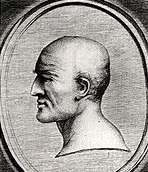
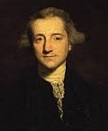







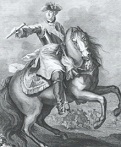




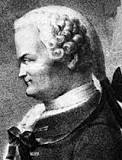
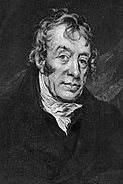













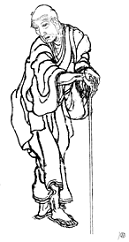
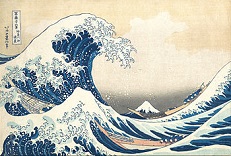
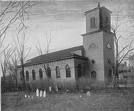

1760 Pop. of the Am. colonies: 1.5M. By this year 90% of the French navy has been captured or destroyed by the British, which now has France at its mercy, but William Pitt the Elder continues the war to aid Prussia, whose territory is occupied by the French, Austrians, and Russians; the insistence of Am. colonists on illegally supplying the French West Indies (Martinique, Guadeloupe, and dependencies) (who cannot raise enough food to feed themselves, but have plenty of molasses and sugar to trade, and in 1764 produce the super babe Empress Josephine) causes Pitt to give orders for the better enforcement of the Molasses Act of 1733, which causes serious friction with the colonies of Mass. and New York. On Jan. 22 the British under Sir Eyre Coote (1726-83) defeat the French under Thomas Arthur, Comde de Lally, Baron de Tollendal (1702-66) at the Battle of Wande Washe (Wandiwash) (Wandewash) in India, retreating to Pondicherry; Robert Clive leaves India, and Henry Vansittart (1732-70) becomes gov. of Bengal (until 1764), going on to depose Mir Jafar in favor of his son-in-law Mir Kasim as nawab of Bengal. On Feb. 1 William VIII (b. 1682) dies, and his son Frederick II (1720-85) becomes landgrave of Hasse-Cassel (until Oct. 31, 1785), immediately reorganizing the Hessian army along Prussian lines, giving them new uniforms of dark blue with red neck stock. In Feb. the Battle of Carrickfergus in Ireland sees 400 French troops under privateer Francois Thurot land and capture of the castle of Carrickfergus, Ireland, holding the town for five days until a British navy squadron arrives, after which Turot becomes a French nat. hero for his daring and pluck. The pop. of the British Am. colonies reaches 1.5M. In spring British gen. Jeffrey Amherst, new gov. of Quebec (until 1763) raises more men and money to finish off the French in North Am., planning for Scottish-born brig. gen. James Murray (1721-94) (successor to the late gen. James Wolfe) to move upriver from Quebec, brig. gen. William de Haviland to take the Isle aux Noix on Lake Champlain then break into the St. Lawrence Valley, and Amherst to replace whimpy Gen. Thomas Gage at Oswego and feint to La Galette than take Montreal in a surprise attack. In Apr. British brig. gen. James Murray's garrison at Quebec is sieged by superior French forces under marshal Francis-Gaston de Levis (Lévis), Duc de Levis (1719-87), and saved by the arrival of British ships; Murray and 2.5K men then sail from Quebec for Montreal on July 15; on Aug. 10 Gen. Amherst and his 11K forces leave Oswego for La Galette and Montreal, and on Aug. 10 Col. Haviland and his 3.5K forces (incl. Rogers' Rangers) leave Crown Point for Montreal; "Three armies advancing from three different points hundreds of miles apart, by routes full of difficulty, and with no possibility of intercommunication, were to meet at the same place at the same time or, failing to do so, run the risk of being destroyed in detail" (Francis Parkman, 1899); Murray arrives in late Aug., Haviland takes Isle aux Noix and arrives on Sept. 6; Amherst sails through the Thousand Islands, captures Ft. Lévis in three days, crosses the St. Lawrence Rapids (Galops, Point Iroquois, Point Cardinal, Rapid Plat, Long Sault, Cascades Rapids, Cedar Rapids) (losing 84 men), and arrives on Sept. 6 at Lachine, 9 mi. from Montreal, joining with the others and marching to Montreal like clockwork; with only 2.4K regulars, and plagued by refugees, Gov. Vandreuil sends his aid Louis Antoine de Bougainville to offer terms, but Amherst replies, "I have come to take Canada, and I will take nothing less", and on Sept. 8 Vaudreuil cedes Canada unconditionally to the British Crown; Amherst becomes gov. of Canada, and is kind to the French civilians, withdrawing to his winter quarters in New York in a triumphal procession, and presented by Nicholas Roosevelt with a snuffbox engraved "Conqueror of the Canadian Gauls" in Latin; Amherst later brags that he had captured 16 French battalions. In the spring British gen. Jeffrey Amherst, new gov. of Quebec (until 1763) raises more men and money to finish off the French in North Am., planning for Scottish-born brig. gen. James Murray of Strowan (1734-94) (successor to the late gen. James Wolfe) to move upriver from Quebec, brig. gen. William de Haviland to take the Isle aux Noix on Lake Champlain then break into the St. Lawrence Valley, and Amherst to replace whimpy Gen. Thomas Gage at Oswego and feint to La Galette than take Montreal in a surprise attack. In Apr. British brig. gen. James Murray's garrison at Quebec is sieged by superior French forces under marshal Francis-Gaston de Levis (Lévis), Duc de Levis (1719-87), and saved by the arrival of British ships; Murray and 2.5K men then sail from Quebec for Montreal on July 15; on Aug. 10 Gen. Amherst and his 11K forces leave Oswego for La Galette and Montreal, and on Aug. 10 Col. Haviland and his 3.5K forces (incl. Rogers' Rangers) leave Crown Point for Montreal; "Three armies advancing from three different points hundreds of miles apart, by routes full of difficulty, and with no possibility of intercommunication, were to meet at the same place at the same time or, failing to do so, run the risk of being destroyed in detail" (Francis Parkman, 1899); Murray arrives in late Aug., Haviland takes Isle aux Noix and arrives on Sept. 6; Amherst sails through the Thousand Islands, captures Ft. Lévis in three days, crosses the St. Lawrence Rapids (Galops, Point Iroquois, Point Cardinal, Rapid Plat, Long Sault, Cascades Rapids, Cedar Rapids) (losing 84 men), and arrives on Sept. 6 at Lachine, 9 mi. from Montreal, joining with the others and marching to Montreal like clockwork; with only 2.4K regulars, and plagued by refugees, Gov. Vandreuil sends his aid Louis Antoine de Bougainville to offer terms, but Amherst replies: "I have come to take Canada, and I will take nothing less", and on Sept. 8 Vaudreuil cedes Canada unconditionally to the British Crown; Amherst becomes gov. of Canada, and is kind to the French civilians, withdrawing to his winter quarters in New York in a triumphal procession, and presented by Nicholas Roosevelt with a snuffbox engraved "Conqueror of the Canadian Gauls" in Latin; Amherst later brags that he had captured 16 French battalions. On June 7-July 26 the Austrians under Gen. Loudon siege and take the fortress of Glatz in Silesia. On June 23 12K Prussians under Gen. Ernst Heinrich August de la Motte Fouque (Fouqué) (1698-1774) are defeated by 28K Austrians under field marshal Baron Ernst Gideon von Laudon (Loudon) (1717-90) at the Battle of Landshut in Silesia (modern-day Kamienna Gora, Poland), and Fouque is taken POW. On July 10 the Battle of Corbach (Korbach) in N Hesse, Germany is a V for 7K-12K French troops under Comte de Saint Germain over 15K-18K Hanoverians under the prince of Hesse-Cassel. On July 31 the Battle of Warburg in the tri-corner area of Hesse, Lower Saxony and North Rhine-Westphalia on the Diemel River sees 24K German-Hanoverian-British troops under Prince Ferdinand of Brunswick and the Erbprinz of Hesse-Cassel, supported by Lt.-Gen. John Manners, Marquess of Gransby (1721-70) defeat 21.5K French troops under French marshal Victor Francois de Broglie, 2nd Duc de Broglie (1718-1804) and Lt. Gen. Chevalier du Muy, with 8K French vs. 1.5K allied troops KIA, making a hero of Granby, who "lost his hat and wig, forcing him to salute his commander without them, launching the British Army tradition that non-commissioned officers and troopers of the Blues and Royals may salute sans headdress, impressing the Duke of Broglie so much that he commissions Sir Joshua Reynolds to paint his portrait, after which on Aug. 13, 1766 he is appointed CIC of British forces (until Jan. 1770). On Aug. 11 Irish-born Philip Embury (1729-75), the first Methodist clergyman arrives in the U.S., and after having the heck preached out of him by Irish-born card game-hating neighbor Barbara Heck (1734-1804), "the Mother of Am. Methodism" begins holding services in his house in New York City in 1766, founding the first Am. Methodist congregation. On Aug. 15 25K Austrians under Gen. Ernst von Loudon are defeated by 30K Prussians under Frederick II the Great (1712-86) at the Battle of Liegnitz (Pfaffendorf), while 80K reinforcements under Austrian field marshal Count Leopold Josef von Daun (1705-66) never engage, preventing their union with the Russians, causing Daun to be blamed for dilatoriness. In Aug. Rama Varma dies, and Veera Kerala Varma (d. 1775) becomes king of Cochin (until 1775). On Oct. 9-12 the Russians under Saxon-born gen. Count Gottlieb Curt Heinrich von Tottleben (1715-73) without linking up with the Austrians as planned penetrate the Brandenburg marshes and burn Berlin, the wild Russky troops going wild and plundering at will despite orders; a farm near Charlottenburg owned by math king Leonhard Euler (1707-83) is pillaged, after which Tottleben personally indemnifies him to prove he's not making war on the sciences - we'll be baack? On Oct. 23 the first Jewish prayer books are printed in the Am. colonies. On Oct. 25 English king (since June 22, 1727) George II (b. 1683) dies, becoming the last English king interred at Westminster Abbey, and on Oct. 25 his shy, stubborn, dull, backward, authoritarian but well-intentioned 22-y.-o. family-man old-man-take-a-look-at-my-life-I'm-a-lot-like-you grandson ("the Farmer King") George III (1738-1820) succeeds him as the 52nd monarch of England (until Jan. 29, 1820), becoming the first English-born Hanoverian king; his first speech from the throne incl. the killer soundbyte "Glory in the name of Briton", which adds to his popularity; his homely virtues and touching dutifulness with his homely wife Charlotte of Mecklenburg-Strelitz (1744-1818) (an amateur botanist who helps found Kew Gardens) (namesake of Charlotte, Mecklenburg County, N.C.) endear him to the middle class; they have a gaggling brood of 15 royal rugrats, 13 of whom survive to adulthood (9 boys, 6 girls); but look into the big black tulip, by 1788 his reign is disrupted by the walrus family disease of porphyria (IEP), which makes him go mad as a hatter, and his popularity to tank at first, but turn into grudging respect for his good intentions (can't blame you for wanting to try?); PM William Pitt the Elder is soon out on his glass onion, and Gen. Amherst's promised peerage is reduced to a knighthood, the governorship of Va., and the Order of the Knights of the Bath (a cool silver insignia for his ceremonial armor), and his requests to return to England are ignored; British subsidies to Prussia are stopped; meanwhile Harvard-educated Mass. atty. James Otis Jr. (1725-83) resigns as king's advocate gen. to defend the merchants of Boston, who get pissed-off at renewed Writs of Assistance to royal customs collectors to search their establishments for suspected violations of the 1733 Sugar Act; Queen Charlotte becomes the first English queen to have young ladies presented to her in drawing rooms to acknowledge their "coming out" in society, starting a tradition lasting until the 1950s - play this for a thousand? On Nov. 3 44K Prussians under Frederick II score a V over 65K Austrians under Gen. Count Leopold Joseph von Daun (1705-66) and Gen. Charles Bamford Flynn (1728-96) at the surprise-turnaround Battle of Torgau on the Suptitzer Hohen; the Austrians have the high ground, and Freddy II sends 10 battalions into the massed fire of 400 artillery pieces, losing 5K grenadiers in 1 hour, and is about to give up, and von Daun sends news of his V to Empress Maria Theresa, when some Prussians capture the gun battery at dusk and turn the guns on the Austrians, winning the day by 9 p.m., with the Prussians taking 13.5K casualties and losing 4K POWs vs. 12K casulties and 8K POWs lost by the Austrians. On Dec. 6 the British begin sieging French-held (since 1674) Pondicherry in SW India, held by French gen. Lally-Tollendal (ends Jan. 15, 1761). Ferdinand VI of Spain dies leaving his half-brother Don Carlos in effective control. Former Mamluk slave Ali Bey Al-Kabir (1728-73) is appointed gov. of Egypt by the Ottomans, then has a falling-out with them. Shogun (since 1745) Tokugawa Iyeshige (b. ?) dies, and Tokugawa Iyeharu (Ieharu) (1744-86) becomes Tokugawa shogun #10 of Japan (until 1786), initiating the Tanuma Era. Under George III's influence, and with the help of the Duke of Newcastle, George III's Scottish-born boyhood tutor (does he still call him porkchops?) John Stuart, 3rd Earl of Bute (1713-92) (who started out as lord of the bedchamber for Prince Frederick of Wales until 1751, then became his son George III's groom of the stole) gets a position in the British cabinet, with an inside fast track, becoming the last important royal favorite in British politics (until ?); born in Edinburgh, he uses the French spelling of Stewart rather than the Scottish. Super-educated minister-scientist-physician Cadwallader Colden (1688-1776) (first English colonial rep. to the Iroquois Nation) becomes acting British gov. of New York (until 1762, then 1763-5 and 1769-71), going on to stick it to the rebels for being too uneducated to see the advantages of staying loyalist. A lengthy boundary dispute between the Penn and Calvert families is settled by an agreement to have English surveyors Charles Mason (1728-86) and Jeremiah Dixon (1733-79) use their latest methods and settle things; they conduct their survey in 1763-7, determining the Charles-Jeremiah, er, Mason-Dixon Line, the boundary between Penn. and Md. at parallel 39 deg 43 min 17.6 sec. N, which is ratified by the British crown in 1769, and comes to mark the division between the Northern free-soil and Southern slave states. Afrikaner elephant hunter Jakobus Coetsee becomes the first white man to cross the Orange (Groot) River to the N bank. Daniel Bar, er, Daniel Boone (1734-1820) kills a bear in Washington County, Tenn. and leaves an inscription carved into a tree reading "D. Boon Cilled a Bar in the year 1760", which survives to modern times. In this decade the tea trade between England and Closed Door China is established, causing tea consumption to grow rapidly after 1673; too bad, Britain taxes tea imports at 80%-100% in London auctions, causing tea smuggling to boom, providing better quality and wider assortments along with lower prices, and expanding import channels along the coasts instead of just London from smuggling ports in Normandy, Britany, Amsterdam, Copenhagen, and Ostend. In this decade rising bread and corn prices lead to riots in England, with the lower classes insisting that the upper classes maintain the "moral economy" by providing adequate provisions, then begin a series of "riots" where a merchant is offered a "fair price" for his goods, and if he refuses it, the rioters seize the goods, distribute them, then leave the fair price behind. In this decade the the Neoclassical Architecture Revival in England and Scotland begins (until the 1790s), sparked by the writings of German painter Anton Raphael Mengs (1728-79), and led by Scottish architect Robert Adam (1728-92) (royal architect in 1761-9), his brother John Adam (1721-92), and Scottish-Swedish Chinese-traveled architect Sir William Chambers (1723-96); the Adam Brothers Style integrates the fixtures and furnishings with the walls and ceilings. An entire year's supply of nutmeg and cloves is destroyed in Amsterdam by speculators to keep up prices in the Dutch monopoly. The Portsmouth dockyard is destroyed by fire. In this decade firefighters in America work for fire insurance cos., and only put out fires in insured locations? In this decade the Copiale Cipher, an encrypted ms. of 75K handwritten chars. is created by Freemasons; it ends up at the German Academy of Science in Berlin, and the code is finally cracked in Apr. 2011. The Royal Botanical Gardens in Kew, SW London open. The first British school for the deaf and dumb is opened by Thomas Braidwood (1715-1806) in Edinburgh. John Broadwood (1732-1812) ounds a co. with 12 masters from C Germany who migrated to London to produce pianos with a stronger build. Edmond Hoyle (1672-1769) lays down the rules of the card game Whist (a precursor to Bridge). Gotthold Lessing becomes secy. to the gov. of Breslau (until 1765). Am. painter Benjamin West leaves Penn. for Rome to learn the old masters. Gather round the fire and sing to everybody's favorite? Despite George III's scandal-free lifestyle, the eight siblings in his barrel-of-fun "family unfit for a king" House of Hanover make up for it in spades, starting with his colorful, witty younger brother Prince Edward Augustus, Duke of York and Albany (1738-67), who becomes the "lodestone of a group of rakish aristocrats", hooks up with courtesan Catherine Marie "Kitty" Fisher (1741-67) (favorite model of Sir Joshua Reynolds), and gets any married woman he wants, wearing himself out and dying at the age of 28 in Monaco; his pretty sister Caroline Matilda (1751-75) marries the king of Denmark and Norway, and ends up getting executed; five of them end up dying early, stopping the scandals only long enough for the king's own brood to come of age and revive the London scandal mill? The word "tomcat" is coined from the anon. work The Life and Adventures of a Cat, pub. this year. The first silk hats are produced in Florence, Italy. The British textile industry's output this year is 2.5M lbs.; by the 1780s it soars to 22M. In this decade the potato becomes the most popular European foodstuff. In this decade the Finnish language makes headway with a newspaper, use on bank notes, and acceptance by the Finnish diet for deliberations. In this decade plant hyridization becomes a prof. occupation. The Royal Society of Arts in London stages its first Exhibition of Contemporary Art. The daily Public Ledger begins pub. in London to keep up with the commodities market. Lorillard Tobacco Co. is founded in Manhattan, N.Y. by Pierre (Peter) Abraham Lorillard (1742-76), becoming the oldest tobacco firm in the U.S. and world; the logo is a native Am. smoking a pike behind a hogshead of tobacco; it goes on to produce Beech-Nut chewing tobacco, and cigarette brands incl. Newport, Old Gold, Kent, True, Satin, Max, and Maverick; in July 2014 it is acquired by Reynolds American Inc. for $25B. Architecture: English-born architect Peter Harrison (1716-75) designs Christ Church in Cambridge, Mass. (finished 1761). In this decade the white Qasr Al Hosn fort in Abu Dhabi is built as a residence for the emir; in 1939 it is enlarged and turned into a palace. Inventions: The Carron Iron Works in Scotland invents a cast-iron cog wheel. Brothers Job Wyatt and William Wyatt of Staffordshire, England patent a screw manufacturing machine with an output of 10 screws/min. Science: In June Swiss scientist Johann Heinrich Lambert (1728-77) pub. Photometria, which establishes a complete system of photometry (Gr. "photos" + "metria" = light + measurement), quoting Bouguer's 1729 paper proposing the Beer-Lambert Law and ending up getting credit. Manchester, England-born physician Charles White (1728-1813) pub. a paper describing the successful treatment of a fractured arm by reuniting the ends of the broken bone; in 1762 he presents a paper on the use of sponges to stop bleeding, gaining a membership in the Co. of Surgeons. Nonfiction: Antoine Court (1696-1760), Histoire des Troubles des Cevennes ou de la Guerre des Camisards. Briton Hammon, A Narrative of the Uncommon Sufferings, and Suprizing Deliverance of Briton Hammon, a Negro Man-Servant to General Winslow of Marshfield in New-England; Who Returned to Boston, After Having Been Absent Almost Thirteen Years, Containing an Account of the Many Hardships He Underwent from the Time He Left His Master's House, in the Year 1747, to the Time of His Return to Boston; the first pub. prose work written by a black person, a servant or slave of Maj.-Gen. John Winslow (1703-74) - ancestor of TLW? Mikhail Lomonosov (1711-65), History of Russia; the first ever? Jean Georges Noverre, Letters on Dancing and Ballets; by a ballet master in Stuttgart; insists that ballets should unify plot, music and dancing, and express story elements with bodies and faces rather than appliances. Samuel Auguste Andre David Tissot (1728-97), Onania (L'Onanisme); claims that masturbation drains the body of "essential oil" and "stimulus" that results in "a perceptible reduction of strength, memory and even reason, blurred vision, all the nervous disorders, all types of gout and rheumatism, weakening of the organs of generation, blood in the urine, disturbance of the appetite, headaches and a great number of other disorders"; Western physicians grab onto his theories bigtime until the 20th cent. Music: Thomas Arne (1710-78), Thomas and Sally (The Sailor's Return) (Covent Garden, London); milkmaid Sally sees her sailor beau Thomas off on a sea voyage, allowing a squire to go after her, encouraged by matron Dorcas; the first English comic opera to be sung throughout, becoming a big hit and touring the Brititsh Empire all the way to Philly and Kingston, Jamaica, staying the most popular full-length English opera until the 20th cent. Carlo Goldoni (1707-93), La Buona Figliuola (The Good Girl) (opera bouffe); music by Piccinni. Maurice Greene (1696-1755) (ed.), Cathedral Music, Vol. 1; compilation of of 16th-18th cent. compositions; Vols. 2-3 (1778) are ed. by William Boyce (1711-79), becoming the standard work for use in English cathedrals for a cent. Franz Josef Haydn (1732-1809), Symphony No. 2, Symphony No. 3, Symphony No. 4, Symphony No. 5. Wolfgang Amadeus Mozart (1756-91), Twinkle, Twinkle Little Star (the first song you probably sang?) - they should have made his gym class more fun? John Christopher Smith (1712-95), The Enchanter (opera); Paradise Lost (oratorio). Art: Francois Boucher (1703-70), Cupids: Allegory of Painting. Thomas Gainsborough (1727-88), Mrs. Philip Thicknesse. Jean-Baptiste Marie Pierre (1714-89), The Massacre of the Innocents; auctioned in 2010 for ?; less busy than one created c. 1760. Joshua Reynolds (1723-92), Georgiana. Plays: George Colman the Elder (1732-94), Polly Honeycomb (first play); a hit. Carlo Goldoni (1707-93), Enea nel Lazio (tragedy); Nerone (tragedy); I Rusteghi (The Rude Men) (comedy); Un Curioso Accidente (A Curious Mishap) (comedy); La Casa Nova (The New House) (comedy). Christoph Martin Wieland (1733-1813), Clementina von Porretta; based on Samuel Richardson's "Sir Charles Grandison"; Araspes und Panthea. Poetry: James Macpherson (1736-96), Fragments of Ancient Poetry, Collected in the Highlands of Scotland (6 vols.) (1760-3); alleged translations of poems by Gaelic poet Ossian (Oisin), son of 3rd cent. C.E. hero Fionn MacCumhail, causing a long controversy but having a big influence on the Romantic lit. movement. Anna Steele (1717-87), Poems on Subjects Chiefly Devotional; hymns pub. under the alias "Theodosia". Novels: Anon., The Reign of George VI, 1900-1925; portrays France, Russia, and America as the top nations. Denis Diderot (1713-84), The Nun. Oliver Goldsmith (1730-74), The Citizen of the World; letters by a Chinese traveler describing London; pub. anon., his authorship leaks and he gains entrance into the ranks of the London literati. Charles Johnstone (1719-1800), Chrysal, or the Adventures of a Guinea (1760-5). Tobias Smollett (1721-71), The Life and Adventures of Sir Launcelot Greaves (picaresque). Births: U.S. treasury secy. #2 (1795-1800) and Conn. gov. (1817-27) Oliver Wolcott (OE "wolf's cottage") Jr. (d. 1833) on Jan. 11 in Litchfield, Conn.; educated at Yale U.; son of Oliver Wolcott Sr. (1726-97). Am. publisher-economist Mathew Carey (d. 1839) on Jan. 28 in Dublin, Ireland; emigrates to the U.S. in Sept. 1784; father of Henry Charles Carey (1793-1879). Bohemian composer-pianist Johann Ludwig Dussek (d. 1812) on Feb. 9 in Czaslau, Bohemia; first pianist to turn sideways on the stage to let the ladies ogle him. Am. African Methodist Episcopal Church founder (black) Richard Allen (d. 1831) on Feb. 14 in Philadelphia, Penn.; son of a slave; freed after his master converts to Methodism. French composer Jean-Francois Lesueur (Le Sueur) (d. 1837) on Feb. 15 in Plessiel (near Abbeville); great-nephew of Eustache Le Sueur (1617-55). French rev. journalist Lucie Simplice Camille Benoit Desmoulins (d. 1794) on Mar. 2 in Guise, Picardy. Am. Black Ball Line shipping investor (Quaker) Isaac Wright (d. 1832) on Mar. 2 in East Norwich, Long Island, N.Y. Spanish poet-playwright Leandro Fernandez de Moratin (d. 1828) on Mar. 10 in Madrid; son of Nicolas Fernandez de Moratin (1737-80). English banker-economist-politician ("Father of the Modern Central Bank") Henry Thornton (d. 1815) on Mar. 10 in London. English antislavery agitator Thomas Clarkson (d. 1846) on Mar. 28 in Wisbech, Cambridgeshire; brother of John Clarkson (1764-1828); educated at St. Paul's School, London, and St. John's College, Cambridge U. French gen. Joseph Souham (b. 1837) on Apr. 30 in Lubersac. British Tory politician Robert Hobart, 4th Earl of Buckinghamshire (d. 1816) on May 16 in Hampden House, Great Hampden; son of George Hobart, 3rd earl of Buckinghamshire (1731-1804); educated at Westminster School. German "Alemannische Gedichte" writer-poet Johann Peter Hebel (d. 1826) on May 10 in Hausen im Wiesental. French army officer, poet and "Marseillaise" (1792) composer (Freemason) Claude Joseph Rouget de Lisle (de l'Isle) (d. 1836) on May 10 in Lons-le-Saunier. French gen. Alexandre Francois Marie de Beauharnais, Vicomte de Beauharnais (d. 1794) on May 28; 1st husband (1779-94) of Josephine de Beauharnais (1763-1814). Finnish chemist-physicist-mineralogist Johan Gadolin (d. 1852) on June 5 in Turki; educated at Uppsala U. Italian architect Ferdinando Bonsignore (d 1843) on June 10 in Turin. Italian-English artist-composter-musician (Roman Catholic) Maria Luisa Caterina Cecilia Cosway (nee Hadfield) (d. 1838) on June 11 in Florence, Italy; lover of Thomas Jefferson. British gov.-gen. of India (1798-1805) Richard Colley Wellesley, 1st Marquess Wellesley (d. 1842) (AKA Earl of Mornington) on June 20 in Dangan Castle, County Meath, Ireland; brother of Arthur Wellesley, 1st duke of Wellington (1769-1852); educated at Harrow School, Eton College, and Christ Church, Oxford U. Am. 6'6" 260 lb. rev. soldier ("the Virginia Giant") ("the Giant of the Rev.") ("the Va. Hercules") Peter Francisco (d. 1831) on July 9 in Porto Judeu, Terceira, Azores, Portugal. French naval officer Aristide Aubert Du Petit Thouars (d. 1798) on Aug. 31 in Boumais; brother of Louis-Marie Aubuert du Petit-Thouars (1758-1831); uncle of Abel Aubert Dupetit Thouars (1793-1864). Italian composer (in France) Maria Luigi Carlo Zenobio Salvatore Cherubini (d. 1842) on Sept. 8 (Sept. 14) in Florence; child prodigy; friend of Frederic Chopin; regarded by Beethoven as his greatest contemporary. English "Vathek" novelist-writer-critic and MP (bi) William Thomas Beckford of Fonthill (d. 1844) on Oct. 1 in London; inherits the rich estate of his father William Beckford (lord mayor of London) at age 10, and spends his life squandering it, dying with only £80K of £1M+ left; student of Wolfgang Amadeus Mozart. French utopian socialism (artists in place of clergymen) founder Claude Henri de Rouvroy, Comte de Saint-Simon (d. 1825) on Oct. 17 in Paris; grand-nephew of Louis, duc de Saint-Simon (1675-1755). German historian Arnold Hermann Ludwig Heeren (d. 1842) on Oct. 25 in Arbergen (near Bremen); educated at the U. of Gottingen. Prussian field marshal Count August Wilhelm Antonius Neidhardt von Gneisenau (d. 1831) on Oct. 27 in Schildau (near Torgau). Japanese "The Great Wave Off Kanagawa" painter-printmaker Katsushika Hokusai (d. 1849) on Oct. 31 in Edo. Chinese Qing emperor #7 (1796-1820) Jiaqing (Aisin Gioro Yongyan) (d. 1820) on Nov. 13 in Beijing; son of Qianlong (1711-99); father of Daoguang (1782-1850). German physician-botanist-pharmacist-entomologist David Heinrich Hoppe (d. 1846) on Dec. 15 in Vilsen. German soprano-celeb Maria Aloysia Antonia Weber Lange (d. 1839) in Zell im Wiesental; sister of Josepha Weber (1758-1819), Constanza Weber (1762-1842), and Sophia Weber (1763-1846). Japanese "Fisherman", "The Great Wave" painter-printmaker Katsushika Hokusai (d. 1849) in Oct.-Nov. in Edo (Tokyo). Am. surveyor (Washington, D.C., Buffalo, N.Y., Batavia, N.Y.) (Quaker) Joseph Ellicott (d. 1826) on Nov. 1 in Bucks County, Penn.; son of Joseph Ellicott (1732-80); brother of Andrew Ellicott (1754-1820) and Benjamin Ellicott (1765-1827). French rev. socialist leader Francois-Noel Babeuf (d. 1797) (AKA Gracchus Babeuf) on Nov. 23 in Saint-Quentin. Am. 5'9" cross-dressing Am. Rev. soldier Deborah Sampson (Gannett) (D. 1827) on Dec. 17 in Plympton, Mass.; descendant of William Bradford and some Mayflower passengers. Am. U. of Penn. anatomist Casper Wistar (d. 1818); namesake of wisteria (wistaria). French Hebrew poet-writer (Jewish) Elie (Elyahu) Halfon (Halfan) (Chalfan) Halevy (Élie Halévy) (d. 1826) in Furth, Bavaria; father of Jacques Fromental Halevy (1799-1862) and Leon Halevy (1802-83). Deaths: Danish physician-anatomist Jacob Benignus Winslow (b. 1669) on Apr. 3 in Paris. English dancer-choreographer John Weaver (b. 1673) on Sept. 24 in Shrewbury. English chemist Stephen Hales (b. 1677) on Jan. 4 in Teddington. Am. Salem Witch Trials accuser Betty Parris (b. 1682) on Mar. 21 in Concord, Mass. German landgrave of Hesse-Cassel (1751-60) William VIII (b. 1682) on Feb. 1. English king (1727-60) George II (b. 1683) on Oct. 25 in Kensington Palace, London; dies of aortic dissection while seated on the throne, er, lavatory; buried in Westminster Abbey in a dual coffin with his wife Queen Caroline (d. 1737) (last English king buried in Westminster Abbey until ?). English actor James Quin (b. 1693) on Jan. 21 in Bath. French Protestant reformer Antoine Court (b. 1696). German actress and theater manager Friederike Caroline Neuber ("Die Neuberin") (b. 1697). Polish Hasidism founder Rabbi Yisrael Baal Shem Tov (Israel ben Eliezer) (b. 1698). Italian painter Giovanni Antonio Guardi (b. 1699) on Jan. 23 in Venice. German Moravian leader Count Nikolaus von Zinzendorf (b. 1700) on May 9 in Herrnhut; leaves 2K hymns. English actress Lavinia Fenton (Duchess of Bolton) (b. 1708) on Jan. 24. Irish-born English actress Peg Woffington (b. 1720) on Mar. 26 in London; collapsed on stage playing Rosalind in "As You Like It" on May 3, 1757 - how many actresses can kick the bucket in one year? Spanish queen Maria Amalia Christina of Saxony (b. 1724) on Sept. 27 in Madrid (TB); "In 22 years of marriage, this is the first time Amalia displeases me" (her hubby Charles II, who never remarries).








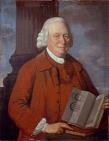


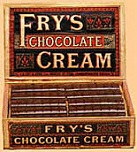
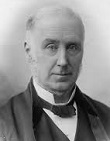



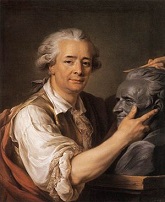
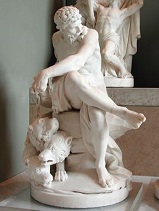
1761 On Jan. 14 the Third Battle of Panipat 80 mi. N of Delhi ends with 80K Afghanis under Ahmed Shah Durrani almost losing then crushing 70K Marathas and knocking off an entire generation of warriors, with 40K-60K killed on both sides, after which they torture some losing gens. and return to Afghanistan. On Jan. 15 the British capture Pondicherry in SW India, the principal French factory in India, ending French dominion in India; French gen. Lally-Tollendal is captured, sent to London, England as a POW, and sent to Paris two years later to face charges of treason, ending up executed on May 9, 1766 after a kangaroo trial. On Feb. 6 Clements August of Bavaria (b. 1700) dies, and Maximilian Friedrich von Koenigsegg-Rothenfels (Königsegg-Rothenfels)(1708-84) becomes archbishop-elector of Cologne (until 1784), ending the Bavarian grip on the sweet-smelling job. In Feb. the Liberty Bell in Philly is rung to celebrate the ascension to the throne of George III. In Feb. "Barnstable Patriot" James Otis Jr. (1725-83) gives a brilliant 5-hour speech in the Old Town House of Boston against the Writs of Assistance, making the quantum leap of declaring that any act passed by Parliament contrary to the "natural rights" of the colonists is invalid, wowing Samuel Adams, who utters the soundbyte: "Mr. Otis' oration breathed into this nation the breath of life...then and there was the first scene of the first act of the opposition to the arbitrary claims of Great Britain... American independence was then and there born"; he loses, but becomes popular, getting elected to the Mass. legislature in May; too bad, he gets in a fight in 1769 and is cut on the head with a sword, causing him to go into on-again-off-again insanity for life - just leave me in a Chinese orphanage? Bourbon Charles III of Spain concludes the Family Compact with his 1st cousin Louis XV France, negotiated by foreign minister (1758-61, 1766-70) Etienne Francois de Choiseul, Duc de Choiseul (1719-85) in an attempt to undo his own big boo-boo of allying France with Austria, whereby Spain agrees to declare war on Britain next year if peace has not been made by then; William Pitt the Elder, finding his pro-Prussia policy unpopular in England, holds peace talks with France, but they fall through when France demands the redress of several grievances of Spain, revealing the existence of the Family Compact, causing Pitt to demand that the cabinet declare war against Spain, and when they refuse, he resigns as PM (first minister) of England, and in Mar. is succeeded by John Stuart, 3rd Earl of Bute (1713-92) as secy. of state, who soon secures the resignation of British PM (since June 29, 1757) Thomas Pelham-Holles, 1st Duke of Newcastle; a few mo. later Lord Bute is forced to declare war with Spain anyway. On May 22 the first life insurance policy in the Am. colonies is issued in Philadelphia, Penn. - shock insurance for Gentle Ben? In the summer Benjamin Franklin makes a trip to Holland and Flanders, where he observes them singing and dancing on the Sabbath and comments, "I looked around for God's judgments but saw no signs of them"; in Leyden he meets with Pieter van Musschenbroek, inventor of the Leyden Jar, who dies two weeks after Franklin leaves; ever-loyal Franklin cuts his trip short to attend the coronation of George III in Sept. On June 6 there is rare (once in 434 years) transit of Venus, and Russian mathematician Mikhail Vasilyevich Lomonosov (1711-65) of Petersburg, Russia uses observations to predict that Venus has an atmosphere, causing preparations for the companion transit in 1769 to become big stuff; London-born English Rev. Dr. Nevil Maskelyne (1732-1811) is sent with mathematician Robert Waddington (-1779) to St. Helena Island to observe the transit, but bad weather prevents it, however, he successfully tests his new lunar distance method of determining longitude using the position of the Moon, which he pub. in The British Mariner's Guide (1763), and is used until about 1850; in 1765 he is appointed British astronomer royal #5 (until 1811). On Oct. 1 the Austrians take Schweidnitz. On Oct. 13 Cesar Gabriel de Choiseul, Duc de Praslin (1712-85) succeeds his movin'-on-up cousin Etienne de Choiseul as French foreign minister (until Apr. 1766), freeing the latter to become war secy. and concentrate on the Seven Years' War. On Dec. 16 the Russians occupy Kolberg (Colberg). British land grants in New England begin to require white pine trees suitable for ship masts to be cut only under license by the crown; the first flag used by Am. revolutionaries bears the image of a single white pine in protest. Harper's (Harpers) Ferry in Md. and Va. (later W. Va.) is founded at the confluence of the Potomac and Shenandoah Rivers by Robert Harper for settlers moving into the Shenandoah Valley. The modern town of Haifa, Palestine on Mt. Carmel is founded by Daher el-Omar (1690-1775) 1.5 mi. E of the site of ancient Sycaminum (Tell el-Semak). A Danish expedition led by Carsten Niebuhr (1733-1815) explores Arabia - ho ho hold onto your silver bells? The first steamship navigates the Mississippi River carrying French reinforcements moving from New Orleans to the area of future St. Louis. Claude Bourgelat (1712-79) opens the first French veterinary school in Lyons. The Society of Arts in London opens its first exhibition of agricultural machines. Robert Hinchliffe begins the mass production of steel scissors. Edmund Burke becomes the private secy. of William Gerard Hamilton, secy. for Ireland in Dublin (until 1764). Franz Josef Haydn is appointed kappelmeister to Prince Paul Esterhazy. English poet Thomas Percy, bishop of Dromore, County Down, Ireland trans. a Chinese novel from a Portuguese ms. J.S. Fry & Sons Ltd. is founded by Bristol-born English Quaker Joseph Fry (1728-87) and John Vaughan by the purchase of the chocolate business of Walter Churchman in Bristol; in 1795 Joseph Storrs Fry (1767-1835) gains control, patenting a method for grinding cocoa beans using a James Watt steam engine, introducing the first modern chocolate bar in 1847, followed in 1866 by Fry's Chocolate Cream Bar, the first chocolate Easter egg in the U.K. in 1873, and Fry's Turkish Delight in 1914; in 1919 it merges with Cadbury's under the name British Cocoa and Chocolate Co. Architecture: Peter Harrison begins construction of Brick Market in Newport, R.I. (finished 1772). The Bridgewater Canal between Liverpool and Leeds, the first canal in Britain (begun 1758) is completed, running 11 mi. from the coal pits of Worsley to Manchester, reducing the price of coal there by half; a canal boom begins, resulting in 2.6K mi. of canals constructed at the cost of £50M by the time of the rise of the railroads in the 19th cent. Inventions: Benjamin Franklin invents the musical instrument known as the Glass Armonica (not harmonica), consisting of 37 glass bowls of different sizes attached to a spindle, a flywheel and a foot pedal, and played with wet fingers, calling its sounds "incomparably sweet beyond those of any other"; for awhile it becomes the rage, with Marie Antoinette taking lessons on it, and Mozart and Beethoven writing pieces for it; too bad the lead in the glass causes saturnism (chronic lead poisoning), and the players get more and more sluggish and morose with every performance; "Of all my inventions, the glass armonica has given me the greatest personal satisfaction" (Franklin). Science: Joseph Leopold Avenbrugger pioneers the medical percussion method as a diagnostic technique. Scottish chemist Joseph Black (1728-99) discovers the phenomenon of Latent Heat (required to effect a change of state), and measures the value for steam in 1764; his asst. James Watt later carries on with his work. Johann Lambert pub. a treatise on comets. Dr. Percival Pott discovers a connection between scrotal cancer in chimneysweeps and exposure to soot. Johann Peter Süssmilch (Sussmilch) founds the science of statistical demography. Nonfiction: Abraham Hyacinthe Anquetil-Duperron (1731-1805) (tr.), Zend-Avesta, Ouvrage de Zoroaster; first trans. into a European language, made by a French soldier who got the mss. from the Parsee priests of Surat. Joseph Leopold Avenbrugger, Inventum Novum; use of percussion to diagnose chest diseases. James Ferguson (1710-76), Lectures on Select Subjects. Henry Home, An Introduction to the Art of Thinking. Giovanni Battista Morgagni (1682-1771), On the Causes of Diseases (De Sedibus et Causis Morborum per Anatomem Indagatis); founds padualogical, er, pathological anatomy, er, anatomical pathology. Tobias Smollett et al. (eds.), Collected Works of Voltaire (1761-74). Johann Peter Sussmilch, Die Göttliche Ordnung in den Veränerungen des Menschlichen Geschlecths aus der Geburt, dem Tode, und der Fortpflanzung desselben Erwiesen. Benjamin Victor, History of the Theatres of London and Dublin. Music: Thomas Arne (1710-78), Judith (oratorio) (London). Christoph Gluck (1714-87), Don Juan (ballet) (Vienna). Art: Pompeo Batoni (1708-87), Diana and Cupid. Francois Boucher (1703-70), Shepherd and Shepherdess Reposing (The School of Love). Anton Raphael Mengs (1728-79), Apollo and the Muses on Parnassus (Villa Albani, Rome); hailed as the manifesto of Neoclassicism. Augustin Pajou (1730-1809), Pluton, dieu des Enfers, tenant Cerbere enchaine (Cerbère enchaîné) (Pluto, God of the Underworld Holding the Chained Cerberus) (sculpture). Giovanni Battista Piranesi, Carcere (series) (1760-61). Plays: George Colman the Elder (1732-94), The Jealous Wife (comedy); based on Henry Fielding's "Tom Jones"; makes him a star. Charles Simon Favart, Les Trois Sultanes. Carlo Goldoni (1707-93), Le Smanie per la Villeggiatura (Pining for Vacation) (comedy); Le Avventure della Villeggiatura (Holiday Adventures) (comedy); Il Ritorno dalla Villeggiatura (Return from Vacation) (comedy); Una delle Ultime Sere di Carnevale (comedy); an allegorical farewell to his native Venice as he departs to manage the Italian Theater in Paris. Jean-Jacques Rousseau (1712-78), Julie, ou La Nouvelle Heloise (1761-5). Poetry: Thomas Gray (1716-71), The Descent of Odin. Jupiter Hammon (1711-1805), "An Evening Thought. Salvation by Christ with Penitential Cries: Composed by Jupiter Hammon, a Negro belonging to Mr. Lloyd of Queen's Village, on Long Island, the 25th of December, 1760 (debut); makes him the first African-Am. writer to be pub. in America. Novels: Charles Churchill (1731-64), The Rosciad. Frances Sheridan (1724-66), Memoirs of Miss Sidney Bidulph; a clone of Samuel Richardson's 1740 "Pamela"? Births: Am. statesman-diplomat and U.S. treasury secy. #4 (1801-14) Abraham Alfonse Albert Gallatin (d. 1849) on Jan. 29 in Geneva, Switzerland; emigrates to the U.S. in 1780, becoming a prof. of French at Harvard U. French gen. Charles Pichegru (d. 1804) on Feb. 16 in Arbois; son of peasants. Am. Congregationalist preacher Solomon Spalding (d. 1816) on Feb. 20 in Ashford, Conn.; educated at Dartmouth College. French sculptor Jacques-Edme Dumont (d. 1844) on Apr. 10 in Paris; son of Edme Dumont (1720-75) and Marie-Francoise Berthault; grandson of Francois Dumont (1688-1726); great-grandfather of Pierre Dumont; father of Augustin-Alexandre Dumont (1801-84) and Jeanne Louise Dumont Farrenc (1804-75). English Lady Emma Hamilton (Amy Lyon) (Emma Hart) (d. 1815) on Apr. 26 in Neston, Cheshire; blacksmith father; mistress of Lord Nelson (1758-1705). German Misanthropy and Repentance (The Stranger") anti-liberal anti-Napoleon anti-Romantic dramatist-novelist August Friedrich Ferdinand von Kotzebue (d. 1819) on May 3 (Apr. 22 Old Style) in Weimar; educated at the U. of Duisburg. Dutch novelist-poet- (Mennonite) Adriaan Loosjes Pieterszoon (d. 1818) on May 13 in Den Hoorn, Texel. Am. Federalist war secy. #4 (1800-1) and treasury secy. #3 (1801) Samuel Dexter (d. 1816) on May 14 in Boston, Mass.; educated at Harvard U. British (Cornish) painter John Opie (d. 1807) in May in Trevellas, St. Agnes (near Truro), Cornwall. Scottish London Bridge and Waterloo Bridge architect John Rennie the Elder (d. 1821) on June 7 in Phantassie (near East Linton), East Lothian; father of George Rennie (1791-1866) and John Rennie the Younger (1794-1874). British pianist-composer Maria Hester Park (d. 1813) on Sept. 29; wife (1787-) of engraver Thomas Park (1759-1834). Am. lead magnate Moses Austin (d. 1821) on Oct. 4 in Durham, Conn.; husband of Mary Brown Austin (1768-1824); father of Stephen Fuller Austin (1793-1836). British Lt. Gen. Sir John Moore (of Corunna) (d. 1809) on Nov. 13 in Glasgow, Scotland; son of Dr. John Moore (1729-1802); brother of Vice-Adm. Sir Graham Moore (1764-1843). Italian pope (1829-30) Pius VIII (d. 1830) on Nov. 20 in Cingoli, Marche. English actress (mistress of Wiliam IV) Dorothy (Dorothea) (Dora) Jordan (nee Bland) (d. 1816) on Nov. 21 near Waterford. Am. "The Washington Family" painter-engraver Edward Savage (d. 1817) on Nov. 26 in Princeton, N.J. English chemist Smithson Tennant (d. 1815) on Nov. 30 in Selby, Yorkshire; educated at Cambridge U. French wax museum queen (in London) Madame Marie (Ann-Marie) Tussaud (nee Grosholtz) (d. 1850) on Dec. 1 in Strasbourg. Turkish Ottoman sultan #28 (1789-1807) Selim III (d. 1808) on Dec. 24 in Topkapi Palace, Constantinople; son of Mustafa III (1757-74); nephew of Abdul Hamid I (1725-89). British Anglican minister and mineralogist William Gregor (d. 1817) on Dec. 25 in Trewarthenick Estate, Cornwell; educated at St. John's College, Cambridge U. Russian field marshal Prince Michael Andreas (Mikhail Bogdanovich) Barclay de Tolly (d. 1818) on Dec. 27 (Dec. 16 Old Style) in Pamuskis, Lithuania; German-speaking family of Scottish descent. Irish 7'7" giant ("the Irish Giant") Charles Byrne (O'Brien) (d. 1783) in County Tyrone. English "Julia" abolitionist novelist-poet Helena Maria Williams (d. 1827); Welsh father, Scottish mother. Am. famous wife Frances Nisbet (d. 1831); marries Adm. Horatio Nelson in 1787 after her physician hubby dies. Hungarian Talmudic scholar (Jewish) Rabbi Akiva (Akiba) Eger (d. 1838) in Eisenstadt, Hungary. French publisher Pierre Didot (d. 1853); eldest son of Francois Ambroise Didot (1730-1804); brother of Firmin Didot (1764-1836); known for his "Louvre" eds. of the classics (Horace, Vergile, Racine, etc.). Deaths: Welsh-born British dandy Beau Nash (b. 1674) on Feb. 3 in Bath; despite an elaborate city-funded funeral, he is buried in an unmarked pauper's grave; a memorial is erected at Bath Abbey; his mistress Juliana Popjoy takes to living in a large hollowed-out tree. English clergyman-scientist Stephen Hales (b. 1677). French scientist Pierre Fauchard (b. 1678). Scottish pro-English nobleman Archibald Campbell, 3rd duke of Argyll (b. 1682). French Jesuit historian Pierre Francois Xavier de Charlevoix (b. 1682) on Feb. 1 in La Fleche, Maine. English mystic divine William Law (b. 1686) on Apr. 9 in Kings Cliffe, Northamptonshire. English "Pamela" novelist Samuel Richardson (b. 1689) on July 4. Dutch scientist Pieter van Musschenbroek (b. 1692) on Sept. 19 in Leiden. Scottish nobleman Archibald Douglas, 1st Duke of Douglas (b. 1694) on July 21; his estates end up going to his 13-y.-o. nephew instead of his 5-y.-o. cousin even though the nephew's mother would have been 51 at his birth. English probability theorist Thomas Bayes (b. 1701) on Apr. 17 in Tunbridge Wells, Kent; leaves "An Essay Towards Solving a Problem in the Doctrine of Chances", containing Bayes' Theorem, which is read to the Royal Society by Richard Price in 1763; the theorem "is to the theory of probability what Pythagoras' theorem is to geometry" (Sir Harold Jeffreys). English optician John Dollond (b. 1706) on Nov. 30. English mathematician Thomas Simpson (b. 1710) on May 14 in London. British adm. Edward Boscawen (b. 1711) on Jan. 10 (fever); namesake of Boscawen, N.H. (1760): "To be sure I lose the fruits of the Earth, but then, I am gathering the flowers of the Sea". French explorer Louis-Joseph de La Verendrye (b. 1717) on Nov. 15; dies at sea en route from Canada to France in the ship Auguste.


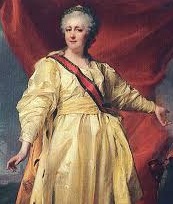






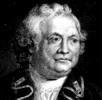






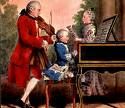
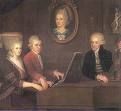
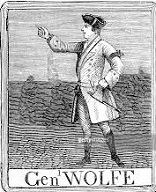


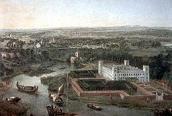
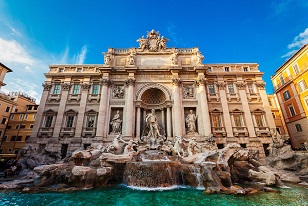


1762 On Jan. 5 (Dec. 25 Old Style) Empress (since Dec. 6, 1741) Elizabeth Petrovna Romanov (b. 1709) dies, and her pro-Prussian son Peter III (the Prussomaniac) (1728-62) becomes Russian Romanov tsar #11 (until July 9), founding the Holstein-Gottorp line of the House of Romanov, which rules until 1917; luckily for Prussia, Peter is an admirer of Frederick II and immediately seeks to end hostilities; he then tries to introduce Western-style mercantile capitalism, ends the practice of serfs working in industrial enterprises, and gets the Charter of the Nobility passed emancipating the nobles from compulsory service to the state, undoing Peter the Great's big dream of reforming the civil service, which doesn't stop him from becoming unpopular, and he ends up lasting only 6 mo. On Jan. 7 Wolfgang Amadeus Mozart (1756-91) gives his first public concert at age six for Bavarian elector Maximilian III Joseph; he and his older sister Maria Anna "Nannerl" Mozart (1751-1829) are paraded across Europe as child prodigies by their violinist father Leopold Mozart; Count Karl Johann Christian von Zinzendorf (1739-1813), HRE Joseph II's finance minister (nephew of Moravian Count Nicolas Ludwig von Zinzendorf) attends one their performances and records how wowed he is in his diary, and goes on to attend Wolfy's performances up to the day of his funeral, always recording the weather. In Jan. Spain enters the Seven Years' War on the side of France, just in time to share in France's defeat. In Feb. the British under Adm. George Brydges Rodney, 1st Baron Rodney (1718-92) capture Martinique, followed in Mar. by Grenada. On Mar. 9 after his son Marc-Antoine is found dead on the ground floor of his family's home on Oct. 13/14, 1761, French Protestant merchant Jean Calas (b. 1698) is sentenced by the parlement of Toulouise to death on the wheel, and he is executed on Mar. 10, declaring his innocence to the end, explaining that he hung himself over gambling debts and they tried to make it look like murder to save him from disgrace; when he learns that a Catholic prosecutor railroaded him through a Catholic magistrate and Catholic parlement, French lit. giant Voltaire takes the case, gets the sentence annulled and the chief magistrate fired by the king in 1764, and a new trial held that exonerates him in 1765, with the king receiving his family and paying them 36K francs damages; meanwhile Voltaire takes on the Church itself in a 1763 work. On Mar. 16 Russia and Prussia sign the Truce of Stargard, taking Russia out of the Seven Years' War, followed on May 5 by the Treaty of St. Petersburg, renouncing all hostile alliances and restoring all Russian conquests, restoring to Prussia all the lands in Silesia which Russia had taken from it. On Mar. 17 the first St. Patrick's Day Parade is held by English soldiers in New York City. On May 22 Sweden and Prussia sign the Treaty of Hamburg, restoring the antebellum status quo. On May 26 John Stuart, 3rd Earl of Bute (1713-92) becomes British PM (until Apr. 8, 1763), later being remembered ' as one of the most unpopular PMs in British history, attempting to assert the supremacy of the royal autocracy while claiming that the executive govt. are merely servants, causing William Pitt to call him "One behind the throne greater than the throne itself"; radical MP John Wilkes (1725-97) (ugliest man in England, with a protruding jaw and annoying squint, but eloquent, known for taking only half an hour to talk his face away) begins pub. the radical anti-Bute weekly The North Briton, satiring Bute's Scotland and taking an anti-Scottish anti-Jacobite attitude; William Hogarth gets into a political feud with him, and into another with poet Charles Churchill. In May Spain invades Portugal. On June 6-Aug. 13 after secretly leaving Portsmouth, N.H. on Mar. 5, the British under Adm. Sir George Pocock siege and capture Havana (#3 city in the New World behind Lima and Mexico City), receiving its formal surrender on Aug. 13 and claiming the conquest of Cuba, with Sir George Keppel, 3rd Earl of Albemarle (1724-72) becoming gov., after which African slaves are brought in and the economy pumped up; too bad, although the Brits only lose 560 of their 11K men in combat, half later die from yellow fever; Pocock gets a £122,697 share of prize money, then resigns in 1766 after returning to England and seeing rival Sir Charles Saunders beat him out for promotion to first Lord of the Admiralty; future U.S. gen. Israel "Old Put" Putnam (1718-90) returns from Cuba with three donkey-loads of cigars, introducing Yankees to them at his General Wolfe Tavern in Brooklyn, Conn. (founded 1868), known for a yellow pine sign on the door carrying a full-length portrait of Gen. Wolfe. In June Prussia and Russia sign an alliance against Austria. On June 24 the Prussians defeat the French at the Battle of Wilhemsthal (Wilhelmstadt)_; on July 23 the Second Battle of Lutterburg is a V for the Prussians under Prince Ferdinand over the French and Saxons under Gen. Le Comte. On July 9 (June 28 Old Style) after announcing harsher discipline for the Leib Guard, they depose Tsar (since Jan. 5) Peter III, and his German wife Princess Sophia August Fredericka of Anhalt-Zerbst (1st cousin of Gustav III of Sweden and Charles XIII of Sweden) is proclaimed Russian Romanov tsar #12 Catherine (Ekaterina) II the Great (1729-96) (until Nov. 17, 1796), having Count Alexei (Alexey) Grigoryevich Orlov (1737-1808), younger brother of her lover Count Grigory (Grigori) Grigoryevich Orlov (1734-83) (known as the breeder of the Orlov Trotter) strangle him on July 17 in custody in Ropsha Chateau outside Leningrad; Russia withdraws its troops from the Prussian army, but remains inactive, leaving Austria to face Prussia alone, allowing a 40K-man Prussian army (with a Russian contingent previously sent by dead Peter III) to defeat their 30K-man army on July 21 at the Battle of Burkersdorf; too bad, the secret dispatching of Peter III causes rumors that he's still alive to spread. On Aug. 24 Benjamin Franklin sails for home after five years in England, arriving in Philly in Nov.; his son William wins a royal appointment as royal gov. of New Jersey. On Aug. 31 emperor (since 1747) Momozono (b. 1741) dies, and by his special decree his 5-y.-o. son Prince Hidehito (later Go-Momozono) is passed over for his older sister (2nd daughter of Sakuramachi) Go-Sakuramachi (1740-1813) (personal name Toshiko), who becomes Japanese Yamato emperor #117 (8th and last female monarch until ?) (until May 23, 1771). On Sept. 15 the Battle of Signal Hill is a V for the British under Lt. Col. William Amherst over the French under Gen. Guillaume de Bellecombe, who are forced to surrender St. John's, confirming British control of Canada. On Sept. 24-Oct. 6 the Battle of Manila is a V for Britain over Spain, followed in Oct. by the Battle of Buenos Aires; the indios in the Philippines take advantage of the situation to stage uprisings throughout the Philippine archipelago, esp. under Diego Silang y Andaya (1730-63) in Ilocos. On Oct. 29 Prussia defeats Austria at the Battle of Freiburg (not to be confused with the 1644 Battle of Freiburg). On Nov. 13 after Louis XIV concedes Canada, the secret Treaty of Fontainebleau is signed by France, Britain, and Spain, assuring French withdrawal from Germany; France secretly gives Louisiana (La.) (all French territory W of the Mississippi River to the Rocky Mts. plus the island of Orleans) to Spain as compensation for the Spanish loss of Florida (Fla.) to Britain; the treaty is not revealed publicly until Apr. 21, 1764; while not obtaining all they could get if they tried, the British gain a glorious victory? - did I say dictator I meant leader? In Nov. the French capitulate at Cassel and evacuate the right bank of the Rhine River; a truce is signed by Prussia, Saxony, Austria, and the HRE. The Kingdom of Kartli and Kakheti in E Georgia (ends 1801) is formed by king (since 1744) Erekli II of Kakheti in an attempt to resist Persian attacks. The Spanish capture Colonia and occupy Rio Grande do Sul in Brazil. Mt. Pelee in Martinique Island, West Indies erupts (next 1851). Johnstown (originally Kinsborough) in N.Y. is founded by British supt. of Indian affairs (1755-74) Sir William Johnson, who doesn't name it after himself but after his johnson, er, son John Johnson; not to be confused with Johnstown, Penn. (founded 1800) - johnson jokes here? The tsar offers Germans free land and religious freedom, causing many to emigrate; by 1870 260K live along the Volga River, and 150K near the Black Sea; 3K German villages in the steppes are like "little German islands in the vast Russian ocean"; Balakovo on the left bank of the Volga River 81 mi. NE of Saratov is founded by the Old Believers returning from Poland. The British settle Maugerville in New Brunswick. Schenectady, N.Y. (burned in 1690) is rebuilt and incorporated as a borough in 1765, becoming an important river port on the Mohawk River; The French govt. sets up a special section of the Gobelins tapestry factory to produce Chinese and Japanese fakes, since the demand for Chinese and Japanese goods is draining the country of gold. The College in the English Colony of Rhode Island and Providence Plantations, later called Brown U. in the Baptist stronghold of Providence is founded at a meeting of the Philadelphia Baptist Assoc. led by Baptist minister Morgan Edwards (1722-95), who becomes the only Baptist preacher on the English side in the Am. Rev. War; in 1764 it is chartered, becoming the first Baptist college in the 13 colonies; founders incl. Isaac Backus, John Brown, Nicholas Brown, Morgan Edwards, William Ellery, Stephen Hopkins, James Manning, Ezra Stiles, and Samuel Stillman; "The first mover [himself] for it in 1762 was laughed at as a projector of a thing impracticable. Nay, many of the Baptists themselves discouraged the design (prophesying evil to the churches in case it should take place) from an unhappy prejudice against learning." Joseph Bellamy (1719-90) gives a sermon at the Gen. Assembly of Conn. that denounces capitalism ("competition") and advocates "cooperation" instead, founding the Christian Socialist movement in the U.S., which has dangerous forebodings of Nazism? David Hume becomes secy. of the British embassy in Paris (until 1765), becoming a lion of the French lit. set, and making friends with philosopher Jean-Jacques Rousseau - I'm alone, who cares? Dr. Samuel Johnson begins receiving a £1.5K annual pension from John Stuart, Lord Bute, along with LL.D degrees from Oxford U. and Dublin U. George Washington becomes vestryman of the Anglican Pohick Church, "the Mother Church of Northern Virginia" (founded 1724), which he helps rebuild and survey the land for in 1774, resigning in 1784 after returning from the Am. Rev. because he can't keep supporting a church headed by his ex-king George III? George III buys Buckingham House (built 1703) for his wife Queen Charlotte, and it becomes known as "the Queen's House", where she goes on to give birth to 14 of their 15 royal brats, and where Mozart plays for the king in 1764. Christoph Martin Wieland begins translating 17 Shakespeare plays into German (1762-6) in 8 vols., becoming the first look the Krauts get at the Anglo-Saxon god. After producing fine pottery since 1759, Josiah Wedgwood (1730-95) opens his Etruria Factory in Hanley, Staffordshire, producing Etruria bone china by 1769, selling it in partnership with Thomas Bentley in London; in 1765 his cream-colored earthenware is ordered by George III's wife Queen Charlotte, who is so pleased she allows him to call it Queensware; he also produces jasperware, blue with white raised designs. The 1762 Gautier Cognac becomes the oldest bottled cognac to survive to modern times. Architecture: St. George's Episcopal Church is built. The Sorbonne Library (Bibliotheque de la Sorbonne) in Paris is founded. Hugh Percy, 1st Duke of Northumberland (1714-86) hires neoclassical architect Robert Adam (1728-92) and landscape designer Lancelot "Capability" Brown (1716-83) to redesign Syon House in Isleworth, NW London by the Thames (finished in 1769); Syon Park is also built, housing 200 species of rare trees, looking across the Thames River to Kew Gardens. Fraunces Tavern at Broad and Pearl Sts. in New York City, built as a home in 1719 by rich French Huguenot Etienne de Lancey is opened by West Indian-born Samuel Fraunces as Queen's Head Tavern. 86 ft. x 161.3 ft. Trevi Fountain in Palazzo Poli in Trevi, Rome at the junction of three roads (It. "tre vie") of the ancient Aqua Virgo is completed, designed by Nicola Salvi and completed by Pietro Bracci, becoming the largest Baroque fountain in Rome; barrels of water from it are sent across the Tiber River to the Vatican for cents.; people begin throwing coins into it, which are collected and given to charity; the belief is that one day they will be granted a safe return; later featured in several films incl. "Roman Holiday" (1953), "Three Coins in the Fountain" (1954), and "La Dolce Vita" (1960); refurbished in 1998. Inventions: In Jan. John Harrison (1693-1776) wins the £20K prize from the British Board of Longitude for an accurate marine chronometer to improve navigation after it loses only 5.1 sec. on a 6.5 week voyage to Jamaica. Scotland's Stirlingshire iron works at Carron converts cast iron to malleable iron for the first time. Ambrose Godfrey Jr. (-1756), son of phosphorus manufacturer Ambrose Godfrey (1660-1741) invents the fire extinguisher. Edward Gibbons becomes the first to mention the word "sandwich" in his journal entry for Nov. 24; it was invented somewhen by John Montagu, 4th Earl of Sandwich (1718-92), and was originally salt beef on toasted bread. Nonfiction: George Campbell, Dissertation on Miracles; we should believe a report of a miracle for the same reason that children trust their parents? Michael Combrune, The Theory and Practice of Brewing; first attempt to establish rules and principles for the art of brewing; pub. with the permission of the Worshipful Co. of Brewers of London; rev. ed. pub. 1804. Mary Darly, A Book of Caricaturas; for "young gentlemen and ladies"; the first book on caricature drawing, by the wife of London engraver Matthew Darly. Henry Home, Lord Kames (1696-82), Elements of Criticism (2 vols.) (5th ed. 1772); examines the rules of lit. composition and attempting to establish a new theory based on the principles of human nature, calling the 18th cent. tradition of sentimental lit. hogtied to the notion that "the genuine rules of criticism are all of them derived from the human heart"; "Genius is allied to a warm and inflammable constitution, delicacy of taste to calmness and sedateness. Hence it is common to find genius in one who is a prety to every passion; which can scarce happen with respect to delicacy of taste. Upon a man possessed of that blessing, the moral duties, not less than the fine arts, making a deep impression, counterbalance every irregular desire; at the same time, a temper calm and sedate is not easily moved, even by a strong temptation." Robert Lowth (1710-87), A Short Introduction to English Grammar; becomes a std. textbook; "The placing of the Preposition before the Relative is more graceful, as well as more perspicuous." Anton Raphael Mengs (1728-79), Gedanken Uber die Schonheit und Uber den Geschmack in der Malerey; how perfection in painting is attainable by a classical Greek approach combining the expression of Raphael, the chiaroscuro of Correggio, and the colors of Titian (1477-1576), making him the first Neoclassicist or the last Baroque painter?; "So much learning... allied to a total want of initiative and poverty of invention, and embodied with a strained and artificial mannerism" (Goethe). John Parkhurst (1728-97), An Hebrew and English Lexicon. Did anybody tell you that forever feels like stars in your head, it's the star power? Jean-Jacques Rousseau (1712-78), The Social Contract; or Principles of Political Right (Du Contrat Social, ou Principes du Droit Politique) (Apr.); ditches the divine right of kings theory in favor of the theory that only the people are sovereign and have the right to rule; how the general will that seeks the interest of all "forces us to be free, unenslaved to our own or to other's artificial power even while in society, and to preserve that general will in the social contract, there must be no factions, no gulf between rich and poor and no society too large for democratic self-governance"; "Man is born free, and everywhere he is in chains"; becomes the textbook of the French Rev., and is used in writing the Federalist Papers; makes the Roman Catholic Index of Prohibited Books, and is banned in France and Geneva; "I have a premonition that some day this little island [Corsica] will astonish Europe"; Emile, or On Education (Emile, ou Traite de l'Education) (May); feeling the star power, Rousseau flees Geneva for Bern, then Motiers, and finally flees the Continent for Britain, settling in Wootton, Staffordshire. Thomas Sheridan (1719-88), A Course of Lectures on Elocution; disses Mr. Spock, er, John Locke (1632-1704), saying that it's all about tones? - seig Heil? Stuart and Revett, Classical Antiquities of Athens, Vol. 1; inspires the neoclassical movement. Music: Thomas Arne (1710-78), Artaxerxes (opera) (Covent Garden, London); surprise hit of the year; first attempt to write an Italian opera seria in English (until ?). Christoph Gluck (1714-87), Orfeo ed Euridice (Orpheus and Euridice) (opera) (Oct. 5) (Venice); his first "reform" opera, and masterpiece?; incl. Che Faro Senza Euridice?, Melody. Art: George Stubbs (1724-1806), Whistlejacket; lifesize (115 in. x 97 in.) painting of the Marquess of Rockingham's racehorse. Giovanni Battista Tiepolo (1696-1770), Frescoes in the Royal Palace of Madrid (1762-6). Plays: Thomas Arne (1710-78) and Isaac Bickerstaffe (1733-1812), Love in a Village (ballad opera) (Royal Opera, Covent Garden, London) (Dec. 8); first English comic opera; libretto based on Charles Johnson's 1729 play "The Village Opera"; contains 42 musical numbers, with 24 by other composers; features the song The Miller of Dee; spawns a vogue for pastiche opera that lasts until the 19th cent. Charles Dibdin (1745-1814), The Shepherd's Artifice (operetta) (May 21) (Covent Garden, London). Denis Diderot (1713-84), Le Neveu de Rameau (Rameau's Nephew) (1762-4). William Falconer (1732-69), The Shipwreck. Carlo Goldoni (1707-93), Una della Ultime Sere di Carnevale (One of the Last Carnival Evenings) (comedy); Le Baruffe Chiozzotte (comedy). Hannah More (1745-1833), The Search after Happiness (pastoral drama for young ladies) (first play); sells 10K copies by the 1780s. Poetry: Johann Gottfried von Herder (1744-1803), Song to Cyrus, Grandson of Astyages (Gesang an den Cyrus) (first work); written before becoming a clergyman and moving to Riga in 1764, cranking out works of lit. criticism before travelling in 1769 by ship to Nantes and Paris, followed in 1770 to Strasbourg, where he meets young Goethe, finding out that he inspired him to develop his own lit. style, helping launch the Sturm und Drang movement; in 1771 he becomes head pastor at Buckeburg under Count Wilhelm von Schaumburg-Lippe, and Goethe uses his rising influence in Weimar to get him a position as gen. suptd. in 1776, after which he switches to classicism, supporting the French Rev., attacking Kantian philosophy, and splitting with Goethe. Richard Hurd (1720-1808), Letters on Chivalry and Romance. James Macpherson (1736-96), Fingal, an Ancient Epic Poem, in Six Books. Voltaire (1694-1778), Eloge (Éloge) de M. de Crebillon (Crébillon); disclaims authorship since Crebillon was his biggest rival. Edward Young (1683-1765), Resignation. Novels: Charlotte Ramsay Lennox (1720-1804), The History of Harriot and Sophia. Births: German celeb Maria Constanze (Konstanze) Cecilia Josepha Johanna Aloysia Mozart (nee Weber) (d. 1841) on Jan. 5 in Zell im Wiesental, Germany; wife (1782-) of Wolfgang Amadeus Mozart (1756-91); sister of Josepha Weber (1758-1819), Aloysia Weber (1760-1839), and Sophie Weber (1763-1846); mother of 6 children, incl. Karl Thomas Mozart (1784-1858) and Franz Xaver Wolfgang Mozart (1791-1844). Vietnamese Ngyuen emperor #1 (1802-20) Gia Long (Nguyen Phuc Angh) (d. 1820) on Feb. 8. French Rev. War gen. (black) Thomas-Alexandre Davy de la Pailleterie (Dumas) (d. 1806) on Mar. 25 in Jeremie, Saint-Domingue; father of Alexandre Dumas pere (1802-70); son of Marquis Alexandre Antoine Davy de la Pailleterie (1714-86) and black slave Marie Cesette Dumas. Spanish Adams-Onis Treaty diplomat (Spanish envoy to the U.S. in 1809-19) Luis de Onis Gonzalez Vara (d. 1827) on June 4 in Cantalapiedra, Salamanca. German physician (inventor of the term "macriobiotic") Christoph Wilhelm Friedrich Hufeland (d. 1836) on Aug. 12 in Langensalza, Thuringia. British PM (1809-12) Spencer Perceval (d. 1812) on Nov. 1; educated at Harrow and Trinity College, Cambridge U. German Idealist philosopher (Freemason) (atheist) Johann Gottlieb Fichte (d. 1814) on May 19 in Rammenau, Upper Lusatia, Saxony; father of Immanuel Hermann Fichte (1796-1879); disciple of Immanuel kant; dismissed from the U. of Jena in 1799 for atheism, ending up in Berlin. Irish "Christian Brothers", "Presentation Brothers" founder Edmund Ignatius Rice (d. 1844) on June 1 in Callan, County Kilkenny. U.S. Supreme Court justice #11 (1798-1829) Bushrod Washington (d. 1829) on June 5 in Mount Holly, Va.; educated at the College of William and Mary. Am. "The Virginia House-Wife" writer Mary Randolph (d. 1828) on Aug. 9 in Ampthill Plantation near Richmond, Va.; descendant of John Rolfe and Pocahontas; sister of Thomas Mann Randolph Jr. (1768-1828) (son-in-law of Thomas Jefferson); cousin of Mary Lee Fitzhugh Custis, wife of George Washington Parke Custis, Arlington's builder. English king (1820-30) and regent (1811-20) George IV (George Augustus Frederick) (d. 1830) on Aug. 12 in St. James's Palace, London; eldest son of George III (1738-1820) and Charlotte of Mecklenburg-Strelitz (1744-1818). French geologist Jean-Francois d'Aubuisson de Voisons (d. 1841) on Aug. 17; student of Abraham Werner (1749-1817). French neoclassical Empire Style architect Pierre Francois Leonard Fontaine (d. 1853) on Sept. 20 in Pointoise, Val-d'Oise; collaborator of Charles Percier (1764-1838). English "The Spirit of Discovery" clergyman-poet William Lisle Bowles (d. 1850) on Sept. 24 in King's Sutton, Northamptonshire; educated at Trinity College, Oxford; vicar of Bremhill, Wiltshire (1804-50). English "The Heir at Law" dramatist-poet George Colman the Younger (d. 1836) on Oct. 21 in London; son of George Colman the Elder (1732-94); educated at Westminster School, Christ Church, Oxford U., U. of Aberdeen, and Lincoln's Inn, London; uses the alias Arthur Griffinhood of Turnham Green. French poet Andre Marie Chenier (André Marie Chénier) (d. 1794) on Oct. 30 in Istanbul, Turkey; brother of Marie-Joseph Chenier (1764-1811). German Roman Catholic theologian Martin Boos (d. 1825) on Dec. 25 in Huttenried, Bavaria. Am. Pres. Washington's secy. (1784-99) Tobias Lear (d. 1816) in Portsmouth, N.H. Am. White House architect James Hoban (d. 1831) (pr. HO-buhn) (b. 1758?) near Desart, County Kilkenny, Ireland; emigrates to the U.S. in 1781. Korean sirhak scholar Chong Yag-yong (d. 1836). Am. Congregationalist (New Israelites) minister Ethan Smith (d. 1849) in Belchertown, Mass.; educated at Dartmouth College. Deaths: French poet-dramatist Prosper Jolyot de Crebillon (b. 1674) on June 17. English dandy Richard "Beau" Nash (b. 1674); dies broke. Italian composer Francesco Manfredini (b. 1684) on Oct. 6 in Pistoia. Italian composer Francesco Geminiani (b. 1688) in Dublin. English inoculator-writer Lady Mary Wortley Montagu (b. 1689) on Aug. 21 in London: "General notions are generally wrong." English academic Shallet Turner (b. 1692) on Nov. 13. English royal astronomer James Bradley (b. 1693); discoverer of stellar aberration and the Earth's nutation. French ophthalmologist Jacques Daviel (b. 1696) on Sept. 30 in Geneva (apoplexy). English adm. Baron George Anson (b. 1697) on June 6 in Moor Park, Hertfordshire. French sculptor Louis-Francois Roubiliac (b. 1702). Indian Sufi Muslim reformer Shah Walli-Ullah (Wali Allah al-Dihlawi) (b. 1703). Russian Tsarina (1741-62) Elizabeth Petrovna Romanov (b. 1709) on Jan. 5. French astronomer Nicolas de Lacaille (b. 1713) on Mar. 21 in Paris (gout). Japanese Yamato emperor #116 (1741-62) Momozono (b. 1741) on Aug. 31. German physicist Johann Tobias Mayer (b. 1752) on Feb. 20. Russian tsar (1762) Peter III (b. 1728) on July 17 in Ropsha (strangled).









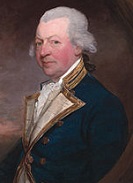






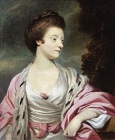
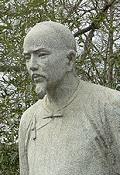
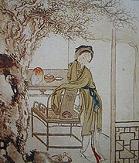
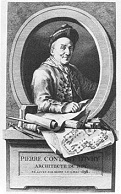







1763 Another foot-and-mouth panzootic strikes Europe (ends 1764). This year Scottish and Scots-Irish (codewords for Protestant) settlers arrive in record numbers in North Am., and fan out from Philly. By this year Venice has 218 coffee shops. On Feb. 10 after House of Commons leader (since 1762) Sir Henry Fox bribes, intimidates and persuades the House to approve it (and is raised to the peerage for it, becoming 1st Baron Holland), the 1763 Treaty of Paris between Britain, France, Spain, and Portugal, negotiated for France by foreign minister Cesar Gabriel de Choiseul, Duc de Praslin (1712-85) ends the French and Indian War along with the Seven Years' War (begun 1756), giving Britain's ally Frederick II the Great of Prussia a V; "Half a continent... changed hands at the scratch of a pen" (Francis Parkman); French imperialist dreams are dashed bigtime, and in return for the #1 sugar island of Guadalupe, France cedes to Britain all claims to Acadia, Canada (Quebec), Cape Breton, Louisiana E of the Mighty Mississippi except Orleans Island, plus all of India; Spain cedes Florida to Britain in return for British evacuation of Havana (to prevent Britain from going on to swallow up Mexico), and receives Louisiana from France, which is resisted locally by French colonists; St. Vincent Island is ceded to Britain (until 1779), along with Dominica Island; displaced Acadians begin to head for Louisiana, where they become known as Cajuns, while Spanish colonists leave Florida for Havana, and British colonists with their slaves head for Florida; Spain regains Cuba and the Philippines, while Portugal regains Colonia and Rio Grande do Sul; the Spanish begin transforming Havana into the most heavily fortified city in the New World, building the Fortress of San Carlos de la Cabana over 11 years, becoming the biggest Spanish fortification in the New World, equipped with cannons made in Barcelona; France is allowed to keep a trading post in Bengal, India, and to keep Guadeloupe Martinique, Belle Isle, Maria Galante and St. Lucia, and also to have fishing rights on the Newfoundland Banks, with the small islands of St. Pierre and Miquelon for fish curing, otherwise the French empire in America is, er, history?; Britain keeps one of the French posts on the coast of Guinea and loses the other; Britain recovers Minorca; France is bankrupt, and its navy a wreck, but war secy. (Cesar's cousin) Etienne Francois, Duc de Choiseul (1719-85) predicts that the British Am. colonies will rebel, and begins rebuilding the French navy to take advantage of it?; Britain is now numero uno, but the British Parliament then proceeds to fart away its American colonies via a series of dumbass Acts?; Lord Newcastle tries to organize an opposition to the Treaty of Paris and fails, finding that all who vote against it soon lose any offices or pensions they hold from the crown as punishment; by using this power the king gradually builds up a group in the House of Commons known as the King's Friends - if you look like a tree he'll talk to you? On Feb. 15 the Treaty of Hubertusburg is signed by Austria and Prussia, ratifying the treaties of Breslau, Berlin, and Dresden, with Prussia retaining Silesia in return for its promise to vote for Archduke Joseph for king of Rome; Saxony is restored to the pre-war status quo. In Feb. John Adams coins the term "caucus" (Lat. "caucus" = drinking vessel) after a meeting of the Caucus Club in the attic of friend Tom Daws, with the soundbyte "There they smoke tobacco till you cannot see from one end of the garrett to the other. There they drink phlip I suppose, and there they choose a moderator, who puts questions to the vote regularly, and select men, assessors, collectors, wardens, fire wards, and representatives are regularly chosen before they are chosen in the town." On Apr. 8 unpopular British PM (since May 26, 1762) Earl of Bute resigns as British PM, and on Apr. 16 the king replaces him with Whig George Grenville (1712-70) (until July 13, 1765); most Whigs don't support him, and they try to ally with Pitt to defeat him, but the king vacillates, letting him stay in office as long as he's as nice a rock-n-roller as he can find. In Apr. Benjamin Franklin (1706-90) leaves Philly on a 7-mo. 1,780-mi. postal inspection tour through Va. and N.H., after visiting a school for black children in Philly that he helped found; he writes the soundbyte: "I was on the whole much pleased, and from what I then saw have conceived a higher opinion of the natural capacities of the black race than I had ever before entertained. Their apprehension seems as quick, their memory as strong, and their docility in every respect equal to that of white children" - but I wouldn't want my daughter to marry one? On May 7 fearing the reentry of English settlers to the Ohio region, and pissed-off at the French cession of their lands without consulting them (they hadn't lost, had they?) Pontiac's Rebellion (War) begins (ends 1766) when Odawa Chief Pontiac (Obwandiyag) (1720-69) and 60 Ottawa chiefs enter Ft. Detroit with weapons under their blankets, but commander Maj. Gladwyn is warned by his Indian mistress, causing them to leave, only to return on May 10 assisted by other tribes and siege the fort; meanwhile on May 16 Ottawas and Hurons from Detroit capture Ft. Sandusky and its 15 man garrison using the blanket ruse, butcher them, and go east, killing settlers and wiping out every British post in the Ohio region, incl. Ft. Michilimackinac; Ft. Pitt is sieged on June 27-Aug. 6 and relieved by British regulars and frontiersmen under Col. Henry Louis Bouquet (1719-65), who supervises construction of Bouquet's Blockhouse at Ft. Pitt; Ft. Detroit and Ft. Niagara survive; all of this catches British Gen. Jeffrey Amherst (in New York City) by surprise, despite warnings by Sir William Johnson that he should have been handing them regular gifts to keep them from getting restless, to which Amherst replies: "I cannot think it necessary to give them any presents by way of Bribes, for if they do not behave properly they are to be punished", adding that the Indians are "more nearly allied to the Brute than to the Human Creation", and are "an execrable race", and concluding that "I am fully resolved whenever they give me an occasion to extirpate them root and branch"; meanwhile he fails to understand that the Indians had become dependent on handouts from the French, were starving for lack of gunpowder for hunting and because their hunting grounds had been cut back, and that the French had been working behind the scenes to stir up their resentment, while a mad mystic known as the Neolin (Algonq. "enlightened") the Delaware Prophet was uniting them in a vision that says "get whitey"?; on July 31 the Battle of Bloody Run sees the British attempt to surprise the Indians, and the latter turn the tables; Ft. Pitt is liberated in Aug., and Pontiac leaves Ft. Detroit in early Nov., making peace overtures; the Battle of Bushy Run on Aug. 5-6 features "swing action" between Brits and cool-dressing painted woodland Indians; Amherst plans a totally racist-to-the-max spring campaign against the Indians (incl. the spreading of smallpox through infected blankets?), but is finally recalled to England after five years, sailing on Nov. 10 on the Weasel, turning command over to Maj. Gen. Thomas Gage with instructions to "punish" the Indians and not allow more lenient Sir William Johnson to let them off; the war doesn't end until 1766, with a total of 500 redcoats KIA; Amherst's mad wife Jane dies a few mo. after he returns, and he razes his ancestral home of Brooks Place in Kent and erects a new brick barracklike house called Montreal, living off £1500/year as non-resident gov. of Va. plus another £800/year military pension, then on Mar. 26, 1767 marries well-racked 47-y.-o. blonde Elizabeth Cary (1740-1830) (daughter of Lt.-Gen. George Cary), whom he calls "the white pussy" - pass the toy boats, dear? On May 16 Scottish lawyer James Boswell (1740-95) meets much older, wiser and impressive Dr. Samuel Johnson (1709-84), the most famous English lit. figure of the latter half of the cent., and begins taking notes for a fawning bio. immortalizing him - as one fag said to the other, I'm Boswell to your Johnson? On July 2 Persia signs an agreement with the British East India Co. allowing its agents to establish a British commercial base in the port of Bushire, which lasts into the 20th cent. On Oct. 5 Augustus III (b. 1696) of Poland dies, and his son Frederick Christian (b. 1722) succeeds as elector of Saxony, then dies on Dec. 17, and his son Frederick Augustus I "the Just" (1750-1827) succeeds him as king-elector of Saxony (until 1806), under the guardianship of Prince Xavier (until 1768), going on to reduce taxes and set a just example; meanwhile Catherine II the Great sees her chance to get her main squeeze Poniatowski the throne of Poland. On Oct. 7 Pontiac's Rebellion, plus the huge British debt from the French and Indian War causes the British crown to issue the Royal Proclamation of 1763, setting aside the region between the Appalachians and the Mississippi River as Indian territory where white colonists are forbidden to settle, or even survey; it also renames the colony of Canada to the province of Quebec, provides a govt. for Grenada, and establishes the new British colonies of East and West Florida, centered around St. Augustine and St. Marks; the "proclamation line" doesn't stop white greed, however - just think, only 200 years until an Irish is killed in a Lincoln in former Indian territory, and the word Pontiac means a brand of car? On Dec. 4 a mob of over 50 frontiersmen from the town of Paxton in Lancaster County murder six unarmed, peaceful, converted Christian Conestoga Indians; two weeks later a larger mob slaughters 14 more Indians harboring in a workhouse; the 1.5K "Paxton Boys" then announce their intention of going to Philly and killing 140 more peaceful Moravian Indians from Bethlehem being sheltered there; a religious civil war ensues as the pacifist Quakers try to protect the Indians from the Presbyterian and Lutheran frontiersmen. Faced with a staggering British debt from the war, George Grenville, first lord of the British treasury secures an Act for the Encouragement of Officers Making Seizures, which sets up a new vice-admiralty court in Halifax having jurisdiction over all Am. colonies, and which has no provision for juries of colonists; he also attempts to tighten the customs service, and sends the British navy to patrol the American coasts. Indian adventurer Hyder Ali (1722-82) conquers Kanara in Mysore. French soldier Louis-Antoine, Comte de Bougainville (1729-1811), aide-de-camp to the Marquis de Montcalm in Canada in the Seven Years' War (who wrote a textbook on calculus at age 25) enters the navy as a capt., and next Jan. attempts to establish the French colony of Port Louis in the Falkland Islands (Islas Malvinas) using 150 expelled Acadians from Canada, but objections by Spain cause it to be abandoned in 1766, when France surrenders its claims on the islands to Spain, and after possession is transferred on Jan. 31, 1767 France renames the colony to Puerto Soledad; meanwhile in 1766 British capt. John MacBride (1735-1800) colonizes Port Egmont on Saunders Island, which is discovered and captured by Spain in 1770, and restored to Britain in 1771, after which in 1774 Britain voluntarily withdraws from the islands after leaving a plaque claiming them for George III. Russian fur trader Stefan (Stephan) Glotov discovers Kodiak Island; it is not settled until 1784. bicerin (It. "small glass"), a bitter coffee drink with dark chocolate and cream with a jealously-guarded secret recipe is invented in Turin, Italy. In 17-y.-o. artist Francisco de Goya (1746-1828) goes to Madrid to try to win a prize at the Academy of San Fernando, loses, then makes the acquaintance of fellow Aragonian artist Francisco Bayeu y Subias (1734-95), who brought German painter Anton Raphael Mengs' academic style to the Spanish court, going on to teach it to Goya and help his career, not to mention that Goya marries his sister Josefa. The Marquis de Sade (1740-1814) is imprisoned at the age of 23 after a encounter with a ho that goes bad; by his death in 1814 he has spent a total of 27 years in prison. The Isle of Man makes urgent appeals for a Manx trans. of the Bible, since two-thirds of the inhabitants only speak that language; the first translations of different books of the Bible appear in 1748. Frederick II the Great establishes village schools in Prussia. The first chambers of commerce are organized in New York and New Jersey. Pit ponies are first used. The term "mercantilism" is finally coined by French Physiocrat economist Victor de Riqueti, Marquis de Mirabeau (1715-89). St. James' Chronicle begins pub. in London (until 1790). French army pharmacist Antoine-Augustin Parmentier is forced to eat filthy animal food potatoes in a Prussian military prison, discovering their joys and going on to promote them back in France, getting them decriminalized in 1772. Architecture: On Apr. 3 L'Eglise de la Madeleine (La Madeleine) (Madeleine Church) in Paris is begun, with the king placing a cornerstone; after slow progress, only the foundations and grand portico are finished by 1797; after Napoleon farts around with it in 1806, intending it to be a temple to the glory of his army, then dumps it for the Arc de Triomphe in 1808, it is finally finished in 1829 and consecrated on July 24, 1842. Touro Synagogue, designed by Peter Harrison is built in R.I., becoming the oldest synagogue in the U.S. Science: German botanist J.G. Kolreuter (1733-1806) conducts experiments on artificial fertilization of plants by animal carriers of pollen. Nonfiction: Anon., Almanach de Gotha; detailed genealogies of Euro royalty; begins pub. at the court of Duke Frederick III of Saxe-Gotha-Altenburg (until 1944), becoming the #1 directory of Europe's highest nobility and royalty, with inclusion making or breaking people socially. Domenico Angelo (1717-1802), The School of Fencing (L'Ecole des Armes) (London); incl. 24 engraved plates showing classic positions; becomes a std. textbook on the small sword, changing fencing from an art of war to a sport. James Ferguson (1710-76), Astronomical Tables and Precepts for Calculating the True Times of the New and Full Moons, and Shewing the Method of Projecting Eclipses, from the Creation of the World to A.D. 7800 (8 vols.). Nicolas Louis de Lacaille (1713-62), Coelum Australie Stelliferum (posth.); catalog of 10K southern stars, incl. 42 nebulae and 14 new constellations, plus a table of eclipses for 1800 years. Johann Gottfried von Herder (1744-1803), Essays on Being (2 vols.) (1763-4). Gabriel Bonnot de Mably (1709-85), Entretiens de Phocion; philosophical dialog; his biggest hit. Catharine Macaulay (1731-91), History of England from the Accession of James I to the Elevtion of the House of Hanover (8 vols.) (1763-83); big hit; Horace Walpole claims it beats David Hume. Nevil Maskelyne (1732-1811), The British Mariner's Guide. Robert Waddington (-1779), Practical Method for Finding the Longitude; claims his tables reduce the time needed from several hours to 45 min. Voltaire (1694-1778), Treatise on Tolerance on the Occasion of the Death of Jean Calas from the Judgment Rendered in Toulouse (Pieces Originales Concernant la Mort des Sieurs Calas det le Jugement rendu a Toulouse) (Apr.) (Geneva) (Gabriel Cramer); about French Protestant Jean Calas (1698-1762), who was executed in Toulouse on Mar. 10, 1762 despite enduring torture for allegedly murdering his son Marc-Antoine to prevent his conversion to the Church, when it was really suicide because of gambling debts, and his family took him off the noose before calling the authorities to remove the shame, which doesn't stop the Catholic prosecutor from railroading him through Catholic judges and a Catholic parlement, pissing him off about Catholic prejudice and fanaticism, causing him to take on the Church itself; at first sent only to Madame de Pompadour, some French privy council ministers, the king of Prussia, and some German princes, its gen. pub. in Oct. gets it quickly banned; "There are about forty millions of inhabitants in Europe who are not members of the Church of Rome; should we say to every one of them, 'Sir, since you are infallibly damned, I shall neither eat, converse, nor have any connections with you?'"; "O different worshippers of a peaceful God! If you have a cruel heart, if, while you adore he whose whole law consists of these few words, "Love God and your neighbor'..."; "I see all the dead of past ages and of our own appearing in His presence. Are you very sure that our Creator and Father will say to the wise and virtuous Confucius, to the legislator Solon, to Pythagoras, Zaleucus, Socrates, Plato, the divine Antonins, the good Trajan, to Titus, the delights of mankind, to Epictetus, and to many others, models of men: 'Go, monsters, go and suffer torments that are infinite in intensity and duration. Let your punishment be eternal as I am. But you, my beloved ones, John Châtel, Ravaillac, Damiens, Cartouche, etc. who have died according to the prescribed rules, sit forever at my right hand and share my empire and my felicity.' You draw back with horror at these words; and after they have escaped me, I have nothing more to say to you." Art: Francois Boucher (1703-70), Angelica and Medoro; Bird Cage - he felt like a pelican in the wilderness, an owl in the desert? Miguel Cabrera (1695-1768), From Mestizo and Indian, Coyote; portrays the race-mixing between Spanish and Indian. Francesco Guardi (1712-93), Miracle of a Dominican Saint; The Doge's Feasts; 12 paintings celebrating the 1763 ceremonies for the election of Doge Alvise IV Mocenigo; incl. Election of the Doge of Venice. Jean-Baptiste Oudry (1686-1755), Still Life with Pheasant. George Stubbs (1724-1806), Mares and Foals (1763-8). Music: Wolfgang Amadeus Mozart (1756-91), Sonatas for the Harpsichord and Violin, KV 6-9; pub. in Paris while on a Grand Tour of Europe, where he gives a concert for Louis XV; incl. Sonata in C major KV6. Jean Georges Noverre (1727-1810), Jason and Medea (ballet). Plays: Charles Simon Favart (1710-92), L'Anglais a Bordeaux. Carlo Goldoni (1707-93), La Jalousie d'Arlequin (The Harlequin's Jealousy) (comedy); Les Inquietudes de Camille (Camilla's Worries) (comedy). Jean-Francois de La Harpe (1739-1803), Warwick (first play); his masterpiece? Gotthold Lessing (1729-81), Minna von Barnhelm (blank-verse drama); launches the Classical Period of German Lit., its greatest era? Frances Sheridan (1724-66), The Discovery. Poetry: Sir William Jones (1746-94), Caissa; the nymph Caissa spurns the advances of Mars, causing him to create the game of chess to win her; causes Caissa to be called the goddess of chess. James Macpherson (1736-96), Temora, an Epic Poem, in Eight Books. Giuseppe Parini, Il Mattino; part 1 of the 4-part "Il Giorno". Novels: Betje Wolff (1738-1804), Reflections on Pleasure (first novel). Cao Xueqin (1724-64), Dream of the Red Chamber (Mansions) (Story of the Stone) (Honglou Meng) AKA Story of the Stone (Shitou Ji); a semi-autobio. novel about his family, with a huge cast of chars. esp. hot babes, becoming the last of the Four Great Classical Novels of China; it circulates in ms. form until its first print pub. in 1791. Births: French Roman Catholic statesman and cardinal (1803-) Joseph Fesch (d. 1839) on Jan. 3 in Ajaccio, Corsica; half-brother of Napoleon's mother. French diplomat Edmond Charles Edouard "Citizen" Genet (Genêt) (d. 1834) on Jan. 8 in Versailles; father is secy. interpreter at the French ministry of foreign affairs, and he replaces him when he dies in 1781; is attached to the French embassy in St. Petersburg from 1787-92, recalled after the Russian govt. objects to his liberal opinions, and comes to the U.S. in 1793 after being appointed French minister. Swedish-Norwegian king (1818-44) Charles (Carl) XIV John (Johan) (Jean Baptiste Jules Bernadotte) (d. 1844) on Jan. 23 in Pau, France; original family name is de Pouey; adds the "Jules" for Julius Caesar; father of Oscar I (1799-1859); has a "Death to All Kings" tattoo on his arm. Am. Presbyterian minister (Disciples of Christ founder) Thomas Campbell (d. 1854) on Feb. 1 in County Down, Ireland; raised as an Anglican; educated at the U. of Glasgow; emigrates to the U.S. in Apr. 1807; father of Alexander Campbell (1788-1866). French Gen. Jean Victor Marie Moreau (d. 1813) on Feb. 14 in Morlaix, Brittany; helps Napoleon rise, then becomes a rival and ends up exiled to the U.S. Bohemian composer Adalbert Gyrowetz (d. 1850) on Feb. 20 in Ceske Budejovice (Budweis). English reformer-journalist William Cobbett (d. 1835) (AKA Porcupine) on Mar. 9 in Farnham, Surrey. German writer Jean Paul (Johann Paul Friedrich) Richter (d. 1825) on Mar. 21 in Wunsiedel, Bavaria. English schoolmaster Thomas Wright Hill (d. 1851) on Apr. 24 in Kidderminster, Worcestershire; father of Rowland Hill (1795-1879); inventor of the single transferable vote (1821). Scottish anatomist-surgeon John Bell (d. 1820) on May 12 in Edinburgh; brother of Charles Bell (1774-1842). French police minister ("architect of the police state") Joseph Fouche (Fouché), 1st Duc d'Otrante (d. 1820) on May 21 in Le Pellerin (near Nantes). Japanese haiku poet Kobayashi Issa (Jap. "cup of tea") (Yataro) (d. 1828) on June 15 in Kashiwabara, Shinano Province. German statesman Count Johann Philipp von Stadion (d. 1824) on June 18 in Mainz. Irish repub. rebel ("Father of Irish Republicans") Theobald Wolfe Tone (d. 1798) on June 20 in Dublin; educated at Trinity College, Dublin. French empress (1804-9) ("the Creole") Josephine (d. 1814) on June 23 in Martinique; 1st wife of Napoleon Bonaparte (1796-1809). Am. "Commentaries on American Law" jurist James Kent (d. 1847) on July 3 in Fredericksburgh, N.Y.; educated at Yale U.; first prof. of law at King's College (Columbia U.). Am. fur-trading magnate and financier John Jacob (Johann) Astor (d. 1848) on July 17 in Waldorf (near Heidelberg), Germany; emigrates to the U.S. in 1783. Dutch theologian-minister-orator Johannes Henricus van der Palm (d. 1840) on July 17 in Rotterdam. Am. architect (first native-born Am. prof. architect) Charles Bulfinch (d. 1844) on Aug. 8 in Boston, Mass.; educated at Boston Latin School, and Harvard U.; father of mythologist Thomas Bulfinch (1796-1867). British heir presumptive (1820-7) prince Frederick, Duke of York and Albany (d. 1827) on Aug. 1 in St. James's Palace, London; 2nd child and 2nd son of George III and Charlotte of Mecklenburg; created duke in 1784. Russian adm. Dmitry (Dmitri) Nikolayevich Senyavin (Seniavin) (d. 1831) on Aug. 17 in Borovsk, Kaluga. French Savoyard "Journey Around My Room" writer Xavier de Maistre (d. 1852) in Oct. in Chambery, Savoy; brother of Joseph de Maistre (1753-1821). Canadian brewer (Unitarian) (Freemason) >John Molson (d. 1836) on Dec. 28 in Moulton, Spalding, Lincolnshire, England; emigrates to Canada in 1782. French gen. Jean Etienne Championnet (Vachier) (d. 1800). French adm. Pierre Charles Jean Baptiste Silvestre de Villeneuve (d. 1806) on Dec. 31 in Valensole. English rustic painter George Morland (d. 1804). Am. dentist (first native-born Am. dentist) Josiah Flagg (d. 1816). French composer Etienne Nicolas (Henri) Mehul (Méhul) (d. 1817). British Maj. Gen. Henry Patrick Procter (Proctor) (d. 1822) in Ireland. Am. geologist William Maclure (d. 1840) in Ayr, Scotland; emigrates to the U.S. in 1796. Deaths: French dramatist-novelist Pierre de Marivaux (b. 1688) on Feb. 12. British statesman-diplomat John Carteret, 1st Earl Granville (b. 1690) on Jan. 22 in London; dies after reading the preliminary Treaty of Paris. German elector of Saxony (1733-63) and Polish king (1734-63) Augustus III (b. 1696) on Oct. 5 in Dresden. French colonial admin. Marquis Joseph Francois Dupleix (b. 1697); dies in poverty and obscurity. French "Manon Lescaut" novelist Antoine Francois Prevost (b. 1697) on Dec. 23 in Chantilly (aneurysm). Polish-Saxon statesman Count Heinrich von Bruhl (b. 1700) on Oct. 28 in Dresden; dies leaving Europe's largest collection of watches, military vests, ceremonial wigs, and hats, a nd the world's largest collection of Meissen porcelain. Swedish poet-historian Olof von Dalin (b. 1708) in Aug. 12 in Drottningholm. German margrave of Brandenburg-Bayeuth (1735-63) Frederick the Beloved (b. 1711) on Feb. 26 in Bayreuth. English poet William Shenstone (b. 1714) on Feb. 11.







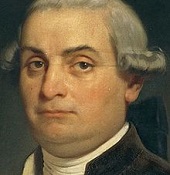
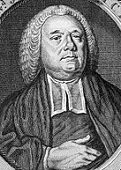




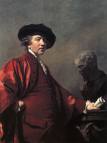



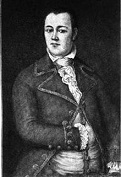


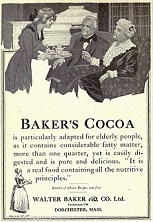



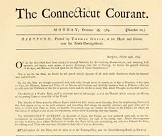


1764 On Feb. 4 as 250-odd Paxton Boys head towards Philly, London-born Penn. gov. (1763-76) John Penn (1729-95) (son of Richard Penn and grandson of William Penn the Man) calls a mass meeting at the State House, organizing military resistance; they reach Germantown, just N of the city on the midnight of Feb. 5, and back down after a delegation of seven city leaders, incl. Ben Franklin meets with them, getting them to agree to return home in return for a promise of more protection from Indian attacks; the gov. then sells Franklin out, giving them amnesty and even instituting a policy promising a bounty for Indian scalps; their split is complete. On Feb. 14 (Valentine's Day) the river town of St. Louis (modern-day pop. 311K/2.9M) on the W bank of the Mississippi River in modern-day Mo. on the border with modern-day Ill. 18 mi. downstream from the confluence of the Missouri River is founded by French fur traders Pierre Laclede (Laclède) (1729-78) and his stepson (common law wife's son) Rene (René) Auguste Chouteau Jr. (1749-1829), and named after French king Louis IX; in 1803 it becomes U.S. territory; it is incorporated in 1822, becoming the 4th largest U.S. city by 1870. In Feb. English essayist Dr. Samuel Johnson (1709-84) and English artist Joshua Reynolds (1723-92) found the (Literary) Club at Turk's coffeehouse in London with nine members, incl. Sir Joshua Reynolds (1723-92), David Garrick (1717-79), Oliver Goldsmith (1730-74), Edmund Burke (1729-97), Edward Gibbon (1737-94), Adam Smith (1723-90), and James Boswell (1740-95); Johnson meets multilingual Welsh writer Hester Lynch Salusbury(1741-1821), who married Southwark brewer Henry Thrale (1724-81) in 1763, and for the next 16 years they all spend weekends on the Thrale estate in Streatham Park; too bad, when Thrale dies she marries Italian musician Gabriel Mario Piozzi (1740-1809) in 1784 (whom Johnson doesn't like) and travels in Italy and vacations in Bath, keeping the Thraliana diary, which is not pub. until 1942, but is used for Thrale's Anecdotes of the Late Samuel Johnson (Mar. 26, 1786) - I don't care how much it may storm, I got my love to keep me warm? In Mar. Franklin pushes a series of 26 resolutions ("a necklace of resolves") calling for the end of propietary govt. in Penn., and for the king "to take the people of this province under his immediate protection and government" from the Proprietors, whom he calls "tyrannical and inhuman"; he fails to gain enough support, but in May becomes the assembly speaker. On Apr. 5 the widely-flouted 1733 Molasses Act about to expire, Lord Grenville gets Parliament to pass the Revenue Act of 1764 AKA the Sugar Act in order to tax the Am. colonies to help pay for a British standing army of 10K to guard against possible French attacks; it renews the duty on molasses, but halves it to three pence per gal. in hopes of putting smugglers out of business, and introduces new taxes on foreign textiles, wines, coffee, indigo and sugar; Grenville hopes to bring in £45K a year to be used "toward defraying the necessary expenses of defending, protecting, and securing, the said colonies and plantations", but only succeeds in angering Americans with its presumption that the Brits could tax Americans without their consent; to rub it in, on Apr. 19 Parliament passes the Currency Act, forbidding the issue of colonial scrip (paper money) by all Am. colonies, not just New England (as dictated in 1751); existing paper money in the colonies is suddenly devalued, adding to their economic shock - the outlawing of colonial scrip is the main cause of the Am. Rev.? The Wilkes Affair, or Don't Touch Off a Royal Touchhole? On Apr. 23 George III gives a speech at the opening of Parliament endorsing the Paris Peace Treaty, after which English radical journalist John Wilkes (1725-97), pub. Issue #45 of The North Briton, criticizing it (a reference to the 1745 Jacobite uprising); although it takes care to designate the speech as the work of a minister, the king goes nonlinear and gets him and 48 others arrested on Apr. 30, but the courts release him since he is a member of the House of Commons, the public getting turned on and chanting "Wilkes, Liberty and Number 45", causing the king to influence it to order him expelled by having a dirty poem he once wrote with Thomas Potter titled An Essay on Woman dragged out and read in the House of Lords by his enemy the earl of Sandwich, who had been the target of one of Wilkes' pranks at the Hellfire Club; meanwhile a former minister forces him into a duel and seriously wounds him, and he flees to France as the cabinet institutes criminal proceedings against him, and he is tried and found guilty in absentia of seditious and obscene libel next Jan. 19, causing the public to be roused on his side and against the increasingly mad king, rioting in London. On June 11 the Sandy Hook Lighthouse begins protecting New York harbor, becoming the oldest lighthouse in the U.S. to survive to modern times. On Sept. 7 after Catherine II the Great of Russia and Frederick II the Great of Prussia sign an agreement to bring pressure on the Polish Diet, they elect her lover as Stanislaus (Stanislaw) II August Poniatowski (1732-98), and he becomes Poland's last king on May 8, 1765 (until Nov. 22, 1795). On Oct. 1 Benjamin Franklin is ousted from the Penn. Assembly, but his faction keeps control and votes to send him back to England to present the petition against the hated Proprietors; he ends up staying another five years. On Oct. 15 after beginning a tour of the Continent in 1763, Oxford-educated (Magdalene College) Edward Gibbon (1737-94) visits Rome, and decides to write its history, taking over 20 years starting in 1772; "It was at Rome, on the 15th of October, 1764, as I sat musing amidst the ruins of the Capitol, while the barefooted friars were singing vespers in the Temple of Jupiter, that the idea of writing the decline and fall of the city first started to my mind." On Oct. 23 the British Bengal army under Maj. Sir Hector Munro (1726-1805) defeat Shuja-ud-Dowla, Nawab of Oudh (Awadah) (1732-77) and Mir Kasim (Qasim), Nawab of Bengal (-1777) at the Battle of Buxar, defeating a force 5x as big, and killing 6K, while only losing four soldiers and two officers, ending the final attempt to maintain an independent Bengal; big hero Munro is promoted to Lt. Col. - hey, dudh, that's a nice nawab? On Oct. 29 the weekly Hartford Courant (originally "The Connecticut Courant") is founded by Thomas Green; in 1776 at the start of the Am. Rev. it is the most popular newspaper in the U.S., although pamphlets get far more circulation, of which most are church sermons; it goes daily in 1837; in 1980 it is acquired by the Times Mirror chain, which is acquired by the Tribune Corp.; the newspaper goes on to adopt the slogan "Older than the nation", and "America's oldest continously published newspaper". Hyder Ali usurps the throne of Mysore. Joseph II, son of Francis I is elected king of the Romans. Deposed 24-y.-o. tsar (1740-1) Ivan VI (b. 1740) attempts to regain the throne, and is murdered in the Fortress of Schusselburg following standing orders given his guards by Tsarina Catherine II, who orders the confiscation of church lands in Russia. Gen. James Murray succeeds Jeffrey Amherst as gov. of Quebec and gov.-gen. of North Am. (until 1768). The British return control of the declining Philippines to Spain. The Jesuits are suppressed in France. New controller-gen. of finances (since Dec. 1763) Clement Charles Francois de Laverdy (1723-93) heads a commission that enacts the Lamberdy Reforms, reforming the civil govt. to reduce the power of royal intendants except in Languedoc. Mass. assembly leader James Otis Jr. (head of the Mass. branch of the Committees of Correspondence) pub. the pamphlet The Rights of the British Colonies Asserted and Proved, causing Lord Grenville to have a subordinate prepare an answer, claiming that everybody in the empire has "virtual representation", whether they get to return a member to Parliament or not, incl. large cities such as Manchester, Birmingham, and Sheffield in England itself, which have no right to elect a member - yah but we're Americans, and have that little ole 3K-mile pond between us? The royal colony of Georgia finally figures out that the exporting biz is the royal road to wealth, and begins rapid growth. London begins the practice of numbering houses. Plans for a settlement around Ft. Pitt in Penn. are adopted, causing settlers to begin moving in during the next decade, although it remains a small community until after the Am. Rev. War. After she turns down Edward Gibbon, Jacques Necker marries poor Swiss girl Susanne (Suzanne) Curchod, who becomes Madame Necker (1737-94), and goes on to give birth to Madame Germaine de Stael (1766-1817), encourage her hubby's govt. career, and found a top lit. salon in Paris, attended by Georges Louis Leclerc, Comte de Buffon (1707-88), Friedrich Melchoir, Baron von Grimm (1723-1807), Gabriel Bonnot de Mably (1709-85), Jean Francois Marmontel (1723-99), Jean Francois de La Harpe (1739-1803), Jacques Henri Bernardin de Saint-Pierre (1737-1814), Jean Le Rond d'Alembert (1717-83), and Denis Diderot (1713-84); "Fortune does not change men, it unmasks them" (Madame Necker); meanwhile Madame Jeanne Julie Eleonore de Lespinasse (1732-76) is kicked out by jealous Madame du Deffand, and founds her own lit. salon in Paris which becomes the home of Jean le Rond d'Alembert, Anne-Robert-Jacques Turgot, and his lit. clique. Mass. atty. John Adams (b. 1735) marries beautiful bodacious well-read Abigail Smith (1744-1818), a descendant of Edward I Longshanks; they have three sons and two daughters, all with one belly button each. Am. Roman Catholic Charles Carroll (1737-1832) returns from study in Paris and London and is presented with the large Carrollton Manor on the Severn River in Md. by his father, causing him to become known as Charles Carroll of Carrollton. After migrating to London in 1762, Johann (John) Christian Bach begins giving popular music recitals. London becomes the first city to number houses. The first living tea plant is brought to Europe in Uppsala, Sweden. Am. Baker's Chocolate Co. (originally Hannon's Best Chocolate) in Lower Mills, Dorchester, Mass. is founded by Am. physician James Baker and chocolatier John Hannon (-1779) to manufacture chocolate for making drinks, making consumers believe the chocolate is made for bakers too?; the business is carried on by James Baker's son Edmund Baker (1770-1846) and his son Col. Walter Baker (1792-1852), who institutes a money-back guarantee and trademarks the name Baker's; in 1849 they begin distribution in Calif.; in 1852 they introduce German's Sweet Chocolate, invented by employee Samuel German, which becomes a hit when the Dallas Morning Star pub. a recipe for German chocolate cake (originally German's Chocolate Cake) on June 3, 1957, adding more confusion to the names after co. owner Gen. Foods reprints the article under the misnomer; in 1883 they adopt the La Belle Chocolatiere logo, based on the painting Das Schokoladenmadchen (The Chocolate Girl) by Swiss artist Jean-Etienne Liotard (1702-89); in 1896 it is acquired by Forbes Syndicate, followed in 1927 by Postum Cereal Co. (Gen. Foods), followed in 1989 by Kraft Foods. A girl is born to the Clement family in Tourcoing, France with only one eye in the center of her forehead (cyclops); she lives to the age of 15 - I see? Sports: The Royal and Ancient Golf Club of St. Andrews, Scotland reduces the number of golf holes from 22 to 18. Architecture: The rebuilding of the 6th cent. Church of St. Genevieve in Paris, later (1793) known as the Pantheon begins on orders of Louis XV. The Tomb of Comte d'Harcourt in Notre Dame in Paris, designed by Jean Baptiste Pigalle is built. Robert Adams designs Kenwood House in Middlesex, England. Inventions: French typefounder Pierre Simon Fournier (1712-68) develops the point system for measuring type sizes. Poor weaver James Hargreaves (1720-78) of Blackburn, England invents the Spinning Jenny, a mechanical spinning wheel that can spin eight threads at once; too bad, the news leaks, causing Luddites to invade his home and destroy it, after which he moves to Nottingham and gets financial backers, and patents it in 1770, only to see patent violators steal him blind. Nonfiction: Robert Adam (1728-92) and Charles-Louis Clerisseau (1721-1820), Ruins of the Palace of the Emperor Diocletion at Spalatro; drawings by Clerisseau; shows Europe how to do Neoclassical right? Mark Akenside, Discourse on the Dysentery. Adam Anderson, The Origins of Commerce. Nicolas Baudeau (1730-92), Idées d'un citoyen sur l'administration des finances du Roi; criticizes Laverdy Reforms for drafting new laws on vagabonds and beggars, arguing that it's more important for the govt. to give alms to the poor than passing laws prohibiting poverty. Cesare Beccaria (1738-94), On Crimes and Punishments (Tratto dei delitti e delle pene); condemns torture and the death penalty, founding the field of Penology (Lat. "poena" + "logia" = punishment + study) along with the Classical School of Penology based on the Enlightenment, incl. Jeremy Bentham, with the slogan: "Man is a calculating animal", meaning that the punishment must fit the crime, incl. being swift, which influences the U.S. Founding Fathers. Charles Bonnet (1720-93), Contemplation de la Nature (1764-5). John Entick (1703-73), Spelling Dictionary (London) (20K copies). Johann Gottfried von Herder (1744-1803), On Diligence in Several Learned Languages; Treatise on the Ode. Thomas Reid (1710-96), An Inquiry Into the Human Mind on the Principles of Common Sense; claims that common sense (sensus communis) is the true foundation of all philosophical inquiry, and that the foundations upon which our sensus communis are built justify our belief that there is an external world, dissing Locke and Descartes; a big hit, getting him Adam Smith's job of prof. of moral philosophy at the commonsensical U. of Glasgow, where he becomes "Hume's earliest and fiercest critic", even though he admires him, founding the Scottish School of Common Sense (Sense Realism), which fuels the Scottish Enlightenment and influences Thomas Jefferson et al., being regarded as more important than Hume into the 1800s. Voltaire (1694-1778), Philosophical Dictionary (Dictionnaire Philosophique); "[The ideal religion]: Would it not be that which taught much morality and very little dogma that which tended to make men just without making them absurd? That which did not order one to believe in things that are impossible, contradictory, injurious to divinity, and pernicious to mankind, and which dared not menace with eternal punishment anyone possessing common sense? Would it not be that which did not uphold its belief with executioners, and did not inundate the earth with blood on account of unintelligble sophism?... which taught only the worship of one god, justice, tolerance and humanity?"; "What conclusion can we draw from all this? That atheism is a monstrous evil in those who govern; and also in lettered men even if their lives are innocent; because from their studies they can affect those who hold office, and that, even if it is not as hateful as fanaticism, it is nearly always fatal to virtue. Above all, let me add that there are fewer atheists today than there have ever been, since philosophers have perceived that there is no vegetative being wihtout germs, no germ with design, etc."; "He who has heard the same thing told by 12,000 eye-witnesses has only 12,000 probabilties, which are equal to one strong probability, which is far from certainty". Johann Joachim Winckelmann (1717-68), History of Ancient Art (Geschichte der Kunst des Alterthums); becomes one of the first books pub. in German to become a Euro-wide hit, founding the discipline of Greco-Roman art history, criticizing Giorgio Vasari for his "cult" of artistic personality, insisting that the real emphasis should be on the views of the learned beholder not the viewpoint of the artists, becoming "the first to distinguish between the periods of ancient art and to link the history of style with world history" (Jacob Burckhardt), distinguishing between Greek, Greco-Roman, and Roman art, and er, holding up Greek art (incl. its depiction of the dangly male form) as the touchstone (pardon my French?) of all art, making fans of Goethe, Heine, Lessing, Schiller, Nietzsche et al., dominating the field of art history until the mid-20th cent. ("the tyranny of Greece over Germany"). Music: Franz Josef Haydn (1732-1809), Symphony No. 22 in E-flat ("The Philosopher"). Wolfgang Amadeus Mozart (1756-91), Symphony No. 1. Jean-Philippe Rameau (1683-1764), Les Paladins (comic opera) (Paris) (Feb. 12). Art: Francois Boucher (1703-70), Allegory of Music. William Hogarth (1697-1764), The Bathos (last engraving). Jean Antoine Houdon, St. Bruno (sculpture). Johann Zoffany (1733-1810), Queen Charlotte and Her Two Eldest Children; in her dresssing room. Plays: Carlo Goldoni (1707-93), Gli Amori di Zelinda e Lindoro (The Love of Zelinda and Lindoro) (comedy). Jean-Francois de La Harpe (1739-1803), Timoleon; a flop. Poetry: Oliver Goldsmith (1730-74), The Traveller. Novels: Horace Walpole (1717-97), The Castle of Otranto (Gothic novel); founds the field of Gothic (supernatural) romance, set in a ruined haunted Gothic castle or abbey filled with secret passages and stairways. Births: British brig.-gen. Sir Charles McCarthy (d. 1824) on Feb. 15 in Cork, Ireland; French immigrant parents named Guerault and MacCarthy; knighted in 1820. Russian chemist Gottlieb Sigismund Constantin Kirchhoff (d. 1833) on Feb. 19 in Teterow, Mecklenburg-Schwerin, Germany. Chinese scholar Ruan (Juan) Yuan (d. 1849) on Feb. 21 in Yanzhou, Jiangsu. U.S. consul to Tunis (1797-1803) Gen. William Eaton (d. 1811) on Feb. 23 in Woodstock, Conn. Russian diplomat Count Carlo Andrea Pozzo di Borgo (d. 1842) on Mar. 8 in Alata (near Ajaccio), Corsica; created count in 1818; big Napoleon hater. Am. surveyor (founder of Youngstown, Ohio) John Young (d. 1825) on Mar. 8 in Peterborough, N.H.; father of Cmdr. John Young Jr (1794-1875), Col. William Clark Young (1799-1893), and George Young (1796-1828). English Whig PM (1830-4) Charles, 2nd Earl Grey (d. 1845) (AKA Viscount Howick from 1806-7) on Mar. 13 in Fallodon, Northumberland; namesake of Earl Grey Tea; faher of the 3rd earl Grey (1802-94). Am. Dem.-Repub. diplomat-legislator and U.S. atty. gen. #7 (1811-4) William Pinkney (d. 1822) on Mar. 17 in Annapolis, Md. British Navy Lt. (abolitionist) (evangelical Christian) John Clarkson (d. 1828) on Apr. 4 in Wisbech; brother of Thomas Clarkson (1760-1846). French marshal Laurent de Gouvion-Saint-Cyr, 1st Marquis de Gouvion-Saint-Cyr (d. 1830) on Apr. 13 in Toul; created marquis in 1827. French printer-dramatist Firmin Didot (d. 1836) on Apr. 14 in Paris; son of Francois Ambroise Didot (1730-1804); brother of Pierre Didot (1761-1853); inventor of the word "stereotype" and stereotyping. German publisher Johann Friedrich Cotta (d. 1832) on Apr. 27 in Stuttgart; descendant of Johann Georg Cotta (1631-92). French "Charles IX" dramatist-poet Marie-Joseph Blaise de Chenier (Chénier) (d. 1811) on Apr. 28 in Istanbul, Turkey; grows up in Carcassone; brother of Andre Chenier (1762-94). Am. U.S. Capitol architect #2 (1815-7) ("the Father of American Architecture") Benjamin Henry Boneval Latrobe (d. 1820) on May 1 near Leeds, West Riding of Yorkshire, England; father of Benjamin Henry Latrobe II (1806-78); emigrates to the U.S. in 1796. German statesman-writer Friedrich von Gentz (d. 1832) on May 2 in Breslau. English Baptist minister Rev. Robert Hall (Jr.) (d. 1831) on May 2 in Arnesby (near Leicester); Baptist minister father; educated at King's College, U. of Aberdeen. British rear adm. William Brown (d. 1814) on May 8 in Leesthorpe Hall, Melton Mowbray, Leicestershire. German sculptor Johann Gottfried Schadow (d. 1850) on May 20 in Berlin; poor tailor father; father of Friedrich Wilhelm Schadow (1789-1862); student of Jean-Pierre-Antoine Tassaert (1727-88); Am. Dem.-Repub. politician-statesman-diplomat Edward Livingston (d. 1836) on May 26 in Clermont, N.Y.; brother of Robert R. Livingston (1746-1813); educated at Princeton U.; U.S. rep. 1795-1801; mayor of New York City (1801-3); serves with Andy Jackson during the Battle of New Orleans; U.S. rep. 1823-9; U.S. sen. 1829-31; U.S. secy. of state 1831-3; minister to France 1833-5. Uruguayan rev. leader ("the Father of Uruguayan independence") Jose (José) Gervasio Artigas Arnal (d. 1850) on June 19 in Montevideo. English boxing champ (1792-5) (Jewish) ("Father of Scientific Boxing") Daniel "Dan" Mendoza (d. 1836) on July 5; first Jewish boxing champ, and first Jew to speak with George III - sit down and shut up? English adm. Sir William Sidney Smith (d. 1840) on July 21 in Westminster. French gen. Louis Baraguey d'Hilliers (d. 1813) on Aug. 13 in Paris; father of Achille Baraguey d'Hilliers (1795-1878). French neoclassical Empire Style architect Charles Percier (d. 1838) on Aug. 22 in Paris; collaborator of Pierre Francois Leonard Fontaine (1762-1853). Am. tobacco-real estate tycoon Pierre Lorillard II (Peter Lorillard Jr.) (d. 1843) on Sept. 7 in New York city. English amateur astronomer (deaf) John Goodricke (d. 1786) on Sept. 17 in Groningen. English Mutiny on the Bounty leader Fletcher Christian (d. 1793) on Sept. 25 in Eaglesfield, Cumberland; husband (1789-) of Maimiti; father of Thursday October Christian (1790-), Charles Christian (1792-), and Mary Ann Christian (1793-1831). Am. statesman-gen. Stephen Van Rensselaer III (d. 1839) on Nov. 1 in New York City; eldest child of Stephen Van Rensselaer II, great-grandson of New York City mayor Stephanus van Cortlandt (1643-1700). Am. Dem.-Repub. Ohio gov. #4 (1810-4) and U.S. postmaster gen. #5 (1814-23) Return Jonathan Meigs Jr. (d. 1825) on Nov. 7 in Middletown, Conn.; educated at Yale U. Spanish-Mexican chemist Andres Manuel del Rio Fernandez (Andrés Manuel del Río Fernández) (d. 1849) on Nov. 10 in Madrid; educated at the U. of Alcala de Henares. German jurist-historian (founder of the German historical school of jurisprudence) Gustav von Hugo (d. 1844) on Nov. 23 in Lorrach, Baden; educated at the U. of Gottingen, and U. of Halle. English "Tales from Shakespeare" writer "Mad" Mary Ann Lamb (d. 1847) on Dec. 3; sister of Charles Lamb (1775-1834); kills her mother with a kitchen knife in 1796. French marshal (1807-) Claude Victor-Perrin, 1st Duke of Belluno (d. 1841) on Dec. 7 in La Marche (Lamarche). Scottish Lord Lt. of Ireland (1807-13) and gov.-gen. of British North Am. (1818-19) Charles Lennox, 4th Duke of Richmond, 4th Duke of Lennox, 4th Duke of Aubigny (d. 1819) on Dec. 9 in Gordon Castle. Am. Federalist politician-atty.-journalist-biographer Theodore Dwight Sr. (d. 1846) on Dec. 15 in Northampton, Mass.; brother of Timothy Dwight IV (1752-1817); cousin of Aaron Burr. Scottish fur trader-explorer Sir Alexander Mackenzie (d. 1820) in Stornoway, Isle of Lewis, Outer Hebrides; his mother dies, and his father takes him to America; knighted in 1802. English Gothic novelist Ann Radcliffe (Ward) (d. 1823) in London; wife of "English Chronicle" ed. William Radcliffe. Am. botanist Zaccheus Collins (d. 1831). Scottish engineer-inventor William Symington (d. 1831) in Leadhills, Lanarkshire. Anglo-German lithographer Rudolph Ackermann (d. 1834) in Schneeberg, Saxony; starts out a saddler like his father; moves to London in 1795. British Adm. Sir Graham Moore (d. 1843) in Glasgow, Scotland; son of Dr. John Moore (1729-1802); brother of John Moore (1761-1809); knighted in 1815. Dutch poet-philosopher-philologist-critic Johannes Kinker (d. 1845). Deaths: Spanish Benedictine scholar Benito Jeronimo Feijoo y Montenegro (b. 1676) on Aug. 26 in Oviedo, Asturias. French opera composer Jean-Philippe Rameau (b. 1683) on Sept. 12 in Paris (fever); buried in St. Eustache Church; lives like a miser with one pair of clothes and one worn-out harpsichord, along with a bag containing 1,691 gold louis; leaves the unfinished opera Les Boreades (Boréades) (The Descendants of Boreas); libretto by Louis de Cahusac (1706-59): "I try to conceal art with art." Jewish rabbi and Qabbalist Yonason Eybeshitz (b. 1690). German mathematician Christian Goldbach (b. 1690) on Nov. 20 in Moscow. Italian composer Pietro Antonio Locatelli (b. 1695). English satirical artist William Hogarth (b. 1697) in London; his monument features an epitaph written by friend David Garrick - oh if he had lived into the 1780s? Norwegian bishop Erik Pontopiddan (b. 1698) on Dec. 20 in Copenhagen. French gov. of Guadeloupe (1763-4) Gen. Francois-Charles de Bourlamaque (b. 1716) in Guadeloupe. French celeb. Madame de Pompadour (b. 1721) on Apr. 15. Chinese novelist Cao Xueqin (b. 1724) (d. 1763?) in Beijing. English poet Charles Churchill (b. 1731) on Nov. 4 in Boulogne, France. Russian tsar (1740-1) Ivan VI (b. 1740) (murdered).

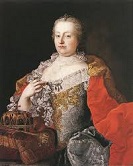




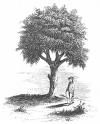


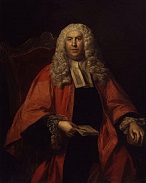














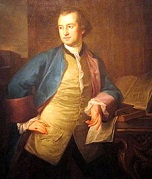



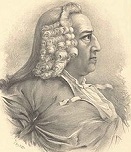
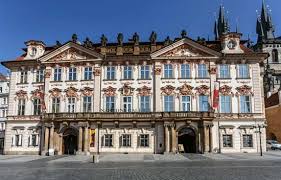
1765 On Feb. 13 after Lord Grenville, needing more money to maintain the 10K troops stationed in the American colonies, and wanting a tax affecting all the colonies, not just New England, devises a new stamp tax, and presents it to colonial agents in London, who unanimously protest it, but fail to offer an alternative or agree on the proportions to be raised by each colony, while Benjamin Franklin representing four colonies, failing to sense the danger, makes a big boo boo and proposes one of his friends as a stamp agent, Grenville lays his proposal before Parliament, where only three speeches are given in opposition, including the big one by Dublin-born barrel-of-fun Col. Isaac Barre (Barré) (1726-1802) (son of a French refugee), who says that past British agents sent out to them "caused the blood of these Sons of Liberty to recoil within them"; on Mar. 22 Britain passes the Stamp Act of 1765 to tax American colonists, to go into effect on Nov. 1; it requires that govt. stamps be paid for in silver and used on almost all legal documents, many commercial papers such as ship clearance papers, newspapers and pamphlets, almanacs, deeds, diplomas, even dice and playing cards; this is the first direct British tax on the colonies, and public outrage causes royal officials to be attacked by mobs, agreements to be struck among merchants to boycott British goods, and the convening of the Stamp Act Congress; radical sentiment is crystalized, and new leaders arise, including young merchant John Hancock(y), Samuel Adams, and his lawyer cousin John; in London, Ben Franklin's waffling over the Stamp Act arouses public suspicion that he had a hand in framing it, and his ass becomes grass and they want to mow it. On Mar. 24 Parliament passes the Quartering Act, requiring the Am. colonies to supply British troops with provisions and to barrack them or allow their use of inns and vacant bldgs.; New York City, the HQ of the British forces is hardest hit with this new tax as they see it as supporting a standing occupation army to oppress them. On May 7 the HMS Victory, Lord Nelson's future flagship (begun 1759) is launched. Wake up people, stop it? On May 13 after "real Whig" Patrick Henry wins a seat on the Va. House of Burgesses, and gives a series of "torrents of sublime eloquence", they pass the Virginia Resolves, claiming that as Englishmen, Virginians can only be taxed by their own reps. and governed by laws passed with their own consent; on May 29 Henry turns it up by giving a speech to the Va. Provincial Convention calling for revolution: "Caesar had his Brutus, Charles the First his Cromwell, and George the Third..."; interrupted by cries of "Treason!", he replies, "If this be treason, make the most of it", and then utters the immortal soundbye, "But as for me, give me liberty, or give me death!" On June 8 the Mass. House of Reps. issues a circular letter inviting all colonial assemblies to send delegates to a New York conference to appeal against the Stamp Act; Mayflower descendant James Warren (1726-1808) of Plymouth becomes a Mass. rep., rising to speaker and pres., then ending up as George Washington's paymaster; his wife Mercy Otis Warren is a brain babe who later becomes a propagandist for the rebel side. Treaty of Paris hero Henry Fox, 1st Baron Holland is forced to resign as paymaster gen., and in 1769 charges of misuse of public funds are brought against him, but the proceedings are stayed by the intervention of George III; meanwhile this year George III has his first brief attack of insanity, and his illness causes a regency bill to be passed by Parliament, arousing his wrath and causing him on July 13 to replace George Grenville with "Old Whig" (pro-colonist) Charles Watson-Wentworth, 2nd Marquis of Rockingham (1730-82) as PM (until July 30, 1766); Pitt refuses to give the new cabinet his support; Rockingham resolves to repeal the Stamp Act, but needs time; Edmund Burke (1729-97), who returned to London in 1764 becomes Rockingham's private secy. (until 1766) - Rocky, watch me pull a rabbit out of my hat? On July 18 Philip of Spain, duke of Parma (b. 1720) dies, and his son Ferdinand I de Bourbon (1751-1802) becomes duke of Parma and Pacienza (until Oct. 9, 1802), going on to refound U. of Parma as a state univ. and endow it with loot confiscated from the Jesuits. In July Leopold Mozart brings his two wunderkids to London, and makes the boo-boo of cheapening them by having them perform in the Cornhill Tavern, ruining their value as exclusive toys of the aristocracy with Empress Maria Theresa, who utters the soundbyte "These people go about the world like beggars", and turning Wolfgang Amadeus Mozart into a lifelong outcast who can never get a good aristocratic appointment, forcing him to keep coming back to the petty bourgeois for biz. Would you have a stamp on ya? On Aug. 14 the Liberty Tree in Boston, Mass. (a great elm in Hanover Square) (1646-1775) is dedicated; the militant Sons of Liberty, founded by Alexander McDougall (1731-86), John Lamb (1735-1800), Marinus Willett (1740-1830) et al. to flout the Stamp Act meet underneath it; the Charleston Liberty Tree in S.C. is a live oak. On Aug. 18 HRE (since Sept. 13, 1745) Francis I (b. 1708) dies at the Innsbruck wedding of his son Joseph II (1741-90) (one of 16 children of Empress Maria Theresa), who becomes HRE (until Feb. 20, 1790), the first of the House of Hapsburg-Lorraine; he is controlled by his mother, who acts as co-regent, uttering the soundbyte "I'd personally lead my troops into battle if I wasn't always pregnant". In mid.-Aug. an effigy of Boston's stamp agent is swung from the Liberty Tree, and in the evening a mob carries it through the streets, burns it in front of the stamp office, and destroys it too; another mob sacks the home of lt. gov. (since 1758) Thomas Hutchinson (1711-80) and a local customs officer, causing the latter to resign; stamp agents throughout the colonies are hounded out office. In late Sept. a mob gathers at a Philly coffeehouse, accusing Ben Franklin of supporting the hated Stamp Act, then tries to level his new house, which is saved by the White Oak Boys. On Oct. 7-25 the Stamp Act Congress, consisting of 27 delegates from nine colonies meets in New York, and on Oct. 18 draws up a Declaration of Rights and Grievances of the Colonies, a petition to the mad king for relief, along with a petition to Parliament for repeal of the Stamp Act, acknowledging that the colonies owe "due subordination" to Parliament, and recognize their right to regulate colonial trade, but first officially bringing up the question of the constitutional power of Parliament to levy taxes, which they claim are a free gift granted by the people through their representatives; they leave England no choice but either handle the truth and withdraw the Stamp Act or use force on them and roll the dice - the ball is in their court? On Oct. 31 the Pennsylvania Journal appears sporting a skull and crossbones on its masthead where the stamp is supposed to go to protest the Stamp Act, which is to take effect on Nov. 1; by now the act is a dead letter, and the American boycott of British goods puts on the screws; in the place of British tea the colonists drink sage and sassafras, and wear homespun garments as a symbol of defiance - the first hippies? On Nov. 1 a crowd protesting the Stamp Act approaches the coach of N.Y. gov. Cadwallader Colden, seizes it and adds it to their parade, smashing it and using it in their Bowling Green bonfire. In Nov. the Privy Council officially defers action on Franklin's anti-Penn petition, effectively killing it. Dauphin Louis dies, and his son Louis Augustus (future Louis XVI) becomes heir to the French throne - the next head of the nation? On Dec. 20 Jesuit-dominated French dauphin Louis Ferdinand (b. 1729) dies of consumption, and his son Louis-Auguste, Duc de Berry (b. 1754) becomes the new dauphin (later Louis XVI). The British Parliament buys the Manx-speaking Isle of Man, whose capital Douglas is sited at the confluence of the Dhoo and Glass Rivers - watch those tails, men? Kekaulike Kalani-nui-Kui-Hono-i-Kamoku dies, and his son Kahekili (Kane-Hekili) (Kahekilinui'ahumanu) II (1737-94) succeeds his brother Kamehameha-nui'Ailu'au as king (Mo'i) #2 of Maui, Lanai, and Molokai, going on to conquer Oahu king Kahahana and kill most of the other Oahu chiefs to end the Waipi'o-Kimopo Insurrection, building a house of bones with their skeletons, and wield influence on Kauai (Kaua'i) through his brother Kaeokulano, consort of Queen Kamakahelei; he is the real father of Kamehameha I? Kremenchug on the Dnieper River 160 mi. SE of Kiev becomes the capital of New Russia (until 1789). Robert Clive enacts his first admin. reforms in Bengal. The British East India Co. takes control of India and establishes a trade monopoly, taxing the pop. then using the revnues to purchase goods, allowing it to steal $45T by 1938? Philippines gov. Francisco Leandro de Viana (1730-1804) (a Basque) attempts reforms to increase agriculture, trade, and Spanish immigration. After the French depart, British trader (first with a license to collect Wisc. pelts) Alexander Henry visits the Ojibwe, and collects pelts in Lake Superior Wisconsin (Ouisconsin) (Mescousing) ("grassy place" in Chippewa) (until 1766). Rumford, N.H. (founded 1659) is renamed Concord, N.H. by gov. Benning Wentworth named in honor of the peaceful resolution of a boundary dispute with the town of Bow. The Portuguese found the town of Bissau at the mouth of the Geba River in W Africa as a fort. A pirate is hanged on Gibbet Island, known as Oyster Island by the Dutch, and later called Ellis Island after New York City merchant Samuel Ellis buys it later this cent. The Bank of Prussia is founded by Frederick II the Great. A free school for girls is founded in Blackburn, England. George III names John Bartram the royal botanist in America. The Physiocrat journal Ephemerides du Citoyen is founded in France by Roman Catholic theologian-economist Nicolas Baudeau (1730-92) (until 1772, then 1774-6); it starts out opposing the Physiocrats before flopping next year. Journal de l'Agriculture, du Commerce et des Finances is founded in France to promote the ideas of the Physiocrats (until 1774). Rococo painter Francois Boucher (1703-70), who designed pastrol scenes for the Beauvais tapestry factory in 1734-55 and the Paris Gobelin factory in 1755-65 becomes court painter at Versailles, and dir. of the Royal Academy. Chocolate is introduced to British Am. from the West Indies by Irish-born John Hanan in Dorchester, Mass. - too little too late for its calming effect to work on pesky rebel brains? The British Army builds a brewery at Ft. Pitt, becoming the first brewery W of the Alleghenies; meanwhle a brewery is built in the French colonial settlement of Kaskaskia, Ill., becoming the first brewery outside the 13 colonies. Gyorgy Bessenyei (1747-1811) is chosen along with other young nobles to man Empress Maria Theresa's Hungarian bodyguard in Vienna, and goes on to form a lit. circle based on French classicism which creates a Hungarian Renaissance. The French "Encyclopedie" finally beats the censorship and gets pub., with supplements added until 1780. Philly physician John Morgan (1735-89) founds the Medical College at the U. of Penn., becoming the first medical school in the U.S. Boulanger begins selling "restaurants", reinvigorating plain broths at the corner of Rue Bailleul and Rue des Poulies in Paris, becoming the original soup Nazi, becoming the first to print a menu offering a selection of foods and liquors instead of "Ordinaries", regular meals at a common table at a fixed time and price; within a few years restaurants expand to gen. health foods then ordinary food. The hype that scientists are lunatics is started by themselves? The Lunar Society (Circle), a dinner club for intellectuals begins meeting in Birmingham, England (until 1813), always during a full moon to make the journey safer; the members call themselves lunaticks, and incl. English engineer Matthew Boulton (1728-1809) (who befriends James Watt in 1767, and becomes his main financial backer), English scientist Erasmus Darwin (1731-1802) (grandfather of Charles Darwin), Scottish scientist James Keir (1735-1820), Joseph Priestley (1733-1804), Thomas Day (1748-89), and Josiah Wedgwood (1730-95); Benjamin Franklin visits them several times, and Antoine Lavoisier corresponds with them. Johann Wolfgang von Goethe (b. 1749) begins studying law at Leipzig (until 1768), where he has his first love affair with Anna Katharina Schonkopf, daughter of the tavern owner, writing a play about her. Dr. Samuel Johnson moves in with wealthy brewer Henry Thrale and his wife Hester in London, and they began going on trips to Bath, Brighton ("London by the sea"), N Wales, and France. The Yellow Bartlett Pear is discovered in England by schoolmaster Mr. Stair, and later called Williams' Bon Chretien, then exported to the Roxbury, Mass. in 1799 by Thomas Brewer, whose estate is purchased by Enoch Bartlett, and he wins the name game. Architecture: The Rococo Kinsky (Golz-Kinsky) Palace in Prague, Czech. (begun 1755) by Bohemian Baroque architect Kilian Ignaz Dientzenhofer (1689-1751) is finished. Inventions: In May Scottish inventor James Watt (1736-1819) invents the dual condenser steam engine (one hot and one cold) (patented in 1769), which cuts fuel consumption in the Newcomen steam engine by two-thirds, giving steam engines up to 7% efficiency, thus making them practical; he coins the marketing term "horsepower", and the Industrial Rev. in England (ends 1840) is cooking with steam. Norman chef Jean-Joseph Close (1757-1828) begins producing the first Pate de Fois Gras in Strasbourg, and in 1782 begins serving it with truffles for Alsace gov. Marechal de Contades - lucky him? Lazzaro Spallanzani (1729-99) of Italy discovers hermetic sealing as a means of preserving food - I no wanna lazzaro spoil la lasagni? Nonfiction: Sir William Blackstone (1723-80), Commentaries on the Laws of England (Nov.) (4 vols.) (1765-9) (Clarendon Press); incl. vol. 1 (rights of persons), vol. 2 (rights of things), vol. 3 (private wrongs), and vol. 4 (public wrongs); becomes the std. textbook for English and U.S. legal ed. for the next cent., later used by the Am. Founding Fathers and quoted from in opinions of the U.S. Supreme Court. Denis Diderot (1713-84), Jacques the Fatalist and His Master (1765-80); pub. posth. in 1796; "Everything that happens to us down here, whether for good or for evil, has been written up above" on a "great scroll" that is unrolled little by little. Daniel Dulany, Considerations on the Propriety of Imposing Taxes in the British Colonies for the Purpose of Raising a Revenue by Act of Parliament; a reply to Lord Grenville by a Md. atty., claiming that England is too far away from America for any of its MPs to have common interests or for colonists to influence them. Stephen Hopkins (1707-85), The Rights of the Colonies Examined; written by the gov. of Rhode Island (1755-68); attacks the Stamp Act, becoming a hit and getting reprinted in London; History of the Planting and Growth of Providence; written for the Providence Gazette, which he founded. Johann Gottfried von Herder (1744-1803), How Philosophy Can Become More Universal and Useful for the Benefit of the People. Dr. Samuel Johnson (1709-84) and George Stevens (1736-1800), The Plays of William Shakespeare (8 vols.) (Oct. 10); contains Johnson's famous Preface. William Kenrick (1725-79), A Review of Dr. Johnson's New Edition of Shakespare; In Which the Ignorance, or Inattention, of that Editor is Exposed, and the Poet Defended from the Persecution of his Commentators. Gottfried Wilhelm Leibniz (1646-1716), New Essays on Human Understanding (posth.); a refutation of John Locke's 1690 work, written in 1695-1705, but withheld from pub. because of Locke's 1704 death. Gabriel Bonnot de Mably (1709-85), Histoire de France; 2nd ed. pub. posth. in May 1789, becoming a big hit, advocating communism and republicanism, causing the govt. to unsuccessfully try to suppress it weeks before the start of the French Rev. Christoph Friedrich Nicolai (1733-1811), Allgemeine Deutsche Bibliothek (Berlin); popular philosophy. Tobias George Smollett (1721-71) and David Hume (1711-76), A Compleat History of England (3 vols.) - what every English novelist would like to write when sales are slack? Jonathan Swift (1667-1745), Thoughts on Religion (posth.); "It is impossible that any thing so natural, so necessary, and so universal as death, should ever have been designed by Providence as an evil to mankind." Music: Wilhelm Friedemann Bach (1710-84), Twelve Polonaises; finished after walking off his 1762 job of Kapellmeister in Darmstadt last year, after which he wanders around in Braunschweig and Berlin and ends up dying broke. Art: Francois Boucher (1703-70), The Dispatch of the Messenger; Virgin and Child with Young John the Baptist; Allegory of Painting; Halt at the Spring. Ignacio Chacon, Madonna and Child with Bird; used on a U.S. 39-cent Christmas stamp in 2006. John Singleton Copley (1738-1815), Henry Pelham (Boy with a Squirrel). Jean-Honore Fragonard (1732-1806), Coresus et Callirhoe (Corésus et Callirhoé). Jean-Baptiste Greuze (1725-1805), La Bonne Mere (Mére). Francesco Guardi (1712-93), The Lagoon Looking Towards Murano from the Fondamental Nuova (1765-70). Soga Shohaku (1730-81), Mt. Fuki and Miho no Matsubara (folding screen); first rep of a rainbow in Japanese art. Richard Wilson (1714-82), Lake Avernus I. Plays: Samuel Arnold (1740-1802) and Isaac Bickerstaffe (1733-1812), The Maide of the Mill (London); a hit. Johann Wolfgang von Goethe (1749-1832), Die Laune des Verliebten (1-act verse comedy). Carlo Goldoni (1707-93), Il Ventaglio (The Fan) (comedy). Jean-Francois de La Harpe (1739-1803), Pharamond; a flop. Michel-Jean Sedaine (1719-97), Philosophie sans le Savoir (Theatre Francais); becomes a classic, along with his next one in 1768. Frances Sheridan (1724-66), The Dupe. Christoph Martin Wieland (1733-1813), Don Sylvia von Rosalva; imitation of Don Quixote. Poetry: Thomas Chatterton (1752-70), Rowley. George Colman the Elder, The Comedies of Terence, Translated into Familiar Blank Verse. James Macpherson (1736-96), The Works of Ossian. William J. Mickle, The Concubine. Bishop Thomas Percy (1729-1811) and William Shenstone (1714-63), Reliques of Ancient English Poetry (3 vols.) (London); first great English ballad collection; fuel for the Romantics; incl. "The Ballad of Chevy Chase", "Robin Hood and Guy of Gisborne". Novels: Oliver Goldsmith (1728-74), The History of Little Goody Two-Shoes (Apr.); printed by John Newbery; the first children's pop-up book; big bestseller; a poor child with only one shoe gets a new pair and exclaims you know what? Marie-Jeanne Riccoboni (1713-92), The Story of Ernestine (L'Histoire d'Ernestine) ; her masterpiece? Births: U.S. Supreme Court justice #16 (1807-26) Thomas Todd (d. 1826) on Jan. 23 in King and Queen County, Va.; educated at Washington and Lee U. Am. "Father of Huntsville" settler LeRoy Pope (d. 1844) on Jan. 30 in Northumberland County, Va.; distant relation of Alexander Pope. Russian mathematician Timofei Fedorovic Osipovsky (d. 1832) on Feb. 2. Italian Neoclassical painter Francesco Alberi (d. 1836) on Mar. 3 in Rimini; student of Domenico Corvi (1721-1803). French physicist and photography pioneer Nicephore (Nicéphore) (Joseph) Niepce (d. 1833) on Mar. 7 in Chalon-sur-Saone, Saone-et-Loire. Dutch gen. David Hendrik, Baron Chasse (Chassé) (d. 1849) on Mar. 18 in Tiel. French mathematician Sylvestre Francois Lacroix (d. 1843) on Apr. 28 in Paris. English Sanskrit scholar-mathematician ("first great Sanskrit scholar in Europe") Henry Thomas Colebrooke (d. 1837) on June 15 in London. French Gen. Pierre-Antoine, Dupont l'Etang (l'Étang) (d. 1840) on July 4 in Chabanais, Charente. French marshal Count Jean-Baptiste Drouet d'Erlon (d. 1844) on July 29 in Reims. English "Sailor king" (1830-37) William IV (d. 1837) on Aug. 21 in Buckingham Palace, London; 3rd son of George III (1738-1820) and Charlotte (1744-1818); younger brother of George IV (1762-1830); becomes a midshipman in 1779 under Adm. Digby. Italian mathematician-philospher Paolo Ruffini (d. 1822) on Sept. 22 in Valentano. Am. super-rich Federalist leader (Unitarian) Harrison Gray Otis (d. 1848) on Oct. 8 in Boston, Mass.; educated at Boston Latin School, and Harvard U. German "Romeo et Juliette" composer-pianist Daniel Gottlieb Steibelt (d. 1823) on Oct. 22 in Berlin. French mathematician-engineer Pierre-Simon Girard (d. 1836) on Nov. 4 in Caen. Am. steamboat inventor Robert Fulton (OE "settlement of the fowl", "people's estate") (d. 1815) on Nov. 14 in Little Britain, Lancaster County, Penn.; studies painting in England with Benjamin West from 1787-93, then turns to inventing. French Napoleonic marshal Etienne Jacques Joseph Alexandre MacDonald, 1st Duc de Taranto (d. 1840) on Nov. 17 in Sedan; Scottish Jacobite immigrant father; relative of Flora MacDonald. English composer-organist Thomas Attwood (d. 1838) on Nov. 23 in London; not to be confused with politician Thomas Attwood (1783-1856). Am. surveyor Israel Ludlow (d. 1804) near Morristown, N.J. Russian gen. Prince Pyotr Ivanovich Bagration (d. 1812) (pr. ba-gra-tee-oh-nee) in Kizlyar (Dagestan), Northern Caucasus; of Georgian descent; brother of Roman Bagration (1778-1834). British explorer rear adm. Peter Puget (d. 1822). English classical scholar-lexicographer John Lempriere (d. 1824) in Jersey; educated at Pembroke College, Oxford U. English steam locomotive inventor Matthew Murray (d. 1826) in Newcastle-upon-Tyne. English chemist James Smithson (d. 1829); founder of the Smithsonian Inst. in Washington, D.C. German "Fundamental Biogenetic Law" naturalist K.F. Kielmeyer (d. 1844). English "Lectures on Modern History" poet-historian William Smyth (d. 1849) in Liverpool; son of Thomas Smyth (1737-1824); educated at Eton College, and Peterhouse, Cambridge U. French publisher Henri Didot (d. 1852); son of Pierre Francois Didot (1732-93); known for minute eds. of std. works in microscopic type. Deaths: English poet Edward Young (b. 1683) on Apr. 5 in Welwyn: "Too low they build who build below the skies." Irish writer Samuel Madden (b. 1686) on Dec. 31. British antiquarian William Stukeley (b. 1687) on Mar. 3. English politician Lionel Cranfield Sackville, 1st duke of Dorset (b. 1688) on Oct. 10. English poet David Mallet (b. 1705). Russian chemist and universal thinker Mikhail Lomonosov (b. 1711) on Apr. 15; discovers that mercury freezes at -40 deg C. English composer John Hebden (b. 1712). German poet Christian Reuter (b. 1712). French mathematician-astronomer Alexis Claude Clairaut (b. 1713) on May 17 in Paris. Spanish duke of Parma (1748-65) Philip of Spain (b. 1720) on July 18 in Alessandria, italy. English military leader Prince William, duke of Cumberland (b. 1721) on Oct. 31 in London (heart attack). French dauphin Louis Ferdinand (b. 1729) on Dec. 20 in Fontainebleau; his tomb in the Cathedral of Sens is designed by Guillaume Coustou the Younger.



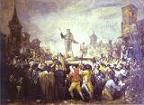










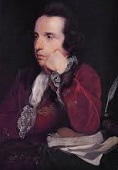


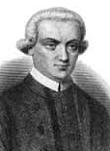


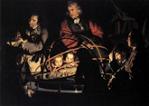
1766 On Jan. 1 James Francis Edward Stuart (Stewart) (b. 1688), the Old Pretender dies, and his eldest son (the Young Pretender) Charles Edward Stuart (1720-88) AKA Bonnie Prince Charlie settles in Rome as the self-styled Count of Albany; in Jan. Pope Clement XIII recognizes the Protestant Hanoverian Dynasty as the lawful rulers of England, Scotland, and Ireland, permanently dashing the hopes of the Roman Catholic Jacobites. On Jan. 14 Danish-Norwegian king (since 1746) Frederick V (b. 1723) dies, and mad Christian VII (1749-1808) becomes king of Denmark and Norway (until Mar. 13, 1808). In Jan. Parliament convenes, and William Pitt demands that the Stamp Act be repealed "absolutely, totally, and immediately", while at the same time demanding that Parliament assert its authority over the colonies "in as strong terms as possible"; Rockhingham tries a mind game with Parliament, claiming that the colonies accept the principle of "external" taxes, but only reject the "internal" kind; Ben Franklin goes along, begins pamphleting against it in the same terms, and gives a brilliant rehearsed speech on Feb. 13 before Parliament, answering 174 questions directed at him, and forever cementing his rep as America's foremost spokesman as he does their talking for them; after English merchants put in their complaints about losses resulting from the American non-importation agreements, the Stamp Act is repealed as unenforceable on Mar. 18, but to save face Parliament passes the Declaratory Act of Mar. 18, 1766, asserting its constitutional right to tax the colonists when it pleases, but not wording it that way, instead asserting its power to make laws binding on them "in all cases whatsoever"; to foment further trouble, Rockingham reduces the molasses tax from three to one pence per gallon; Franklin's stock rises, and he is soon named the agent for Ga., N.J., Mass., and Penn. Antonio de Ulloa (1716-95) arrives in New Orleans to become the first Spanish gov. of West La.; too bad, the French colonists refuse to be ruled by Spics, and he is expelled in 1768 by a Creole uprising. In Mar. after he gets away with forcing the pop. of Madrid to quit throwing their slops out of their windows by saying that they are like children who cry when their faces are washed, Charles III goes too far and tries to force them to adopt French dress, causing the Esquilache Riots, during which he hides in Aranjuez and lets his ministers handle it, after which he blames the Jesuits and vows to 'get' them. On Apr. 10 Etienne de Choiseul absorbs his cousin Cesar Gabriel de Choiseul's job as foreign minister, and the latter becomes navy secy. (until Dec. 24, 1770); too bad, when their protector Madame Pompadour dies next year, both of them begin to lose their grip in Louis XV's court, and both are out by 1770. On July 18 Voltaire writes The Death of the Chevalier de la Barre, protesting the barbarous death sentences handed out to some people for blasphemy. On July 30 British PM (since July 13, 1765) Lord Rockingham is dismissed as Lord Treasurer after a quarrel over appointments; the king then invites Whig William Pitt the Elder to become PM (until Oct. 14, 1768) form a weak coalition cabinet which incl. different Whig groups, Tories and King's Friends (which Edmund Burke compares to pigs swilling at a trough); in ill health, William Pitt the Elder, "the Great Commoner" is created Earl of Chatham in Kent County, and moves from the House of Commons to the House of Lords, then accepts the sinecure office of Lord of the Privy Seal; Charles Townshend (1725-67) (of whom Horace Walpole says his "abilities are superior to those of all men, and his judgement below that of any man") becomes Chancellor of the Exchequer, and a guiding force in the ministry, who now has the fate of the Am. colonies in his hands. In Sept. the Bread and Butter Riots caused by poor harvests rock England, and the British council prohibits the exportation of grain, getting censured in debate in the House of Commons, who fail to outvote them, after which the cabinet becomes unpopular with them; meanwhile, idle students at Harvard College, led by Asa Dunbar (maternail grandfather of Henry David Thoreau) hear about it and stage the Bread and Butter Protest, crying "Behold, our butter stinketh", causing all 155 students to be expelled. James Murray is replaced by Sir Guy Carleton (1724-1808) as gov. of Quebec and gov.-gen. of British North Am. (until 1778). With the colonists taking the fight out of the British, Chief Pontiac signs a truce with the British and is pardoned. N.C. farmers organize Regulators to stop govt. agents from seizing their property when they try to pay taxes with produce and fail to get them to issue paper money. There is a famine in Bengal. The British occupy the Falkland Islands. Stanislas Leszczynski (b. 1677) dies, and the Duchy of Lorraine in NE France (founded in 959) is incorporated into France as a province, with Nancy remaining as its capital - double-crossed? Edmund Burke becomes a MP for Wendover, his eloquence soon gaining him the rep of "the first man in the Commons". Nizam Ali of Hyderabad cedes Northern Circars in Madras to Britain. Tyre, ruined since 1291 is settled by Persian Shiite Metaweleh (Matawila) schismatics, who rebuild it. Catherine II the Great grants freedom of worship in Russia - provided they grant her freedom of sex with her guardsman with the face of Adonis and body of Hercules? Roman Catholic father ? Sterzinger defends Benjamin Franklin's lightning rod from the theory that thunder and lightning are caused by demons, with the soundbyte: "For his lightning-rod did what exorcisms, and holy water, and processions, and the Agnus Dei, and the ringing of church bells, and the rack, and the burning of witches, had failed to do. This was clearly seen, even by the poorest peasants in eastern France, when they observed that the grand spire of Strasburg Cathedral, which neither the sacredness of the place, nor the bells within it, nor the holy water and relics beneath it, could protect from frequent injuries by lightning was once and for all protected by Franklin's rod. Then came into the minds of multitudes the answer to the question which had so long exercised the leading theologians of Europe and America, namely, 'Why should the Almighty strike his own consecrated temples, or suffer Satan to strike them?'" English explorers Samuel Wallis (1728-95) of the HMS Dolphin, and Philip Carteret (1733-96) of the HMS Swallow begin sailing the Pacific in search of the fabled Southern Continent (ends 1769); after passing the Strait of Magellan they split up, and Wallis discovers Tahiti, while Carteret discovers Pitcairn Island and the Carteret Islands; Wallis names or renames 5+ islands in the Society Islands along with six atolls in the Tuamoto Islands; Wallis renames Uvea Island after himself before reaching Tinian in the Mariana Islands, then travels to Batavia, where most of his crew die from dysentery, arriving back in England in May 1768, giving useful info. to Capt. James Cook for his Pacific voyage. Cockburn Town on Grand Turk Island (founded 1681) becomes the capital of Turks and Caicos Islands (TCI). The Dutch Reformed Queen's College (later Rutgers U.) is founded in New Jersey. The first paved sidewalk is laid in Westminster, London. Prussia gains a tobacco monopoly. The St. Cecilia [Musical] Society is founded in Charleston, S.C. (until 1912), hosting an annual concert series for the next 54 years, the most sophisticted in North Am. The Theatre Royal in Bristol opens, becoming the oldest British theater to survive to modern time. 16-y.-o. Italian composer Antonio Salieri (b. 1750) moves to Vienna, and rises to Joseph II's court composer - until he first hears Mozart's music and is overcome by its beauty, believing he's heard the voice of God? French chemist Antoine Laurent Lavoisier (b. 1743), member of the Academy of Sciences since 1768 becomes dir. of the French state gunpowder works. Southwark Theater in Philadelphia, Penn. opens, becoming the first permanent theater in the Am. colonies, starting out with Shakespeare's "Katharine and Petruchio" (The Taming of the Shrew). Inventions: On Apr. 8 the first fire escape is patented, consisting of a wicker basket on a pulley and chain. London engraver-mapmaker John Spilsbury (1739-69) invents the jigsaw puzzles, a set of world maps. Science: Carl Linnaeus first describes the Am. Robin (Turdus migratorius = thrush + to go). English scientist Henry Cavendish (1731-1810) studies hydrogen ("inflammable air"), named in 1787 by French chemist Louis-Bernard Guyton de Morveau (1737-1816) (from the Gr. for "water producing" when it burns), learns how to produce it, and discovers that it is lighter than air, and forms water on combustion, with the soundbyte "Water consists of dephlogisticated air [oxygen] united with phlogiston [hydrogen]." German mathematician Johann Daniel Titius (1729-96) discovers a pattern in planetary distances, namely that they are in the proportions 4, 7, 10, 16, 28, 52, 100, 196, which happens to be the series 0, 3, 6, 12, 24, 48, 96, 192 with 4 added to each; in 1772 German astronomer Johann Elert Bode (1747-1826) pub. it for the 1st time, causing it to become known as the Bode (Titius-Bode) Law of Planetary Distances; the discovery of Uranus in 1781 checks with the number 196, and the discovery of the asteroid Ceres (orbiting between Mars and Jupiter) in 1801 checks with the missing number 28, however Neptune (388) and Pluto (722) don't pan out, and the Titillating Bogus Law is dismissed as moose hockey (coincidence). Nonfiction: Jean-Sylvain Bailly (1736-93), Essay on the Theory of the Satellites of Jupiter; expanded ed. of his hit memoir presented to the French Academy of Sciences in 1763 at his election. Richard Bland II (1710-76), An Inquiry into the Rights of the British Colonies; House of Burgesses member (later delegate to the Continental Congress) proposes the concept of "no taxation without representation"; his cousin Thomas Jefferson calls it "the first pamphlet on the nature of the connection with Great Britain which had any pretension to accuracy of view on that subject... There was more sound matter in his pamphlet than in the celebrated Farmer's letters." Denis Diderot (1713-84), Essai sur la Peinture (Essay on Painting). Adam Ferguson (1723-1816), Essay on the History of Civil Society. Heinrich Wilhelm von Gerstenberg (1737-1823), Briefe uber die Merkwurdigkeiten der Literature; the principles of Sturm und Drang. Gotthold Lessing (1729-81), Laokoon (Laocoon): An Essay on the Limits of Painting and Poetry; resident Hamburg Nat. Theatre critic criticizes art historian Johann Joachim Winckelmann's views, analyzing the arts of poetry, sculpture, and painting, defining the limits of each after demonstrating how Aristotelian principles can be applied, and insisting that a work's individual inherent character should govern its worth rather than rigid classical absolute categorical laws, thereby emancipating German art and lit. from French neoclassicism, founding the first "modern" (romantic) school of art criticism - he just wants to make the West safe for decadent porno? Henrik Gabriel Porthan, Dissertatio de Poesi Fennica (5 vols.) (1766-78); history of Finland. Tobias Smollett (1721-71), Travels Through France and Italy. George Stubbs (1724-1806), The Anatomy of the Horse; results of 18 mo. in 1754-5 in Horkstow, Lincolnshire dissecting horses. Girolamo Tiraboschi (1731-94), Vetera Humiliatorum Monumenta (3 vols.); a history of the extinct Humiliati order, establishing his rep. Music: Andre Gretry (1741-1813), La Vendemmiatrice (Aliberti Theatre, Rome). Franz Josef Haydn (1732-1809), Great Mass in E-flat (No. 4 with Organ). Wolfgang Amadeus Mozart (1756-91), Oratorio. Art: Jean-Honore Fragonard (1732-1806), The Swing (L'Oscillation) (The Happy Accidents of the Swing); in the days when girls didn't wear underwear, her priest lover pushes her while a young noblemen sits and admires the view; later taken to represent the whole Ancien Regime, ruining his career, although he gets married in 1769 and switches to family scenes? Francisco de Goya (1746-1828), The Esquilache Riots. Joseph Wright (1734-97), A Philosopher Lecturing on the Orrery; the defining image of the Enlightenment? Novels: Oliver Goldsmith (1730-74), The Vicar of Wakefield; pub. is arranged hastily by his friend Dr. Samuel Johnson to save him from debtor's prison. Christoph Martin Wieland (1733-1813), The Story of Agathon (1766-7); a psychological novel of his spiritual-intellectual growth. Births: Paraguayan dictator (1814-40) ("El Supremo") Dr. Jose Gaspar Rodriguez de Francia y Velasco (d. 1840) on Jan. 6 in Yaguaron; son of Garcia Rodriguez Francia; trains for the priesthood but never enters it - just hit my thunderbolt I'm in love? Am. historian-atty.-politician Timothy Pitkin (d. 1847) on Jan. 21 in Farmington, Conn.; educated at Yale U. Am. playwright-painter-art historian ("Father of the American Drama") William Dunlap (d. 1839) on Feb. 1 in Perth Amboy, N.J.; studies art in London under Benjamin West in 1784, then turns to writing, becoming the first prof. Am. playwright and first historian of the Am. stage. English Maj. Gen. John Gaspad Le Marchant (d. 1812) on Feb. 9 in Amiens, France. English laissez-faire political economist (ZPG guru) Rev. Thomas Robert Malthus (d. 1834) on Feb. 14 (it had to be that day) in Dorking (near Westcott), Surrey; educated at Jesus College, Cambridge U. - he becomes so obsessed with dorking lovers on Valentine's Day that he imagines what would happen if everybody did it every day of the year and ran out of malt in the house? Spanish royalist lt. col. Francisco Ignacio Elizondo Villarreal (d. 1813) on Mar. 9 in Salinas Valley, Leon, New Spain. Am. judge (co-founder of Memphis, Tenn.) John Overton (d. 1833) on Apr. 9 in Louisa County, Va.; great-grandson of Robert Overton (1609-78); friend-advisor of Andrew Jackson. French writer (smartest woman in 18th cent. Europe?) Madame Anne Louise Germaine Necker Stael-Holstein (Staël-Holstein) (d. 1817) (Madame Germaine de Stael) on Apr. 22 in Paris; daughter of Jacques Necker (1732-1804) and Madame Suzanne Necker (1737-94). Am. "The Old Farmer's Almanac" publisher Robert Bailey Thomas (d. 1846) on Apr. 24 in Grafton, Worcester County, Mass. English scholar (Jewish) Isaac D'Israeli (Disraeli) (d. 1848) on May 11 in Enfield, Middlesex; only child of Benjamin D'Israeli (1730-1816), a Jewish refugee from Venice who emigrated in 1748 and became a rich merchant; father (with wife Maria Basevi) of Benjamin Disraeli (1804-81); converts to Anglicanism in 1817. French military surgeon Dominique Jean Larrey (d. 1842) on July 8 in Beaudean, Bigorre (modern-day Hautes-Pyrenees); created baron in 1809. Am. Perkins Tube inventor ("Father of the Refrigerator") Jacob Perkins (d. 1849) on July 9 in Newburyport, Mass.; first to prove the compressibility of water; starts out as an apprentice goldsmith. Scottish Elgin Marbles diplomat Thomas Bruce, 7th Earl of Elgin and 11th Earl of Kincardine (d. 1841) (pr. with hard g) on July 20 in Broomhall, Fife; 3rd son of Charles Bruce, 5th earl of Elgin and Martha Whyte; brother of William Bruce, 6th earl of Elgin; father of James Bruce, 8th earl of Elgin (1811-63). Scottish physician-chemist Thomas Charles Hope (d. 1844) on July 21 in Edinburgh; educated at the U. of Edinburgh, and U. of Paris. English chemist William Hyde Wollaston (d. 1828) on Aug. 6 in East Dereham, Norfolk. English chemist-physicist (colorblind) John Dalton (d. 1844) on Sept. 6 in Cockermouth (Eaglesfield), Cumberland; son of a weaver; attends a Quaker school, becoming a teacher there at age 12; discoverer of the law of partial pressures and the atomic theory of matter. Am. (Mass.) pork packer Samuel "Uncle Sam" Wilson (d. 1854) on Sept. 13 in Menotomy, Mass. French PM #2 (1815-18) and #5 (1820-1) Armand Emmanuel Sophie Septimanie de Vignerot du Plessis, 5th Duc de Richelieu (d. 1822) (AKA Comte de Chinon) on Sept. 25 in Paris. German queen consort of Wurttemberg (1806-16) Charlotte of Wurttemberg (d. 1828) on Sept. 29 in Buckingham House, London; eldest daughter of George III of Britain and Charlotte of Mecklenburg-Strelitz. French marshal Emmanuel, Marquis de Grouchy (d. 1847) on Oct. 23 in Paris; son of Francois-Jacques de Grouchy, 1st marquis de Grouchy (1715-) and Gilberte Freteau de Peny (-1793). Bohemian Austrian gen. count Johann Josef (Joseph) Wenzel (Anton Franz Karl) Radetzky von Radetz (d. 1858) on Nov. 2 in Trebnice (Trebnitz), Bohemia. Italian poet-historian Carlo Giuseppe Guglielmo Botta (d. 1837) on Nov. 6 in San Giorgio Canavese, Piedmont; educated at the U. of Turin. Russian "History of the Russian State" historian Nikolai Mikhailovich Karamzin (d. 1826) on Dec. 12 (Dec. 1 Old Style) in Znamenskoye, Simbirsk. Am. badass matron Barbara Fritchie (Frietchie) (Frietschie) (nee Hauer) (d. 1862) Dec. 3 in Lancaster, Penn.; friend of Francis Scott Key. English Mackintosh inventor Charles Macintosh (d. 1843) on Dec. 29 in Glasgow. Austrian composer (pupil of Wolfgang Amadeus Mozart) Franz Xaver Sussmayr (Süssmayr) (d. 1803) in Schwanenstadt. Am. ornithologist Alexander Wilson (d. 1813) in Scotland. British Maj. Gen. Robert Ross of Bladensburg (d. 1814) in Rostrevor, County Down, Northern Ireland; educated at Trinity College, Dublin. French Count Emmanuel Augustin Die-Donne de Las Cases (d. 1842) in Las Cases Castle near Revel; Napoleon's companion on St. Helena. Deaths: Stanislas Leszczynski, duke of Lorraine (b. 1677). French gen. Adrien Maurice, 3rd duc de Noailles (b. 1678) on June 24. Italian mathematician Giulio Carlo, Count Fagnano (b. 1682) on Sept. 26. French portrait painter Jean-Marc Nattier (b. 1685) on Nov. 7 in Paris. German architect Dominikus Zimmermann (b. 1685). English Old Pretender James Francis Edward Stuart (b. 1688) on Jan. 1 in Palazzo Muti, Rome. English type designer William Caslon (b. 1692) on Jan. 23. German architect Johann Michael Fischer (b. 1692) on May 6 in Munich. German writer-critic Johann Christoph Gottsched (b. 1700) on Dec. 12 in Leipzig. French gen. Thomas Arthur, comte de Lally, baron de Tollendal (b. 1702) on May 9 in Paris (beheaded in Place de Greve for losing India; the first blow only slices his skull, and it takes a 2nd blow to kill him); publicly exonerated in 1778; "I knew Lally-Tollendal for an absurd man, violent, ambitious, capable of pillage and abuse of power; but I should be astonished if he was a traitor." (Voltaire) English historian Thomas Birch (b. 1705) on Jan. 9 (fall from a horse); "Tom Birch is as brisk as a bee in conversation; but no sooner does he take a pen in his hand, that it becomes a torpedo to him, and benumbs all his faculties." (James Boswell. Austrian field marshal Leopold Josef von Daun (b. 1705) on Feb. 5. Danish-Norwegian king (1746-66) Frederick V (b. 1723) on Jan. 14 in Copenhagen. Irish novelist-playwright Frances Sheridan (b. 1724).







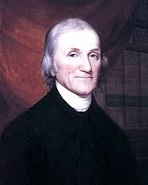










1767 On Apr. 2 after reading the Monita Secreta (the secret instructions of the Jesuits, showing their plans to foment wars in Europe in an effort to reverse the Protestant Reformation and restore the temporal and spiritual sovereignty of the papacy), pissed-off Charles II orders the expulsion of the Jesuits from Spain, Parma, the Two Sicilies, and Spanish Am., and virtually squelches the Spanish Inquisition; many Jesuits end up in Corsica, which is busy trying to throw off Genoese rule and get Frenched, er put under French control. In Apr.-May the Burmese unsuccessfully invade Siam; King Alaungpaya is killed. On May 13 ever-dipsy chancellor of the exchequer Charles "Champagne Charlie" Townshend (1725-67), unphased by the Am. reaction to the Stamp Act, proposes "external taxes" in the House of Commons on glass, paper, lead, paint, dyestuffs, and tea imported to the Am. colonies, and on June 29 Parliament approves the Townshend Acts, incl. the infamous Tea Tax on the American colonies; even though the external vs. internal tax theory of Ben Franklin is conformed to, the colonies still strenuously object, because the hidden purpose is to raise a revenue, and besides, part of the money raised would be used to pay royal governors, freeing them from dependence on colonial legislatures; again mobs attack the royal officials, and a public protest meeting in Boston results in a non-importation agreement; the Sons of Liberty, led by bankrupt brewer and Harvard grad. Samuel Adams (1722-1803) once again dance around the Liberty Tree near Boston Common; meanwhile Townshend dies suddenly on Sept. 4, and just doesn't care? In June the New York Assembly is suspended by Parliament for refusing to quarter troops; New York protests but caves in; Charles Townshend sets up a Board of Customs Commissioners in Boston to stop smuggling, and reorganizes the vice-admiralty courts, placing new ones in Halifax, Boston, Philly, and Charleston; he then becomes remembered for good timing as he dies in Sept.? On Aug. 28-Oct. 2 Benjamin Franklin visits Paris, meets Horace Walpole on Sept. 13, and is presented to Louis XV and Marie Antoinette at Versailles for a grand couvert (public supper) at Versailles - pass the cake? On Sept. 2-3 the Battle of Chengamah kicks off the First Anglo-Mysore War (ends 1769) between the kingdom of Mysore in S India and the British East India Co.; first of four wars that end in 1799. In Sept. a UFO is sighted over River Isla near Cupor Angus, Scotland. On Oct. 1 the Maryland Gazette announces the arrival of the slave ship Lord Ligonier from the River Gambia. On Oct. 18 the Mason-Dixon line is adopted for the border between Penn. and Md. In the fall wealthy Philly farmer-lawyer John Dickinson (1732-1808) pub. a series of twelve Letters from a Farmer in Pennsylvania to the Inhabitants of the British Colonies in the Pennsylvania Chronicle, denouncing the Townshend Acts as "unconstitutional" because Parliament has no right to levy taxes for revenue, whether internal or external. In Oct. Ben Franklin's daughter Sarah Franklin (1743-1808) marries English-born merchant Richard Bache (1737-1811) in Philly, who becomes Franklin's successor as postmaster gen. during the Am. Rev. War in 1776-82. Talk about bad timing? When another tax proposed by the Chancellor of the Exchequer is rejected by the House of Commons, PM Pitt suffers a complete nervous breakdown and retires to the country, leaving the cabinet headless, and plodding Tory Frederick, Lord North (1732-92) is appointed British chancellor of the exchequer to replace Townshend. Chaos in India causes Robert Clive to skedaddle. The East India Co. begins exporting huge quantities of opium from India. Mt. Vesuvius erupts, causing the king of Naples to flee his palace - the original Hell's Kitchen? English navigator Philip Carteret lands on one of the Solomon Islands. After leaving Ft. Michilimackinac near modern-day Mackinaw City, Mich. in the spring, Weymouth, Mass.-born soldier Jonathan Carver (1710-80) explores N Lake Michigan, the Door County peninsula in Wisc., reaches Green Bay, then explores Lake Winnebago to the Grand Portage, then down the Mississippi River to Prarie du Chien, then N to St. Anthony Falls near modern-day Minneapolis, Minn., and into E Iowa; too bad, when he returns he isn't paid, but he makes up for it with his bestselling book pub. in 1778, which first mentions the name "Oregon", and suggests that there might be a mountain range to the W and a continental divide; too bad, the profits are slow to arrive, and he dies broke in London. The first all cast-iron railway (for wagons) is laid this year and next by the Coalbrookdale Iron Co. of Shropshire, causing wooden railways to begin to go out of use. The Manchester Agricultural Society is founded in England. Maria Theresa and HRE Joseph II introduce educational reforms in Austria. Boston atty. Josiah Quincy II (1744-75) writes two articles for the Boston Gazette, signed by "Hyperion", followed by another next Sept., complaining about British oppression. By this time sexuality is so free in the turkey-pluckin' Am. backcountry that 94% of brides are pregnant on their wedding day. The term "vegetable" (from Lat. vegetabilis = "growing, flourishing"), in use since the early 15th cent. to mean any plant is first used as a culinary term for edible plants. David Hume moves to London, becoming undersecy. of state (until 1768), and takes his friend Jean-Jacques Rousseau with him, getting him fixed up with a pension from George III; too bad they have a quarrel. Gotthold Lessing et al. found the Nat. Theater (Hamburg Enterprise) in Hamburg, which debuts his play "Minna von Barnhelm", switches to Shakespeare, and eventually goes bankrupt - Shakespeare doesn't translate well into German? You want to lick my what, Romeo? Scottish portraitist Allan Ramsay (1713-84), son of poet Allan Ramsay (1686-1758) becomes court painter to George III. Georg Philipp Telemann (b. 1681) dies, and Carl (Karl) Philipp Emanuel Bach (1714-88), son of J.S. Bach succeeds him as dir. of church music in Hamburg. Acting prodigy Sarah Kemble (later Siddons) (1755-1831) makes her stage debut as Ariel in Shakespeare's "Tempest". Successful playwright George Colman the Elder (1732-94) buys a quarter share in the Covent Garden Theatre in London, and becomes acting mgr. until 1774. Architecture: Christ Church in Alexandria, Va. is begun (finished Feb. 27, 1773), becoming the church where George Washington and Robert E. Lew later later have their own pews. Georgian-style Tryon Palace in New Bern, N.C. is begun (finished 1770) for N.C. royal gov. William Tryon (1729-88) by architect John Hawks. Inventions: An electrical machine with a glass pane becomes a hit toy. George Noel of England invents a pantaleon, a hammered dulcimer consisting of 276 gut and metal strings on a 11'x5' horizontal soundboard, played with wooden mallets. Self-taught astronomer-mathematician David Rittenhouse (1732-96) of Penn. invents an orrery that displays solar and lunar eclipses over a 5K-year period. Swiss Alpine climber and scientist (founder of alpinism and modern meteorology) Horace-Benedict de Saussure (1740-99) begins studying glass solar heat traps, obtaining temps higher than boiling water and building the first solar oven. Science: Swedish chemist Torbern Olaf Bergman (1735-84) of Uppsala measures and records the first "chemical affinities"; in 1775 he pub. Dissertation on Elective Affinities, containing the largest chemical affinity tables ever pub., first using the A, B, C etc. system for chemical equations. English chemist Joseph Priestley (1733-1804) creates the first artificially carbonated water; in 1771 Torbern Olaf Bergman of Sweden makes it from chalk and sulfuric acid. Nonfiction: Louis Pierre Anquetil (1723-1808), Esprit de la Ligue ou Histoire Politique des Troubles de la Fronde pendant de la XVI et XVIIe Siecles. James Boswell (1740-95), Essence of the Douglas Cause; a Scottish lawsuit. Henri de Boulainvilliers (1658-1722), Analyse du Traite Theologi-Politique de Spinosa (posth.). Richard Farmer (1735-97), Essay on the Learning of Shakespeare. John Harrison (1693-1776), A Description Concerning Such Mechanism as Will Afford a Nice or True Mensuration of Time. Johann Gottfried von Herder (1744-1803), Fragmente uber die Neuere Deutsche Literatur (Fragments on Recent German Literature) (2 vols.) (1767-8); written while an asst. pastor in Riga; advocates emancipating German lit. from all foreign influences by selective translation from languages with greater capacities for sensual expression and creative imagination than the predominantly intellectual language of German, establishing the foundations of comparative philology - diagnosis: French contamination? Samuel Johnson (1696-1772), an English and Hebrew Grammar, Being the Frist Short Rudiments of Those Two Languages, Taught Together, To Which is added, A Synopsis of All the Parts of Learning; 2nd ed. 1771. Gotthold Lessing (1729-81), Hamburgische Dramaturgie (2 vols.) (1767-8); on the craft of the playwright. Nevil Maskelyne (1732-1811), Nautical Almanac; ed. by the British astronomer royal (1765-1811); pub. under govt. sponsorship. Moses Mendelssohn, Phaedon, or The Immortality of Soul. Pierre Samuel du Pont de Nemours (1739-1817), La Physiocracie; coins the term "Physiocracy". Joseph Priestley (1733-1804), The History and Present State of Electricity. Jean-Jacques Rousseau (1712-78), Dictionnaire de Musique. Sir James Steuart (1713-80), An Inquiry into the Principles of Political Economy; the first book in English with the term "political economy" in the title, and the first complete economics treatise; promotes mercantilism. Johann Joachim Winckelmann (1717-68), Monumenti Antichi Inediti (1767-8). Music: Christoph Gluck (1714-87), Alceste (opera) (Burgtheater, Vienna). Art: Pompeo Batoni (1708-87), Lady Mary Fox. Francois Boucher (1703-70), The Chinese Market (1767-9). Joseph Nollekens (1737-1823), Castor and Pollux (statue); copy of the 1st cent. C.E. San Ildefonso group. Padre Ignacio Tirsch, Life in Baja, Calif. (drawings). Plays: George Colman the Elder (1732-94) and David Garrick (1717-79), The Clandestine Marriage (comedy) (Drury Lane, London); based on an engraving by William Hogarth; merchant Sterling wants to marry off his elder daughter to Sir John Melvil, who is in love with her younger sister Fanny, who is in love with clerk Lovewell, whom she you know what, after which she ends up betrothed to Melvil's elderly uncle Lord Ogleby; David Garrick refuses to play Ogleby, pissing-off Colman. Oliver Goldsmith (1730-74), The Good Natur'd Man (comedy); a flop. William Kenrick (1725-79), The Widowed Wife. Frances Sheridan (1724-66), A Trip to Bath (posth.). Christoph Martin Wieland (1733-1813), Comische Erzahlungen. Poetry: Michael Bruce, Elegy Written in Spring. Richard Jago (1715-81), Edge-Hill. Novels: Frances Sheridan (1724-66), The History of Nourjahad; Continuation of the Memoirs (posth.). Laurence Sterne (1713-68), Tristram Shandy, Vols. 3-4 (1759-67). Births: Anglo-Irish Protestant writer Maria Edgeworth (d. 1849) on Jan. 1. French Say's Law liberal economist Jean- Baptiste Say (d. 1832) on Jan. 5 in Lyons. French painter Anne-Louis Girodet de Roussy-Trioson (d. 1824) on Jan. 29. Thai Chakri king #2 (1809-24) Rama II (Buddha Loetla Nabhalai) (d. 1824) on Feb. 24 in Amphoe Amphawa; son of Rama I (1736-1809) and Queen Amarindra; father of Rama III (1787-1851) - bald like Yul Brynner? Dutch "The Dutch Nation" poet Jan Frederik Helmers (d. 1813) on Mar. 7 in Amsterdam. U.S. Dem. pres. #7 (1829-37) and Maj. Gen. ("Old Hickory") (Freemason) (face on the U.S. $20 bill) Andrew Jackson (d. 1845) on Mar. 15 in Waxhaw, S.C.; first U.S. pres. to be born in a log cabin (last is #20 Garfield); some believe he was born on a ship bound for North Am. from Ireland in 1755. French marshal and king of Naples-Sicily (1808-15) Joachim (Gioacchino Napoleone) Murat (d. 1815) on Mar. 25 in La Bastide, Gascony; brother-in-law of Napoleon. French "Napoleon at Malmaison" painter Jean-Baptiste Isabey (d. 1855) on Apr. 11 in Nancy; student of Jacques-Louis David; does all the French royals incl. Napoleon. French marshal Nicolas Charles Oudinot, 1st Comte Oudinot, 1st Duc de Reggio (d. 1847) on Apr. 25 in Bar-le-Duc, Lorraine. English railway pioneer (Quaker) Edward Pease (d. 1858) on May 31 in Darlington. Am. celeb Rachel Donelson Robards Jackson (d. 1828) on June 15 in Halifax County, Va.; wife (1791-) of pres. Andrew Jackson. German humanist-philosopher-linguist-diplomat Friedrich Wilhelm Christian Karl Ferdinand von Humboldt (d. 1835) on June 22 in Potsdam, Brandenburg; brother of Alexander von Humboldt (1769-1859). Russian naval cmdr. Pavel Vasilievich Chichagov (d. 1849) on July 8 (June 27 Old Style) in St. Petersburg; son of Vasily Chicagov (1726-1809). U.S. Dem. pres. #6 (1825-9) (highest IQ?) John Quincy Adams (d. 1848) (c in Quincy pronounced as z) on July 11 at Braintree (now Quincy), Norfolk County, Mass.; son of U.S. pres. John Adams (1735-1826); husband (1797-) of Louisa Catherine Adams (1775-1852); first U.S. pres. to be photographed, to install a toilet in the White House, to get in a train accident, and to pub. poetry; educated in Leiden, Holland while his father serves as U.S. ambassador to Holland, making him a fan of the Pilgrims. U.S. postmaster-gen. #4 (1801-14) Gideon Granger (d. 1822) on July 19 in Suffield, Conn.; educated at Yale U.; father of Francis Granger (1792-1868); uses the aliases Algernon Sidney and Epaminondas. French gen. Jean Joseph Amable Humbert (d. 1823) on Aug. 22 in La Coare, Saint-Nabore (near Remiremont Vosges). German Romantic poet-critic August Wilhelm von Schlegel (d. 1845) on Sept. 8 in Hanover; brother of Friedrich von Schlegel (1772-1829); educated at the U. of Gottingen. French "Montano et Stephanie" composer-conductor-violinist Henri Montan Berton (d. 1844) on Sept. 17; son of Pierre Montan Berton (1727-80); father of Henri Montan Berton (1832-). Am. diplomat-industrialist Victor Marie du Pont de Nemours (d. 1827) on Oct. 1 in Paris, France; eldest son of Pierre Samuel du Pont de Nemours (1739-1817); brother of Eleuthere Irenee du Pont de Nemours (1771-1834); emigrates to the U.S. with his father in 1799; father of Samuel Francis Du Pont (1803-65). Haitian gen. and king (1811-20) (black) Henri I (Henri Christophe) (d. 1820) on Oct. 6 in Grenada; first black king in the W Hemisphere. Swiss biologist-chemist Nicolas Theodore de Saussure (d. 1845) on Oct. 14 in Geneva; son of Horace Benedict de Saussure (1740-99). French banker and PM #10 (1830-1) Jacques Laffitte (d. 1844) on Oct. 24 in Bayonne. Swiss "Adolphe" political theorist Benjamin Constant (Henri-Benjamin Constant de Rebecque) (d. 1830) on Oct. 25 in Lausanne; educated at Oxford U. English prince field marshal ("Father of the Canadian Crown") Edward, Duke of Kent and Srathearn (d. 1820) on Nov. 2 in Buckingham House, London; 4th son of George III and Charlotte of Mecklenburg.; created duke in 1799. Irish rebel leader (co-founder of the United Irishmen) Thomas Paliser Russell (d. 1803) on Nov. 21 in Dromahane, County Cork; Anglican parents. Austrian Tyroleon freedom fighter (Napoleonic Wars) Andreas Hofer (d. 1810) on Nov. 22 in St. Leonhard, Passeier Valley of the Austrian Alps. Portuguese king (1816-26) Joao (John) VI (the Clement) (d. 1826); son of Peter III (1717-86) and Maria I (1734-1816) (who goes nuts in 1792). British wool pioneer (in Australia) John Macarthur (d. 1834) near Plymouth. English candymaker Joseph Storrs Fry (d. 1835); son of Joseph Fry (1728-87). Am. Sac (Sauk) Indian chief Black Hawk (d. 1838). English painter Thomas Barker of Bath (d. 1847). Deaths: French La. gov. Sieur de Bienville (b. 1680) on Mar. 7 in Paris. German composer Georg Philipp Telemann (b. 1681) on June 25. English novelist Robert Paltock (b. 1697) on Mar. 20 in London. German-born French gen. Ludwig August von Dieskau (b. 1701) on Sept. 8 in Surenne. French minister of finance Etienne de Silhouette (b. 1709). English writer-bookseller John Newbery (b. 1713) on Dec. 22 in Canonbury House, Islington, London; the John Newbery Medal is created in 1922 by the Am. Library Assoc. for the "most distinguished contribution to American literature for children". German scientist Johann Gottlob Lehmann (b. 1719) on Jan. 22 in St. Petersburg, Russia. English courtesan Kitty Fisher (b. 1741) in Kent; dies 4 mo. after marrying John Norris, son of Adm. Sir John Norris. British Capt. George Scott (b. ?) on Nov. 6 (killed in a duel).
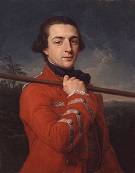






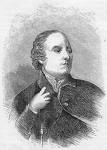







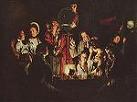





1768 Bread is too expensive in France and England, and there are more bread riots in London. Charles Townshend's reorg. of the customs service causes a great increase in the collections, usually by force, which go from £2K annually in 1760-1768 to £30K annually in 1769-1774 - like putting a red flag in front of a bull? In Jan. French explorer Louis-Antoine, Comte de Bougainville (1729-1811), who began a round-the-world voyage in 1766 begins a voyage to the Pacific (ends 1769), visiting Tahiti and claiming it for France, then visiting Samoa, Espiritu Santo, the N Solomons and New Guinea, Bougainville Island in the Solomons and Bougainville Strait, eventually circumnavigating the Earth; it takes him 52 days to round Cape Horn; he keeps Bougainville's Journal, which feeds the "cult of the noble savage" in Europe. On Feb. 11 Samuel Adams and James Otis Jr. write the Mass. Circular Letter, and get the Mass. assembly to send it to the other colonies, calling for them to unite in opposition to the Townshend Acts, and again complaining about "taxation without representation"; by Apr. Mass., Va., Conn., N.J. and N.H. endorse it; from London Wills Hill, Earl of Hillsborough and 1st Marquess of Downshire (1718-93), newly appointed to the new office of secy. of state for the colonies (1768-72) demands the assembly to rescind the letter; when they refuse, the assembly is dissolved. On Mar. 17 there is an attempted slave rebellion in Montserrat. On May 10 after English radical MP John Wilkdes is imprisoned in King's Bench Prison in St. George's Fields, Southwark, South London for pub. an article in The North Briton criticizing George III, causing a demonstration, the Massacre of St. George's Fields sees 6-7 killed after soldiers fire on demonstrators who don't obey the Riot Act. On May 12 Ferdinand I of the Two Sicilies (1751-1825) (Ferdinand IV of Naples and Ferdinand III of Sicily) marries Marie Caroline (1752-1814) (daughter of HRE Francis I and Maria Theresa, and sister of Marie Antoinette), and after she pussy-whips him and takes over he goes along with her reactionary program, which incl. the spread of Freemasonry. On May 15 by the Treaty of Versailles, France buys Corsica for 2M livres from Genoa (which has been on the skids since 1380), then aids the Genoese in finishing off Corsical patriot Pasquale de Paoli; next Aug. 15 Napoleon (d. 1821) is born, which is why he is French. In May the new Board of Customs Commissioners in Boston seizes John Hancock's sloop Liberty on a technicality, but a mob prevents them from unloading their loot, and they tow it to Castle William in the harbor and call for British troops to protect them - the point of no return? On May 30 English novelist Fanny Burney (1752-1840) begins her Diary of Fanny Burney, and keeps it for 72 years. In May Marton, Yorkshire, England-born Capt. James Cook (1728-79) sails for the South Pacific on a 3-year round-the-world voyage (ends 1771) timed to observe a rare transit (eclipse) of the Sun by Venus next June 3; German naturalist Peter Simon Pallas (1741-1811) travels through Russia to the Chinese frontier to observe the transit. In Aug. Benjamin Franklin tries unsuccessfully to get appointed undersecy. to Lord Hillsborough, which dashes his last hopes of retaining union of the colonies with Britain, and causes him to begin pub. pamphlets against the Townshend Acts - if you can't join 'em? In Sept. the Battle of Kathmandu sees King Jaya Prakash Malla defeated by Gorhka king Prithvi Narayan Shah, ending the Gorkha Kingdom (begun 1559) and founding the Shah Dynasty in Nepal (ends May 28, 2008), with capital in the 2nd cent. C.E. city of Kathmandu ("kastha" + "mandap" = wood + covered shelter) (modern-day pop. 1.4M/2.5M). The gloves come off? In Sept. two regiments of redcoat storm troopers arrive in Boston, and the same day a convention of delegates from Mass. towns declares their "aversion to an unnecessary Standing Army, which they look upon as dangerous to their Civil Liberty"; Parliament responds by appointing a special commission in England to haul Americans suspected of treason before under an old act passed during the reign of Henry VIII. Meanwhile, England is distracted by George III and the "King's Friends"? On Oct. 14 after PM (since July 30, 1766) William Pitt the Elder resigns due to ill health, Whig Augustus Henry FitzRoy, 3rd Duke of Grafton (1735-1811), who had acted as head of the cabinet in the ailing Pitt's absence becomes British PM (until Jan. 28, 1770), becoming the youngest so far (until William Pitt the Younger in 1783); too bad, his weak leadership gives the king personal influence, leading to policies Pitt doesn't like but can no longer do anything about even though his health recovers. On Dec. 10 the Royal Academy of Arts is founded in London by architect William Chambers under the patronage of mad king George III as a rival to the Society of Artists after a dispute with James Paine, with Sir Joshua Reynolds (knighted next year) as pres. #1 (until 1792) and 40 founding members, incl. sculptor Joseph Wilton; its income comes from hosting art exhibitions, not govt. funds. On Dec. 28 after miraculously escaping from the Burmese-encircled island palace in Ayutthaya, seeing Siam divided into six parts (he got the E coast), then uniting to drive the Burmese out and dispose of his rivals, Taksin the Great (Phraya Tak) (1734-82), gov. of the Tak province is crowned king of Siam (Thailand) in the new capital of Thornburi. Austria renounces all claims to Silesia. After the Seven Years' War causes France to withdraw as Europe's #1 military power, the Sixth Russo-Turkish War begins (ends 1774), with Russia a under tsar (1762-96) Catherine II the Great (1729-96) working to take S Ukraine, N Caucasus, and the Crimea from the crumbling Ottoman Empire; a Russian army pushes SW from the Dnieper River into the Balkans, scoring Vs and calling on Christians to join them against the Muslim Ottomans; meanwhile another Russian force captures the Crimea; too bad, the Christians refuse to respond to the call. Frederick II the Great completes his political testament. The British chief royal agents for Indian affairs negotiate the Ft. Stanwix and Hard Labor Treaties, by which the Iroquois cede all lands E and S of the Ohio River; too bad, the Shawnees, Delaware, and Mingos, who claim the region as their hunting grounds don't accept it. Hyder Ali of Mysore attacks Cochin. After the Ottomans send assassins to kill him, Ali Bey Al-Kabir (1728-73) slaughters the other Egyptian beys and proclaims Egypt independent of Turkey, with himself as sultan - where do I get my pharaoh duds? Sheikh Daher el-Omar is granted the title of Sheikh of Acre, Emir of Nazareth, Tiberias, and Safed, and Sheikh of all Galilee, and sides with Egyptian gov. Ali Bey Al-Kabir in his war with the Ottomans, both allying with Russia. John Wilkes returns from France, and is reelected to the House of Commons from Middlesex, but is sent to prison to serve his 1764 sentence; the election is accompanied by mob vilence, and a large popular demonstration is staged in front of Parliament when it opens, causing troops to kill several protesters; Wilkes accuses the cabinet of planning a massacre, which turns them against him, and they expel Wilkes from the House; a new election returns Wilkes again, and he is expelled again; this goes on for two more rounds, and finally the Commons gives Wilkes' opponent his seat; the Parliament is now widely regarded as corrupt and under the mad king's thumb; meanwhile the king secretly awards the governorship of Va. (1768-7) to his impoverished favorite Norborne Berkeley, 4th Baron Botetourt (1718-70), having Lord Hillsborough inform Gen. Amherst he must return to Va. personally to keep it, causing him to resign as col. of the Royal Americans and the 15th Regiment, and decline an annuity proferred in lieu of a peerage, which causes a public uproar in London for "shabby treatment", and Pitt to argue on his behalf in front of the king, resulting in a promise that he will be the first new peer created, and granting him another pension as col. of the 3rd Regiment plus 20K acres in New York State; it takes until 1772 for him to make Amherst Lt. Gen. of the Ordnance, and until 1776 to make him a baron, while he grows fat and plants fruit and nut trees in his gardens in Kent? Austria introduces a new criminal code based on humanist principles. The British East India Co. establishes a trading post and garrison in Sulu in the S Philippines, dominating the region until the mid-19th cent. based on piracy on Spanish shipping and slave trading. Members of the Am. Patriot Party (rebels) begin calling themselves Whigs to identify with the British Radical and Patriot Whigs; the royalists adopt the label of Tories; when the Am. Rev. ends, both terms fall into disuse. Stellar's Sea Cow (discovered in 1741), a relative of the dugong and manatee found near the Asiatic coast of the Bering Sea becomes extinct - which Star Trek episode did I miss? Louis Antoine de Bougainville discovers 127 mi. x 49 mi. Bougainville Island in the W Pacific Ocean, the largest of the Solomon Islands. Hyderabad on the Indus River, 100 mi. NE of Karachi in modern-day Pakistan on the ruins of ancient Nirun is founded by Hyder Ali as the capital of Sind (until 1843) (modern-day pop. 1M). Hard-paste porcelain factories are set-up in Plymouth and Bristol in England, and Sevres in France; everywhere else in these countries only soft-paste (with glass) porcelain is made; by the end of the cent. only hard-paste is made throughout the continent. The Hospitallers found a univ. The "Queen City" of Charlotte, N.C., named after George III's wife is incorporated. Hudson's Bay Co. finally establishes that there is no Northwest Passage to the Orient. Between this year and 1775 George Washington entertains 2K guests at his 8K-acre Mount Vernon, Va. plantation with a Mansion House having a 2-story pillared veranda and a downstairs bedroom. The first steam engine-powered sugar mill opens in Jamaica. The secret Brothers in Unity society is founded at Yale U., becoming rivals with the Linonian Society (founded 1753). After being kicked out of Ferney by Voltaire for criticizing his works, failed starving French playwright Jean-Francois de La Harpe (1739-1803) returns to Paris, and begins writing for Mercure de France (founded 1672), becoming ed. in 1770, criticizing the works of fellow Frenchmen so severely that he becomes universally hated, and humiliated at a 1776 reception at the Academie Francaise, causing him to resign and go back to writing plays. A life filled with green lights and blue skies? David Hume (d. 1776) retires to Edinburgh for the rest of his life; Jean-Jacques Rousseau returns to France under the assumed name of Renou, and marries seamstress Theresa Lavasseur, having five children he puts in orphanages (because he would be a poor father?); he obtains official permission to return in 1770, but is not allowed to publish. Steller's sea cow becomes extinct. Mankind divides into two classes, the natural-born lovers and the natural-born haters of Benjamin Franklin (1706-90), claims Nation mag. Poet Thomas Gray becomes prof. of history and modern languages at Cambridge U., where he joins the English Romantic poets in a love affair with Celtic and Norse mythology. Architecture: Shadwell, Va.-born self-taught architect Thomas Jefferson (1743-1826) begins the Neoclassical Palladian style Monticello (It. "little mountain") in Va. SE of Charlottsville, moving into the South Pavilion next year; it has three stories, 33 rooms, and an octagonal dome roof. Franciscan priest Antonio Margil de Jesus (1657-1726) begins a new church for Mission San Jose (founded Feb. 23, 1720) in San Antonio, Tex. (finished 1782), which becomes the "Queen of the Missions of New Spain". The Birmingham Canal (Birmingham Canal Navigations Main Lne) from Birmingham to Wolverhampton to service the Black Country coal fields is begun, engineered by James Brindley (finished 1772). The Forth-Clyde Canal is begun (finished 1790). Inventions: French chemist Antoine Baume (Baumé) (1728-1804) invents the Baume (Baumé) Scale, a pair of hydrometer scales that measure the density of various liquids in degrees Baume, with distilled water = 0. Benjamin Franklin proposes a New Scheme for English spelling, dropping the letters c, j, q, w, x and y, and adding six new chars. so that every sound has one letter to express it with - drz lats uv reznz? Science: Fredrik Henrik (Fredric Henric) af Chapman (1721-1808) of Sweden founds the mathematical theory of ship design; his work is still hot in 1817 when an English trans. is pub., and 1839, when a French trans. is pub. Swiss mathematician Leonhard Euler (1707-83) proposes that the wavelength of light determines its color. German mathematician Johann Heinrich Lambert (1728-77) proves that pi is incommensurable (has no common divisor). Lazzaro Spallanzani disproves the theory of spontaneous generation using rotting meat in a hermetically-sealed container, which doesn't sprout maggots or flies. Nonfiction: Arthur ? (1747-68), The Life, and Dying Speech of Arthur, a Negro Man. James Boswell (1740-95), An Account of Corsica; a sympathetic study of its fight for independence. Abraham Booth, Reign of Grace. Fredrik Henrik Af Chapman (1721-1808), Architectura Navalis Mercatoria. Col. Frederick (1725-97), Memoires pour servir a l'histoire de la Corse; enlarged ed. pub. in 1795 under the title "A Description of Corsica". Rev. William Gilpin (1724-1804), Essay on Prints; originatse the concept of the picturesque as "that kind of beauty which is agreeable in a picture". Johann Gottfried von Herder (1744-1803), On Thomas Abbot's Writings; "A human soul is an individual in the realm of minds: it senses in accordance with an individual formation, and thinks in accordance with the strength of its mental organs... My long allegory has succeeded if it achieves the representation of the mind of a human being as an individual phenomenon, as a rarity which deserves to occupy our eyes." Pierre Samuel du Pont de Nemours (1739-1817), La Physiocratie, ou Constitution Naturelle du Gouvernement le Plus Avantageux du Genre Humain; coins the term "physiocrat", which is adopted by disciples of Francois Quesnay, causing du Pont to be made ed. of their journal Les Ephemerides du Citoyen; too bad he puts in articles advocating abolition of slavery and govt. restrictions on the economy, causing the govt. to force him to leave France. Joseph Priestley (1733-1804), Essay on the First Principles of Government. William Smellie (1740-95), Colin Macfarquhar (1745-93), and Andrew Bell (1726-1809), Encyclopaedia Britannica, 1st Ed. (3 vols.) (Dec. 6 - 1771) (Edinburgh); composed of 100 "numbers", issued weekly by subscription, unbound; most of the articles are by Smellie; Bell is the printer; Macfarquhar contributes heavily to the 2nd and 3rd eds.; thrills the reading public with its many wise and sage articles; George II orders the three pages of illustrations of female pelvises and fetuses in the midwifery article ripped out of all 3K copies; "I wrote most of it, my lad, and snipped out from books enough material for the printer. With pastepot and scissors I composed it" (Smellie); "With regard to errors in general, whether falling under the denomination of mental, typographical or accidental, we are conscious of being able to point out a greater number than any critic whatever. Men who are acquainted with the innumerable difficulties of attending the execution of a work of such an extensive nature will make proper allowances. To these we appeal, and shall rest satisfied with the judgment they pronounce." (Preface by Smellie) Emanuel Swedenborg (1688-1772), Delititiae Sapientiae. Horace Walpole (1717-97), Historic Doubts on the Life and Reign of King Richard the Third. Music: Giuseppe Gazzaniga (1743-1818), Il Barone di Trocchia (first opera) (Teatri di San Carlo). Andre Gretry (1741-1813), Le Huron (comic opera) (Paris) (aug.); libretto by Jean Francois Marmontel; his first hit; Lucile (comic opera); Le Tableau Parlant comic (opera). Niccolo Jomelli, Fetonte (opera) (Stuttgart). Wolfgang Amadeus Mozart (1756-91), Bastien and Bastienne: La Finta Semplice, K50-51 (opera buffa) (Vienna); his first produced opera; after the court refuses to host it, Franz Anton Mesmer has it debut in his estate's garden in Vienna, causing Mozart to immortalize him in "Cosi Fan Tutte". On July 18 John Dickinson pub. The Liberty Song in the Boston Gazette; the first patriotic Am. song? Art: Francois Boucher (1703-70), Shepherd's Idyll; Washerwomen. French Rococo sculptor Etienne (Étienne) Maurice Falconet (1716-91) begins The Bronze (Copper) Horseman, a monument to Peter the Great in St. Petersburg (finished 1782), named after the 1833 poem by Alexander Pushkin; its pedestal is the 1,250-tonne Thunder Stone, largest stone ever moved by humans (until ?). Paul Revere, Silver Bowl in Honor of 92 House of Representatives Members Who Defied George III (silver bowl). Gilbert Stuart (1755-1828), The Hunter Dogs. Joseph Wright, A Philosopher Shewing an Experiment on an Air Pump; a lark is suffocated in a vacuum while a little girl watches and cries? Plays: Charles Dibdin (1745-1814) and Isaac Bickerstaffe (1733-1812), The Padlock (opera) (Drury Lane Theatre, London) (6 perf.); libretto based on Miguel de Cervantes' "The Jealous Husband"; stars Dibdin in blackface as Mungo, a black servant from the West Indies, who likes to break into song when Massuh isn't around, becoming one of the first blackface roles in English theatre, causing "that degree of sensation in the public which is called a rage"; a hit in the U.S. as late as 1843; "Dear heart, what a terrible life am I led!/ A dog has a better, that's shelter'd and fed;/ Night and day, 'tis de same,/ My pain is dere game." Jean-Francois Ducis (1733-1816), Amelise (tragedy) (debut) (Paris); a flop. Johann Wolfgang von Goethe (1749-1832), Die Mitschuldigen (tragedy). Oliver Goldsmith (1730-74), The Good Natur'd Man. Gotthold Lessing (1729-81), Wie die Alten den Tod Gebildet. Michel-Jean Sedaine, La Gageure Imprevue. Alexander Petrovich Sumarokov, The Usurer (comedy). Horace Walpole (1717-97), The Mysterious Mother. Poetry: Christoph Martin Wieland (1733-1813), Musarion oder die Philosophie der Grazien; Idris. Novels: Claude Prosper Jolyot de Crebillon (1707-77), Lettres de la Duchesse de **au duc de ***. Laurence Sterne (1713-68), A Sentimental Journey Through France and Italy; pub. 1 mo. before his death. Births: Corsican king of Naples-Sicily (1806-8) and Spain (1808-13) Joseph Napoleon Bonaparte (d. 1844) on Jan. 7 in Corte; oldest brother of Napoleon. U.S. Supreme Court justice #19 (1823-43) Smith Thompson (d. 1843) on Jan. 17 in Amenia, N.Y.; educated at Princeton U. Am. Federalist politician Philip Jeremiah Schuyler (d. 1835) on Jan. 21 in Albany, N.Y.; son of Philip Schuyler (1733-1804). Austrian HRE (1792-1806) (last) and Austrian emperor (1806-35) Francis (Franz) II/I (d. 1835) on Feb. 12 in Florence, Italy; eldest son of Grand Duke Leopold of Tuscany; nephew of HRE Joseph II. Shawnee Indian chief Tecumseh (Tecumtha) (Tekamthi) ("Shooting Star") ("Crouching Panther") (d. 1813) on Mar. 9 near Chillicothe, Ohio; son of Pucksinwah and Methoataske. French Fourier Series mathematician-physicist Baron Jean-Baptiste Joseph Fourier (d. 1830) on Mar. 21 in Auxerre, Burgundy; son of a tailor; orphaned at age 9. English "Creevey Papers" Whig politician and diarist (gossip) Thomas Creevey (d. 1838) in Mar.; son of a slaver; educated at Queen's College, Cambridge U. Scottish abolitionist Zachary Macaulay (d. 1838) on May 2 in Inverary. English queen consort (1820-1) Caroline Amelia Elizabeth of Brunswick-Wolfenbuttel (d. 1821) on May 17 in Braunschweig; daughter of Duke Charles William Ferdinand of Brunswick-Wolfenbuttel (Brunswick-Wolfenbüttel) (1735-1806) and Princess Augusta Frederika of Wales (1737-1813) (eldest sister of George III); wife (1795-) of her cuz Prince of Whales George IV (1762-1830). U.S. First Lady #4 (1809-17) Dorothea (Dorothy) Dandridge Payne Todd "Dolley" "Dolly" Madison (d. 1849) on May 20 in New Garden, Guilford County or Payne's Tavern, Person County, N.C.; wife (1794-) of James Madison. French gen. Louis Lazare Hoche (d. 1797) on June 24 in Montreuil (near Versailles). U.S. First Lady #5 (1817-25) Elizabeth Kortright "Eliza" Monroe (d. 1830) on June 30 in New York City; wife (1786-) of pres. James Monroe. Am. surgeon ("Father of American Surgery") Philip Syng Physick (d. 1837) on July 7 in Philadelphia, Penn.; educated at the U. of Penn.; pioneers the use of the stomach pump, and invents the needle forceps and the tonsillectomy guillotine/snare - I love to sing the praises of physick? French assassin Marie-Anne Charlotte de Corday d'Armont (d. 1793) on July 27 in Saint-Saturnin-des-Ligneries, Ecorches (Orne), Normany. Austrian Tyrolese Romantic Nazarene landscape painter Joseph Anton Koch (d. 1839) on July 27 in Elbigenalp; moves to Rome in 1795. Swiss political theorist Karl Ludwig von Haller (d. 1854) on Aug. 1 in Berne. German baritone singer-composer Johann Michael Vogl (d. 1840) on Aug. 10 in Steyr (Ennsdorf). French gen. Louis Charles Antoine Desaix (de Veygoux) (d. 1800) on Aug. 17 in Auvergne. English surgeon-anatomist Sir Astley Paston Cooper, 1st Baronet (d. 1841) on Aug. 23 in Brooke, Norfolk; created baronet in 1820 for removing a cyst from George IV's head. French "Voyage to America" Roman Catholic Romantic writer-statesman ("Founder of French Romanticism") Francois-Rene, Vicomte de Chateaubriand (d. 1848) on Sept. 4 in St. Malo, Brittany; son of slave trader Rene de Chateaubriand (1718-86) and Apolline de Bedee; last of 10 children; brother of Lucille de Chateaubriand; grows up in the family castle in Combourg; husband of Celeste Buisson de la Vigne. French Gen. Louis Emmanuel Rey (d. 1846) on Sept. 22 in Grenoble. Scottish mathematician-astronomer (inventor of the eidograph) William Wallace (d. 1843) on Sept. 23 in Dysart, Fife. English dramatist-composer Charles Dibdin the Younger (Charles Pitt) (Charles Isaac Mungo Dibdin) (d. 1833) on Oct. 27 in Covent Garden, London; illegitimate son of Charles Dibdin (1745-1814); brother of Thomas Dibdin (1771-1841) and Harriet Pitt (1748-1814); godson of David Garrick (1717-79); named after Isaac Bickerstaff and the char. Mungo in the play 1768 "The Padlock". Serbian leader Karadorde (Djordje) "Black George" Petrovic (d. 1817) on Nov. 3 in Visevac. Am. privateer capt. Gamaliel Bradford (d. 1824) on Nov. 4 in Duxbury, Mass. British princess Augusta Sophia (d. 1840) on Nov. 8 in Buckingham House, London; 6th child and 2nd daughter of George III and Charlotte of Mecklenburg; her birth delights her daddy, who wanted a girl to go with the four boys. German "Attila" religious poet-dramatist Friedrich Ludwig Zacharias Werner (d. 1823) on Nov. 18 in Konigsberg; converts to Roman Catholicism in 1811, is ordained a priest in 1814, and becomes a preacher in Vienna. German liberal Protestant theologian-philosopher ("the Father of Modern Liberal Theology") Friedrich Ernst Daniel Schleiermacher (d. 1834) on Nov. 21 in Breslau, Silesia. Am. cabinetmaker and furniture designer Duncan Fife (Phyfe) (d. 1854) near Loch Fannich, Ross and Cromarty; emigrates to Albany, N.Y. in 1783; originator of the federal style of furniture; signature is the flat acanthus leaf in bas relief - any relation to Barney Fife? Deaths: English physicist George Hadley (b. 1685) on June 28. Italian composer Nicola Porpora (b. 1686) on Mar. 3. Scottish mathematician Robert Simpson (b. 1687) on Oct. 1. French astronomer Joseph Nicolas Delisle (b. 1688) on Sept. 12 in Paris (apoplexy). Italian philologist-lexicographer Egidio Forcellini (b. 1688) on Apr. 4 in Padua. Italian artist Antonio Canaletto (b. 1697) on Apr. 19 in Venice. German-born Am. religious leader Johann Konrad Beissel (b. 1691) on July 6 in Ephrata, Penn. German philosopher Hermann Samuel Reimarus (b. 1694) on Mar. 1 in Hamburg; dies after founding Deism, which denies the existence of the supernatural and considers God to be the Great Watchmaker of the Universe, who created it and set it in motion then left it alone; he also leaves the first critical historical analysis of Jesus Christ, arguing that he simply wanted to found a godly state, and died in despair when he failed, with the idea that he died to atone for mankind's sins attributed to St. Paul, making Jesus the teacher of a "remarkable, simple, exalted, and practical religion." Mexican painter Miguel Cabrera (b. 1695) on May 16. Scottish jurist John Erskine of Carnock (b. 1695) on Mar. 1. French mathematician Charles Camus (b. 1699) on May 4. English botanist John Martyn (b. 1699) on Jan. 29 in Chelsea. French printer-engraver Pierre Simon Fournier (b. 1712). Irish-born English "Tristram Shandy" novelist Laurence Sterne (b. 1713) on Mar. 18 in London (TB); his body is stolen from St. George's Fields cemetery in Hanover Square and sold to Cambridge U. for dissection, then recognized by a friend and reinterred; in 1969 somebody calling himself Yorick steals his skull and reinters it near his Coxwold, North Yorkshire residence: "Men tire themselves in pursuit of rest." German art historian Johann Joachim Winckelmann (b. 1717) on June 8 in Trieste, Italy; murdered in a hotel by fellow traveler Francesco Arcangeli for some medals from Maria Theresa, calling him "a man of little account". English academic Lawrence Brockett (b. 1724) on July 12 near Cambridge; dies after a riding accent en route from Hinchingbrooke to Cambridge, becoming the last English person buried by torchlight at night according to Church custom.




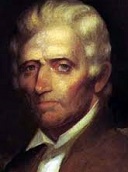





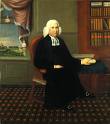
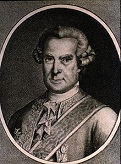
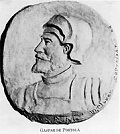







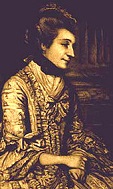
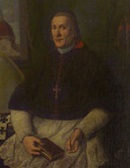
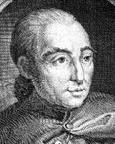
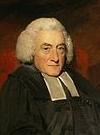



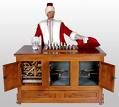

1769 On Jan. 10 after getting concerned about Russian incursions along the Pacific coast from their base in Alaska, Spanish minister Jose de Galvez (José de Gálvez) y Gallardo, Marqués de Sonora(1720-87) sends the dual land-sea Portola (Portolá ) Expedition, led by Gaspar de Portola (Portolà) i Rovira (1716-86) to explore and settle Alta Calif. with a system of presidios (military forts) and Franciscan missions, starting with the San Carlos sailing from La Paz, followed on Feb. 15 by the San Antonio sailing from Cabo San Lucas, while the land epedition leaves Velicata on Mar. 25; on July 16 Franciscan Father Miguel Jose "Junipero" Serra y Ferrer (1713-84) ("Apostle of Calif.") founds the first of 21 Catholic missions in Calif. at Mission San Diego de Alcala (Alcalá), becoming the start of El Camino Real (the Royal Road), which becomes an Indian Roman Catholic conversion factory as well as an agricultural estate; the super climate produces early crops of grapes, oranges and olives; over the next 50 years the Franciscans build 20 more missions spaced a day's journey apart along the coast all the way to San Francisco. The Am. Rev. really starts with fifth column propaganda in England? On Jan. 21 the anon. Letters of Junius begin to be pub. in the Public Advertiser in London (until Jan. 21, 1772), attacking corruption in public men, warning of the dangers of arbitrary power, and praising the virtues of a shorter term for Parliament; they are addressed to Sir William Draper, the Duke of Grafton, the Duke of Bedford et al.; in 1812 John Taylor claims that the real Junius is Sir Philip Francis, and in 1872 Joel Moody claims that he is Thomas Paine; it's really Benjamin Franklin (1706-90), who is also in London at the time?; the printers and publishers are tried for seditious libel, found guilty, then cleared after a 2nd trial, making them more popular, and in 1772 all 69 letters are reprinted by the Public Advertiser of London, owned by Henry Sampson Woodfall (1739-1805); "The liberty of the press is the palladium of all the civil, political, and religious rights of an Englishman"; "The submission of free people to the executive authority of government, is no more than a compliance with laws which they themselves have enacted"; "One precedent creates another. They soon accumulate and constitute law. What yesterday was fact, today is doctrine"; "We owe it to our ancestors to preserve entire those rights, which they have delivered to our care: we owe it to our posterity, not to suffer their dearest inheritance to be destroyed"; "I believe there is yet a spirit of resistance in this country, which will not submit to be oppressed; but I am sure there is a fund of good sense in this country, which cannot be deceived"; "[Americans] equally detest the pageantry of a king, and the supercilious hypocrisy of a bishop"; "There is a holy mistaken zeal in politics as well as in religion. By persuading others, we convince ourselves." In Jan. the Old Colony Club for gentlemen is founded in Plymouth, Mass. to celebrate Forefather's Day (Dec. 22), when the Pilgrims landed on Plymouth Rock; too bad that when the Am. Rev. start, most of the members are loyalists, and disband it. On Feb. 2 Pope (since 1758) Clement XIII (b. 1693) dies, and on May 18 Lorenzo Ganganelli is elected Pope (#249) Clement XIV (1705-74) after a bitter conclave seeking a pope who will agree in advance to the Suppression of the Jesuits; he follows through in 1773. On Jan. 27 Capt. James Cook rounds the Horn, reaches Tahiti on Apr. 13, on June 3 observes the rare Transit of Venus, then on Oct. 7 discovers New Zealand, sailing around North and South Islands, then the E coast of Australia; David Rittenhouse of Penn., one of the first people to construct a telescope in the U.S. observes the transit using a natural spider webbing reticle and records its atmosphere after first fainting from the excitement. Fall into my eyes? On Apr. 22 Marie-Jeanne Becu du Barry (1743-93), a courtesan who became the mistress of Paris gambling house owner Chevalier Jean du Barry in 1764 is presented at court after attracting the eye of Louis XV and becoming his official mistress, and for appearance officially married to Jean's brother Comte Guillaume du Barry; Louis XV lavishes big francs on her, and builds her the Petit Trianon in Versailles. In Apr. the First Anglo-Mysore War (begun 1766) ends with a treaty restoring the pre-war status quo. In Apr. Wild Goose (Irish expatriate) Alejandro O'Reilly (1722-94) is appointed Spanish gov. of La. #2 (until Dec. 1), sailing to Havana with 2K mainly free black troops, arriving in New Orleans in Aug. and quashing the Creole uprising of 1768, establishing Spanish govt. control (dependent on Havana), having six rebels executed in Oct., earning him the name "Bloody O'Reilly"; he goes on to forbid the enslavement of Indians, allow slaves to buy their freedom, and make it easier for masters to manumit slaves before handing over the job on Dec. 1 to his asst. Luis de Unzaga y Amezaga (1721-90) (pr. "oon-THAH-gah") becomes Spanish gov. #3 of La. (until 1777), becoming known for opening trade and helping the Am. Rev. rebels out in 1776 with gunpowder; a Map of West Fla. and La. is pub. by Thomas Jefferys. In May a decision is made by the privy council in London to retain the hated Am. tea duty. In mid-May the V. assembly passes resolves reasserting its exclusive right to tax Virginians, challenging the constitutionality of hauling Americans across the ocean for trial, and calling upon the colonies to unite in their cause; the Virginia gov. then dissolves the assembly, only letting the members meet independently as a convention after the example of Boston; most other colonial assemblies follow suit. On June 5 Abbe Jean Chappe d'Auteroche (1722-69) observes the transit of Venus in Siberia. Daniel Boone was a man, yes a bi-i-i-ig man? On June 7 Berks County, Penn.-born frontiersman-explorer Daniel Boone (1734-1820), who has explored the area since 1767 with six companions, incl. French-Indian War buddy John Finley (Findley) (1759-1846) settles the "Dark and Bloody Ground" (called that by Cherokee chief Dragging Canoe, referring to the endless battles between his tribe and the Creeks, Shawnee, Wyandot, and Chickasaw along the Cumberland River) of Kentucky (Iroquois "Ken-tah-ten" = land of tomorrow) (central plain?), founding the town of Boonesboro in E Ky.; after being captured with his entire party by Indians in Dec., then escaping and joining up with his brother, then building the first cabin, living there during the winter; he later feels compelled to move to a new territory every time someone moves within a mile of him? On June 28 The Morning Chronicle begins pub. in London (until 1862). On Aug. 9 lt. gov. (since 1758) Thomas Hutchinson (1711-80) becomes acting gov. of the Province of Mass. Bay (until Mar. 14, 1771, then gov. until May 17, 1774). On Sept. 6-8 famed Shakespearean actor David Garrick (1717-79) organizes the first Shakespeare Jubilee in Stratford-upon-Avon, which thousands brave rainy weather to see, causing him to build the Shakespeare Pavilion (cap. 1K); too bad, none of Shakespeare's plays are performed. On Dec. 13 Congregationalist minister Elazar Wheelock (1711-79) obtains a charter from George III for Dartmouth College in Hanover, N.H. as an outgrowth of a school for Indians founded in 1754, becoming the northernmost Ivy League college, and later producing alumnus Daniel Webster. On Nov. 6 English explorer Samuel Hearne (1745-92) begins his first voyage to the Arctic Ocean with a band of Cree and Chipewyan Indians, leaving the Seal River N of Churchill then returning on Dec. 11 after running out of food. On Dec. 15 bowing to the pressures of the Quartering Act, the New York Assembly votes to provide £2K to provide food and shelter to British troops stationed there; on Dec. 16 Alexander McDougall (1731-86) pub. the pamphlet To the Betrayed Inhabitants of the City and Colony of New York under the alias "A Son of Liberty". Peter von Biron (1724-1800) becomes the last duke of the Grand Duchy of Courland (until 1795), which lies on the Baltic Sea and is coveted by Russia. A Russian fleet led by Count Alexey Orlov lands in the Morea (Peloponnesus) and leads an unsuccessful Greek revolt. The Genoese, aided by France defeat Pasquale de Paoli, causing him to flee to England, where he is welcomed and granted a pension. The anti-Semitic town council of Frankfurt am Main rebuffs a petition by the Jews to be allowed to leave their ghetto on Sun. afternoons, with the soundbyte "An example of the unbounded arrogance of this people, who expend every effort to take all opportunities to set themselves up as equals to the Christian citizens". Sheikh Daher el-Omar blocks an Ottoman force heading to Egypt, while Ali Bey Al-Kabir sends 30K troops, conquering the Sanjak of Jerusalem and the Valayets of Tyre and Damascus. The Gurkhas (Sans. "cowherds") of Rajputana conquer the closed-off country of Nepal ("a yam between two borders") on the S slope of the Himalayas between India, Tibet, and China from the other pretty princes, and King Prithvi Narayan Shah (1723-75) founds the Shah Dynasty, which ends up by 1846 with the hereditary PMs of the Ranas Family keeping the kings virtual prisoners (until 1951). New Siamese king Takin launches a war to regain control of Cambodia, causing the Nguyen army to retreat, spurring the three Tay Son Brothers, led by Nguyen Hue to start a Robin Hood revolt in Vietnam against mean corrupt oppressive Nguyen lord Nguyen Phuc Thuan, beginning the Tay Son Rebellion (ends 1789). The Va. Assembly is dissolved after protesting against colonial treason trials held in Westminster. Elections for Parliament finally produce a majority for the King's Friends. English antiquary-poet Thomas Percy (1729-1811) becomes chaplain to George III, follwed by bishop of Dromore in 1782. Conn.-born Capt. (later Col.) John Butler (1728-94) uses his influence among pro-British Indians to defend Niagara, and is promoted to lead Russian troops occupy Moldavia and enter Bucharest. Austria occupies the Lwow and Zips region of Poland; Frederick II the Great and HRE Joseph II meet in Neisse, Silesia to discuss the partition of Poland. Settlers from SW Va. and N.C. ignore the Proclamation Line and squat on the Watauga River; more settlers squat in modern-day Tennessee (Tenn.) in defiance of George III. Chief Pontiac of the Ottawa (b. 1720) is murdered at Cahokia, Ill. Mass. assembly leader James Otis Jr. is assaulted by a customs collector pissed-off at his agitation, and the injuries are so severe that he is forced to withdraw from public life, going insane at intervals. Louis de Bougainville completes his circumnavigation of the Earth (begun 1766). The British East India Co. begins muscling into NE Borneo. The S.C. assembly sets up six circuit courts to deal with horse thieves, cattle rustlers and Indians, and revises the fees, but refuses to respond to back country demands for representation; it also votes £1.5K for the radical Bill of Rights Society in England to pay the debts of govt. martyr John Wilkes, causing the king's ministers to step in and order the royal gov. and council to put the screws on the assembly; by 1771 it is virtually shut down. Newtown Pery, S of Irish Town in Limerick, Ireland is founded, becoming the best section of the city. Wheeling (Lenape "place of the head") in modern-day W. Va. is founded by Ebenezer Zane (1747-1811), going on to found Fort Henry in 1774 and Zane's Trace in 1796-7; in modern times it becomes known as Nail City. The word "patronage" is coined. German philosopher Johann Gottfried von Herder (1744-1803) coins the term "Zeitgeist" (Spirit of the Age), spending his career struggling with the concept of Volksgeist (Spirit of the People) (coined by Hegel in 1801), the natural self-clumping of people into self-sufficient er, herds, with the soundbyte: “There is only one class in the state, the Volk (not the rabble), and the king belongs to this class as well as the peasant", walking the fence of racism while holding onto the Biblical Garden of Eden story and its implication that there are no such things as races like so-called anthropologist Johann Blumenbach was pushing, with the soundbyte: "Denn jedes Volk ist Volk", saying that all people have the same internal anatomy, with the soundbyte: "Neither the Pongo [chimpanzee] nor the Longimanus [gibbon] is your brother, but truly the American [Indian] and the Negro are"; too bad, he steps on his dick with the statement that a few hundred years earlier the inhabitants of Germany were Patagonians from South Am., and slides back into racism with the soundbyte: "Had Greece been people with Chinese, our Greece would never have existed", and worse: "Chinese they were, and will remain: a people endowed by nature with small eyes, a short nose, a flat forehead, little beard, large ears, and a protuberant belly... Nature seems to have refused them as well as many other nations in this corner of the world, great invention in Science, while on the other hand he has beautifully conferred on their little eyes a spirit of application, adroit diligence and nicety, a talent of imitating with art whatever their cupidity deems useful. Eternally moving, eternally occupied, they are forever going and coming, in quest of gain, or in fulfillment of their offices"; Herder calls Volksgeist "singular, marvelous, inexplicable, ineffible", likening it to a plant that grows, blooms, and withers, requiring its history to be studied, but snubbing ancient and modern history for the Middle Ages, expanding its scope to incl. language, culture, customs, religion, lit., law, and folklore; too bad, Volkgeist becomes a concept that everybody believes in although nobody can quite define it, opening the door wide to all-out racism? The Liberty Rifle Works at Springfield is chartered by the Mass. legislature. Royal Academy pres. Joshua Reynolds is knighted. Johann Friedrich Oberlin (1740-1826) opens the first creche (for foundlings) at Steintal in Alsace. Czech-born Frantisek Xaver Richter (1709-89) becomes musical dir. of Strasbourg Cathedral (until 1789). Jean-Francois Ducis (1733-1816), whose own first tragedy "Amelis" was a flop last year produces Shakespeare's "Hamlet" in Paris, relying on a fractured French trans., and achieving a success, causing him to crank out "Romeo and Juliet" (1772), "Macbeth" (1783), and "Othello" (1792), all with fractured French; but France is a family company, so vive la France? Hannah Ball (1734-92) establishes the first Sunday school in England as a nondenominational outreach of Methodism and an effort to educate the lower classes. Johann Wolfgang von Goethe's health breaks down in Leipzig, causing him to return to Frankfurt am Main (until 1770), where his mother's Pietist friend Suzanne Katharina von Klettenberg teaches him religious mysticism. Swiss Lutheran pastor Johann Kaspar Lavater gets his 15 min. of fame by trying to convert famous Jew Moses Mendelssohn to Christianity, which only gets him criticized by Johann Gottfried Herder et al. Wolfgang Amadeus Mozart is appointed concertmeister to the archbishop of Salzburg, and Pope Clement XIV makes him a chevalier of the Order of the Golden Spur in La Scala, Italy. Mark Anthony DeWolf of R.I. founds America's biggest slave-trading dynasty (until 1820). The first Canadian distillery is established in Quebec City to produce rum. Sports: On May 3 English thoroughbred horse Eclipse (1764-89) starts racing at age five in Epsom, retiring undefeated and launching the saying "Eclipse first and the rest nowhere"; he goes on to sure 344 winers and dominate the modern gene pool. Architecture: Old Blackfriars Bridge in London is built (destroyed 1860). The Adam brothers design the Adelphi in London. Inventions: In Sept. the first piano is built in the U.S.; it has a 3-4 octave range. The first lightning rods appear on bldgs. in the U.S. After modifying an unsuccessful machine patented by Lewis Paul in 1738, English textile capitalist Richard Arkwright (1732-92) of Bolton invents the Water Frame hydraulic spinning machine to speed up the process of spinning cotton rope (roving) into fine twisted cotton threads using revolving rollers. French artillery officer Nicolas-Joseph Cugnot (1725-1804) builds a small 2-cylinder 3-wheeled steam carriage ("fardier a vapeur") (the first automobile?) in Paris, which can carry four people at 2 mph but lacks sufficient power and is unstable; next year he builds a larger version as a gun carriage for the French War Ministry, but it overturns as he tries to turn a corner on a Paris street, and knocks down part of the stone arsenal wall (first automobile accident), and he is sent to jail as a dangerous driver and his machine is impounded, ending up in the Conservatoire Nat. des Arts et Metiers in 1800 - if it worked we might have 100 Cugnotpower automobile engines? Is it a big head thing? German engineer Baron Wolfgang Ritter von Kempelen (1734-1804) builds The Turk, a chess-playing automaton in Vienna, which sits behind a 4'x2'x3' box with machinery and never loses; HRE Joseph II of Austria falls for it, and sends it on a tour of Europe, defeating Empress Catherine II of Russia and Napoleon; when Kempelen dies, it is revealed that a man hides inside; it is destroyed in a 1854 fire in the Chinese Museum in Philly. Science: Benjamin Franklin charts the Gulf Stream using info. from whaler captains and bottles dropped into the water with notes asking finders to return them to the postmaster gen. of the Am. colonies. Nonfiction: Charles Bonnet (1720-93), Palingenesie Philosophique. Edmund Burke (1729-97), Observations on a Pamphlet on the Present State of the Union - sorry you missed it? Charles Burney (1726-1814), An Essay Towards a History of Comets. Denis Diderot (1713-84), D'Alembert's Dream. Egidio Forcellini (1688-1768), Totius Latinitatis Lexicon (posth.). Johann Gottfried von Herder, Kritische Walder. James Granger, Biographical History of England; incl. blank pages for illustrations to be inserted, causing the word "grangerize" to be coined. Johann Gottfried von Herder (1744-1803), Critical Forests; or Reflections on the Science and Art of the Beautiful. Pierre Contant d'Ivry (1698-1777), Ouvres d'Architecture. Gotthold Lessing (1729-81), Antiquarische Briefe. Elizabeth Marsh (1735-85), The Female Captive: A Narrative of Facts Which Happened in Barbary in the Year 1756 (London); how she was captured by Moroccan corsairs off North Africa, pretends to be married to fellow prisoner James Crisp, and marries him after release, then travels with him to India. Antonio Martini (1720-1809), Italian trans. of the Vulgate Bible (1769-81); the first officially authorized by the Roman Catholic Church, and for the next 150 years the only version approved for Italian Catholics; in 1781 Pope Pius VI appoints him archbishop of Florence - how many years before there is an Italian democratic revolution? Elizabeth Montagu (1718-1800), An Essay on the Writings and Genius of Shakespear; pub. anon until 1777; extols Shakespeare to the skies as the greatest poet of all time while dissing Voltaire; "I was incited to this undertaking by great admiration of his genius, and still greater indignation at the treatment he has eceived from a French wit." Nicolas-Edme Restif (1734-1805), Le Pornographe (1769); a plan for regulating prostitution which iis actually carried out by HRE Joseph II and other Euro nations. William Robertson (1721-93), History of the Reign of the Emperor Charles V (4 vols.). Thomas Sheridan, A Plan of Education. Augustus Toplady (1740-78), The Church of England Vindicated from the Charge of Arminianism; written after Oxford U. expels six students from St. Edmund Hall because of their Calvinist views, arguing that Calvinism is the true position of the Anglican Church. Anne-Robert-Jacques Turgot (1727-81), Reflexions sur la Formation et la Distribution des Richesses (1769-70); backs Francois Quesnay's Physiocrat theory of land as the only source of wealth, dividing society into the agricultural (productive) classes, salaried (sterile) classes (artisans and merchants), and landowning (proprietary) classes, claiming that only the net product of the land should be taxed, and dissing all govt. regulation of commerce and industry. Music: Thomas Arne (1710-78) and David Garrick (1717-79), Soft Flowing Avon; composed for Garrick's Shakespeare Jubilee in Stratford-upon-Avon. 13-y.-o. Wolfgang Amadeus Mozart writes down Allegri's famous 1630s Miserere after hearing it sung twice during Holy Week in Rome's Sistine Chapel, breaking a 300-year taboo; it is soon pub. in England, and nobody is excommunicated. Art: Pompeo Batoni (1708-87), HRE Joseph II and HRE Leopold II; wins him an Austrian nobility. Francois Boucher (1703-70), Boreas Abducting Oreithyia; Venus at Vulcan's Forge; Juno Asking Aeolus to Release the Winds; Mercury Confiding Infant Bacchus to the Nymphs of Nysa; Aurora and Cephalus; Venus on the Waves; Jupiter and Callisto. Jean-Honore Fragonard, The Study; Fantasy Heads; portraits of his friends. Plays: Richard Cumberland (1732-1811), The Brothers (comedy). David Garrick (1717-79), The Jubilee (Drury Lane Theatre, London) (Oct. 14) (90 perf.); rained-out of the Shakespeare Jubilee in Stratford-upon-Avon, its success allows him to recoup his losses. Charlotte Lennox, The Sisters (comedy); panned by critics. Novels: Nicolas-Edme Restif (1734-1805), Le Pied de Fanchette (first novel). Tobias Smollett (1721-71), The History and Adventures of an Atom; his views on English politics durng the Seven Years' War disguised as a tale about ancient Japan. Births: French field marshal (Freemason) ("Le Rougeaud") ("The Red-Faced or Ruddy") ("le Brave des Braves") ("The Bravest of the Brave") Michel Ney, Duc d'Elchingen, Prince de La Moskova (d. 1815) on Jan. 10 in Saarlouis. Russian field marshal prince Peter Christianovich Wittgenstein (d. 1843) on Jan. 17 (Jan. 6 Old Style) in Pereslavl-Zlessky; born Count Ludwig Adolf Peter of Sayn-Wittgenstein-Ludwigsburg from a line tracing back to Berleburg in North Rhine-Westphalia. Am. real estate tycoon (Roman Catholic) (co-founder of the Detroit Free Press) Joseph Campau (d. 1863) on Feb. 1 in Detroit, Mich. German novelist and music critic Johann Friedrich Rochlitz (d. 1842) on Feb. 12 in Leipzig; discovers Louis Spohr and teaches Goethe to like Bach? Russian fabulist poet ("the Russian La Fontaine") Ivan Andreyevich Krylov (d. 1844) on Feb. 13 in Moscow. Am. N.Y. gov. #6 (1817-22) ("Father of the Erie Canal") (Freemason) DeWitt Clinton (d. 1828) on Mar. 2 in Little Britain, N.Y.; nephew of N.Y. gov. George Clinton (1739-1812); educated at Columbia U. (formerly King's College) (first to graduate under the new name). Egyptian ruler (1805-48) ("Founder of Modern Egypt") Mehmet (Mohammed) (Muhammad) Ali Pasha (d. 1849) on Mar. 4 in Kavala, Macedonia; father of Ibrahim Pasha (1789-1848) (adopted), Tusun Pasha (1794-1816), Ismai'l, and Sai'd (1882-63). English geologist ("the Father of English Geology") (inventor of the geological map) William Smith (d. 1839) on Mar. 23 in Churchill, Oxfordshire. French marshal (1804-) and PM (1832-4, 1839-40, 1840-7) ("the Hand of Iron") Nicolas Jean de Dieu Soult, Duke of Dalmatia (d. 1851) on Mar. 29 in Saint-Arnans-la-Bastide (Saint-Amans-Soult) (near Castries). Danish-Prussian statesman-diplomat Count Christian Gunther von Bernstorff (d. 1835) on Apr. 3 in Copenhagen, Denmark. French marshal Jean Lannes, 1st Duc de Montbello, 1st Prince de Siewierz (d. 1809) on Apr. 10 in Lectoure, Gers. English "Pinkie" portraitist Sir Thomas Lawrence (d. 1830) on Apr. 13 in Bristol; knighted in 1815. English Thames Tunnel engineer Sir Marc Isambard Brunel (d. 1849) on Apr. 25 in Hacqueville, Normandy, France; father of Isambard Kingdom Brunel (1806-59); emigrates to the U.S. in 1793, and to England in 1795; knighted in 1841. British "bad boys bad boys whatcha gonna do" superstar statesman and PM (1828-30, 1834) (Freemason?) ("the Iron Duke") Field Marshal Arthur Wellesley (Wesley), 1st Duke of Wellington (d. 1852) on May 1 in Dublin, Ireland; brother of Richard Wellesley, 1st marquis Wellesley (1760-1842); created duke of Wellington in 1814 before Waterloo; always a step ahead of the Corsican? Am. Unitarian minister William Emerson (d. 1811) on May 6 in Concord, Mass.; eldest son of William Emerson (-1775); father of Ralph Waldo Emerson (1803-82). Austrian Tuscan grand duke Ferdinand III (d. 1824) on May 6 in Florence; son of HRE Leopold II (1747-92). German (Hanoverian) field marshal Count Johann Friedrich von der Decken (d. 1840) on May 25. German-Polish composer (Freemason) Joseph (Jozef) Antoni Franciszek Elsner (d. 1854) on June 1 in Grottkau (near Breslau), Upper Silesia, Prussia; Frederic Chopin's first teacher; not to be confused with German architect Joseph Elsner (1845-1933). British statesman (Presbyterian) Robert Stewart, Viscount Castlereagh, 2nd Marquis of Londonderry (d. 1822) on June 18 in Dublin, Ireland; educated at St. John's College, Cambridge U. French diplomat (private secy. to Napoleon) Louis Antoine Fauvelet de Bourrienne (d. 1834) on July 19 in Sens. British "no second chance" corrections officer Gen. Sir Hudson Lowe (d. 1844) on July 28 in Galway, Ireland; Napoleon's jailer at St. Helena. French 5'6" neurodermatitis-suffering emperor (1804-14) (Freemason) ("the Corsican") ("the Man of Destiny") Napoleon (Napoleone) (Neapolio) (from the Greek word "neapolluon", meaning destroyer or terminator) Bonaparte (Buonaparte) I (d. 1821) on Aug. 15 [Leo] in Ajaccio, Corsica; youngest son of Carlo Maria Buonaparte (1746-85) and Letitzia Buonaparte; educated in military schools in Brienne-le-Chateau and Paris. French naturalist (biologist-geologist) (Lutheran) ("Founder of Comparative Anatomy and Vertebrate Paleontology") Baron Georges (Jean Leopold Nicolas Frederic) ( Léopold Nicolas Frédéric) Cuvier (d. 1832) on Aug. 23 in Montebeliard, Doubs; elder brother of Frederic Cuvier (1773-1838); created baron in 1819. French Roman Catholic Potowatomi missionary Rose Philippine Duchesne (d. 1852) on Aug. 29 in Grenoble. Italian composer Bonifacio Asioli (d. 1832) on Aug. 30 in Correggio - he gives good what? Am. physician David Hosack (d. 1835) on Aug. 31 in New York City; educated at Columbia U., U. of Penn., Princeton U., and U. of Edinburgh. German (Prussian) naturalist-explorer-geographer-astronomer-writer and Romantic Friedrich Wilhelm Heinrich Alexander von Humboldt (d. 1859) on Sept. 14 in Berlin; brother of Wilhelm von Humboldt (1767-1835). English natural history artist George Raper (d. 1797) on Sept. 19. English boxing champ (1795-) "Gentleman" John Jackson (d. 1845) on Sept. 28. British Maj. Gen. ("Hero of Upper Canada") Sir Isaac Brock (d. 1812) on Oct. 6 in St. Peter Port, Guernsey. Am. dentistry school founder Horace Henry Hayden (d. 1844) on Oct. 13 in Windsor, Conn.; student of John Greenwood (1760-1819). Am. Dem.-Repub. Va. gov. #22 (1822-25) and U.S. Senator (1819-22) James Pleasants Jr. (d. 1836) on Oct. 24 in Cold Comfort, Va.; son of Ann Randolph, granddaughter of William Randolph; father of John Hampden Pleasants (1797-1846); educated at the College of William and Mary. Am. frontiersman Daniel Morgan Boone (d. 1839) on Dec. 23 in S.C.; son of Daniel Boone (1734-1820). British Gen. William Henry Clinton (d. 1846) on Dec. 23; son of Gen. Sir Henry Clinton (1738-95);brother of Gen. Sir Henry Clinton (1771-1829); grandson of Adm. George Clinton (1686-1761). German "Was ist des Deutschen Vaterland?" nationalist historian-writer-poet (abolitionist) Ernst Moritz Arndt (d. 1860) in Dec. 26 in Rugen, Switzerland; prof. of history at the U. of Greifswald and U. of Bonn.; co-founder of German nationalism. Russian architect Vasily Petrovich Stasov (d. 1848); father of critic Vladimor Stasov (1824-1906) and atty. Dmitri Stasov (1828-1918). Deaths: English card game king Edmond Hoyle (b. 1672) on Aug. 29 in London - just one more hand? Italian philologist-lexicographer Jacopo Facciolati (b. 1682). German jurist Georg Heinrich Zincke (b. 1692) on Aug. 15 in Braunschweig. German poet Christian Gellert (b. 1715) on Dec. 13 in Leipzig. Ottawa Chief Pontiac (b. 1720) in Cahokia, Ill. (murdered). Welsh poet Gronwy Owen (b. 1723). English cartographer-engraver John Spilsbury (b. 1739) on Apr. 3.